
- Introduction: Sri Lanka Beyond The Airport
- Review: Japan Airlines Business Class 787 Dallas To Tokyo
- Review: ANA Crowne Plaza Narita Airport
- Review: American Admirals Club Tokyo Narita Airport
- Review: Qantas Lounge Tokyo Narita Airport
- Review: SriLankan Airlines Business Class A330 Tokyo To Colombo
- Review: Amangalla, Galle, Sri Lanka
- Review: Amanwella, Tangalle, Sri Lanka
- Review: SriLankan Airlines Business Class A321neo Colombo To Abu Dhabi
- Review: EDITION Abu Dhabi
- Review: KLM Business Class A330 Abu Dhabi To Amsterdam
- Review: KLM Crown Lounge Amsterdam Airport
- Review: KLM Business Class 787 Amsterdam To New York
We had spent the night prior to our flight at the Grand Hyatt DFW, which is connected to the terminal. So we ended up only arriving at the airport shortly before boarding started. For what it’s worth, Japan Airlines passengers have access to the American Airlines lounges, though the Amex Centurion Lounge is also conveniently located near Japan Airlines’ gate.
Our flight was departing from gate D15, and boarding was scheduled to start at 11:10AM, 30 minutes before departure.
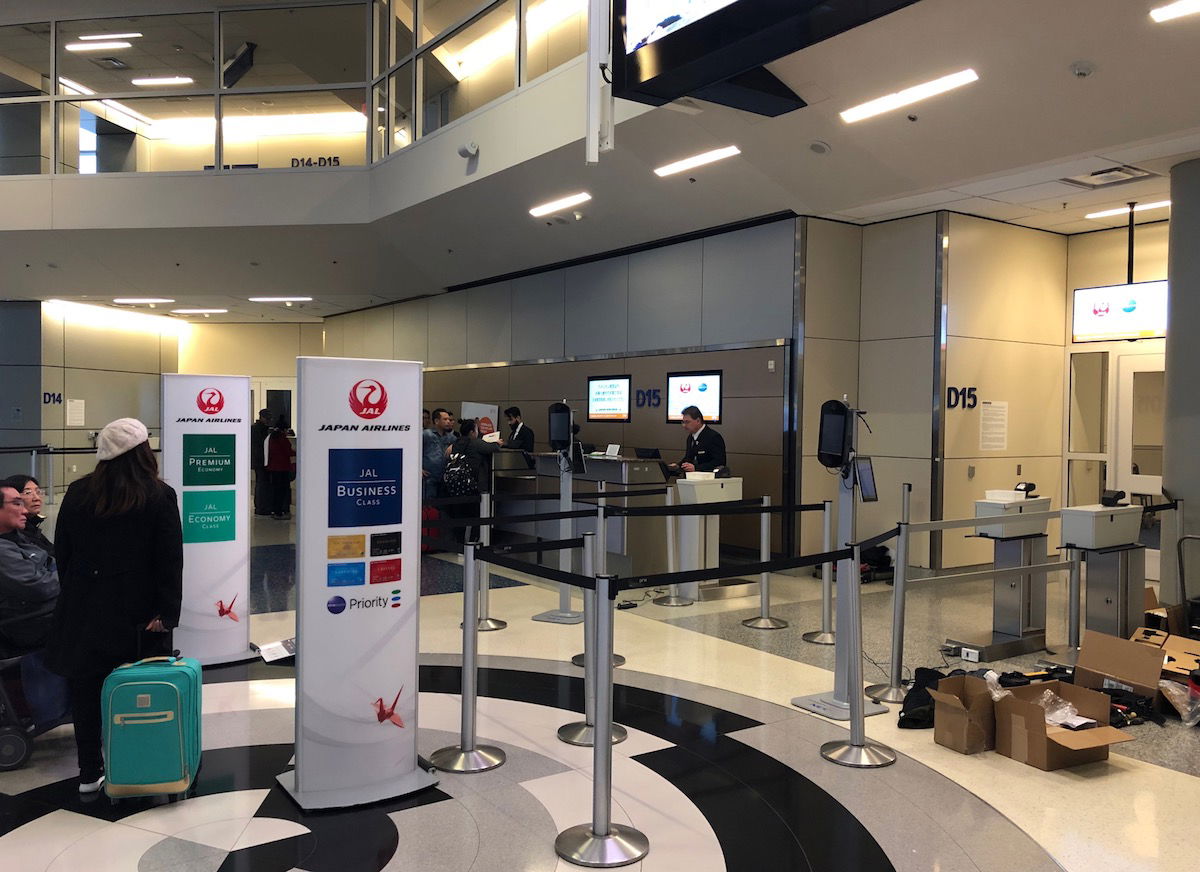 Japan Airlines departure gate DFW
Japan Airlines departure gate DFW
Interestingly gate D15 was set up for biometric boarding. Boarding did in fact start at 11:10AM, and you boarded by standing in front of a screen, and once the screen lit up, you just presented your boarding pass to a gate agent — there was no need to present your passport. I can’t decide whether I find advancements like this awesome, or just plain creepy.
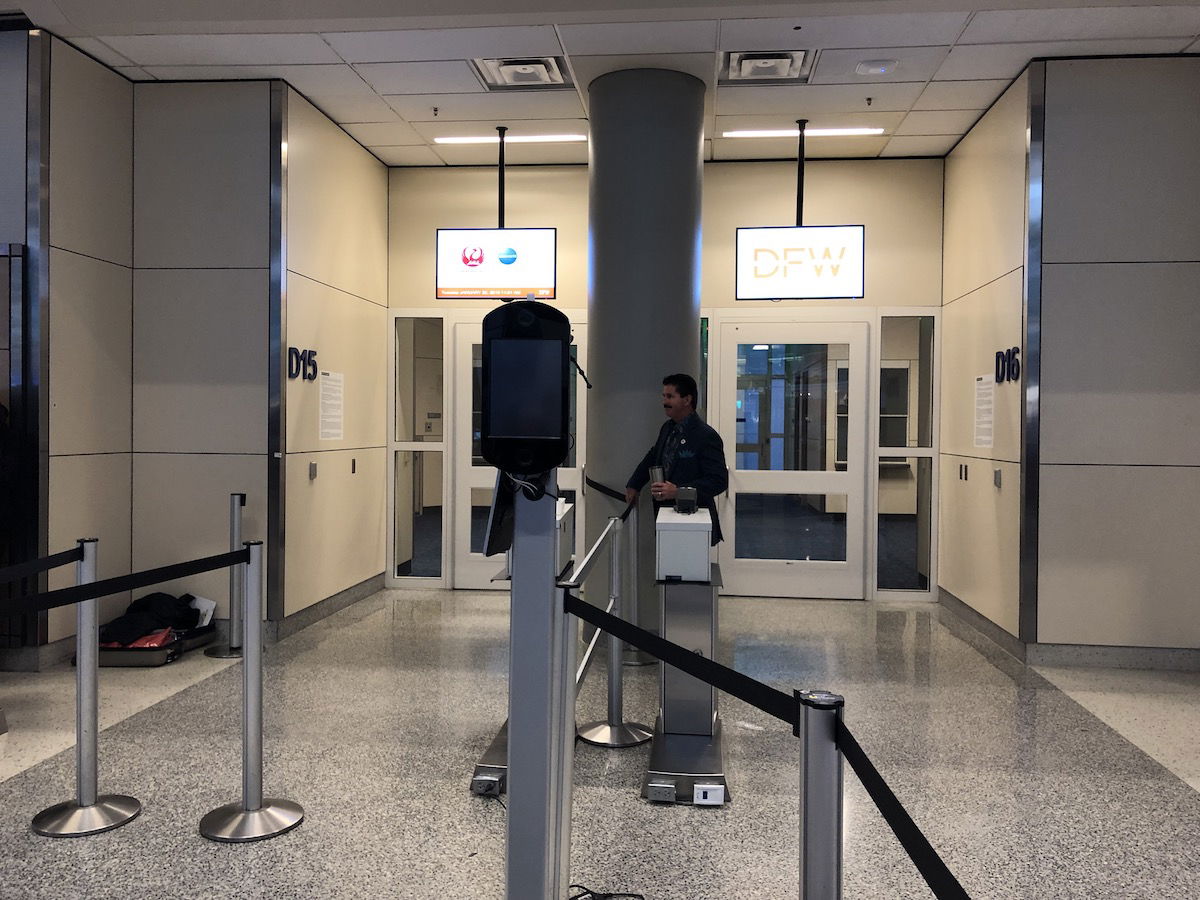
Japan Airlines departure gate DFW
Even though this plane didn’t have first class, pre-boarding was offered to oneworld Emerald members.
Japan Airlines 11
Dallas (DFW) – Tokyo (NRT)
Tuesday, January 22
Depart: 11:40AM
Arrive: 4:25PM (+1 day)
Duration: 13hr45min
Aircraft: Boeing 787-9
Seat: 8A (Business Class)
I boarded through the second door on the left, where I was pointed right to my seat. Japan Airlines’ 787-9 business class cabin consists of a total of 44 Apex Suites. Apex Suites are among my favorite business class seats out there.
The forward business class cabin had a total of 24 seats, spread across four rows in a 2-2-2 configuration.
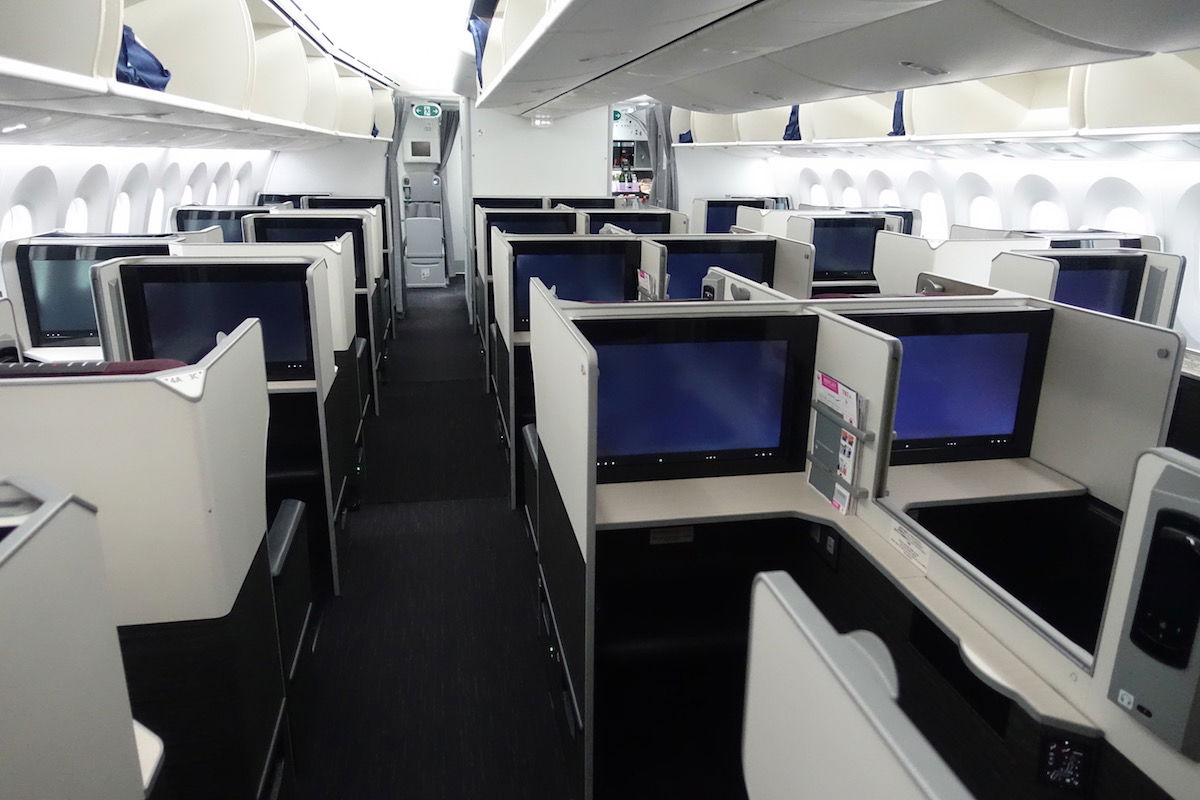 Japan Airlines 787-9 business class cabin
Japan Airlines 787-9 business class cabin
For what it’s worth, Apex Suites take up quite a bit of space — some airlines squeeze 30 seats between the first two sets of doors on the 787-9, while there were just 24 here.
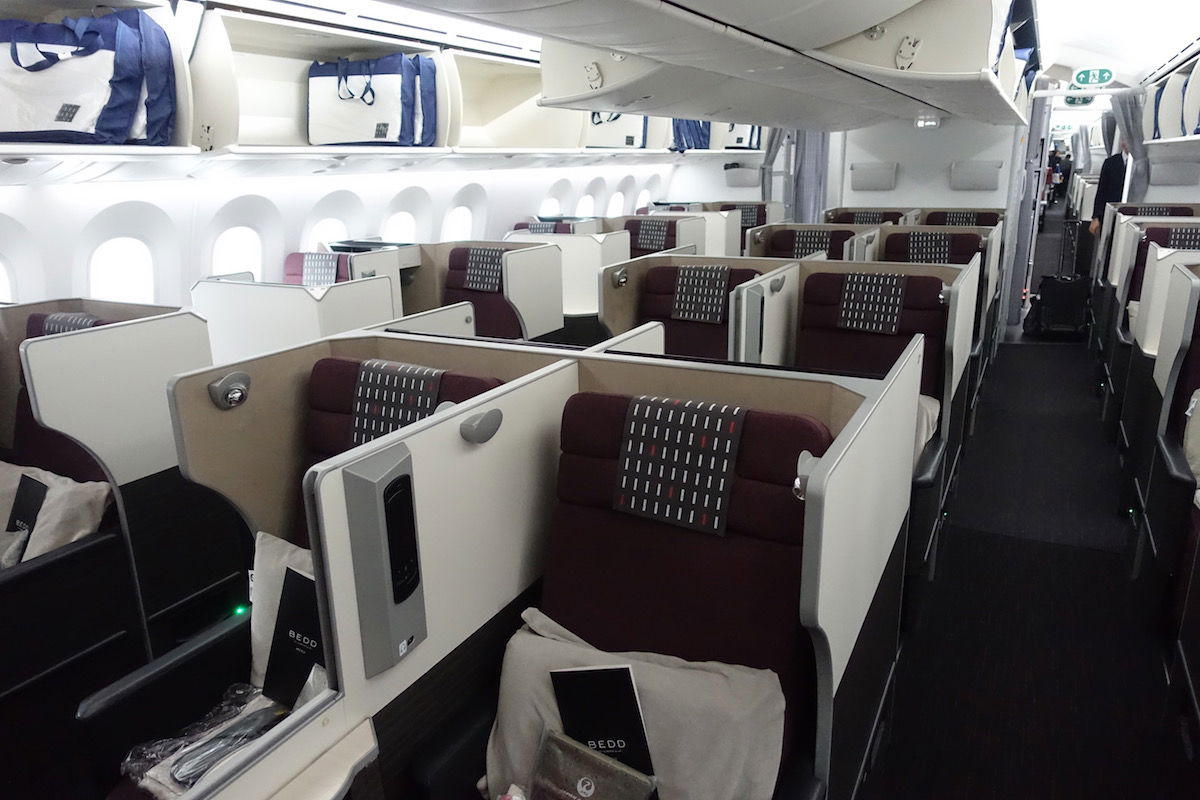
Japan Airlines business class cabin 787-9
Then there was the rear business class cabin, consisting of a total of 20 seats, including three full rows, and one row with just a pair of seats in the center.
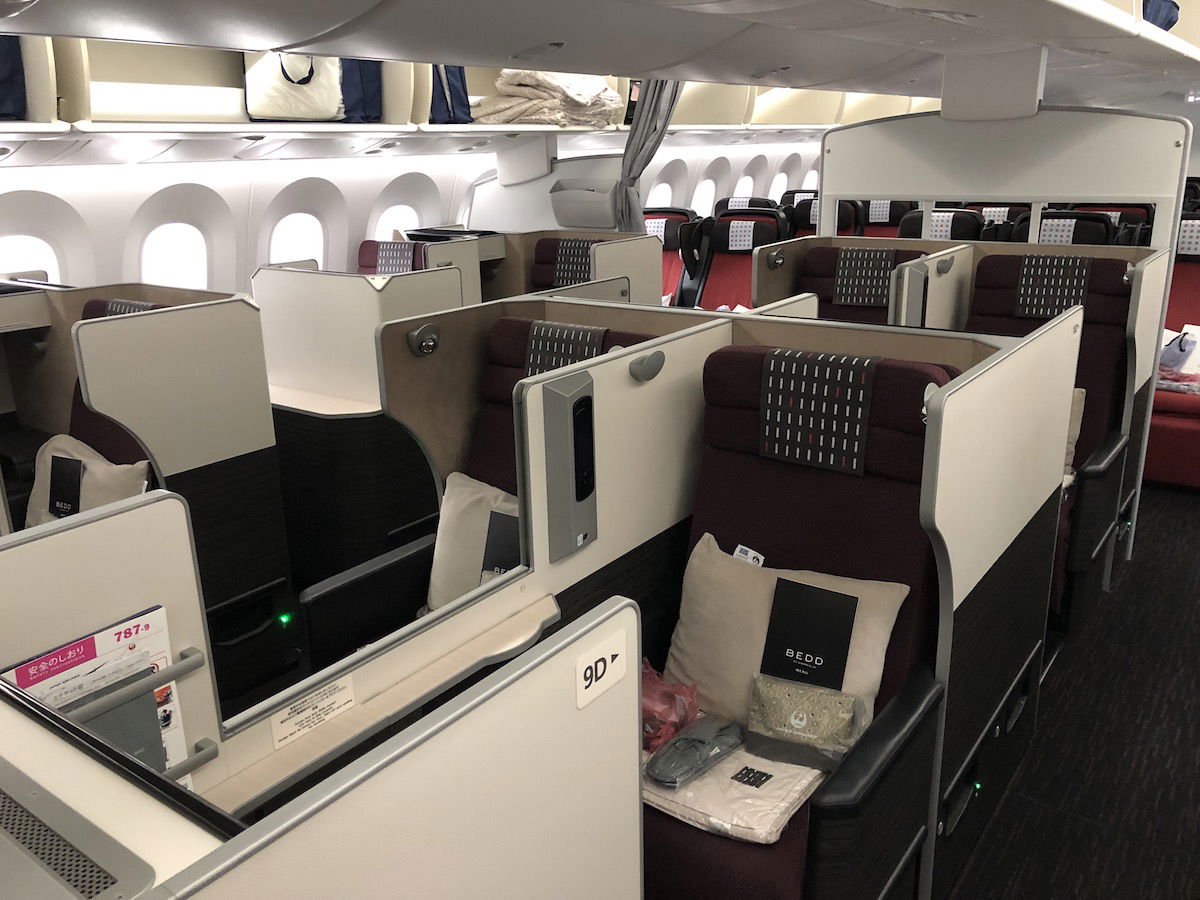
Japan Airlines 787-9 business class cabin
On the surface Apex Suites may look unremarkable, though what I love about them so much is that they’re spacious, private, and you don’t have to squeeze your feet into a small footwell, which is a trend we see all too often nowadays.
I assigned myself seat 8A, while I assigned Ford 7A, right in front of me. Window seats in this configuration are by far the best option.
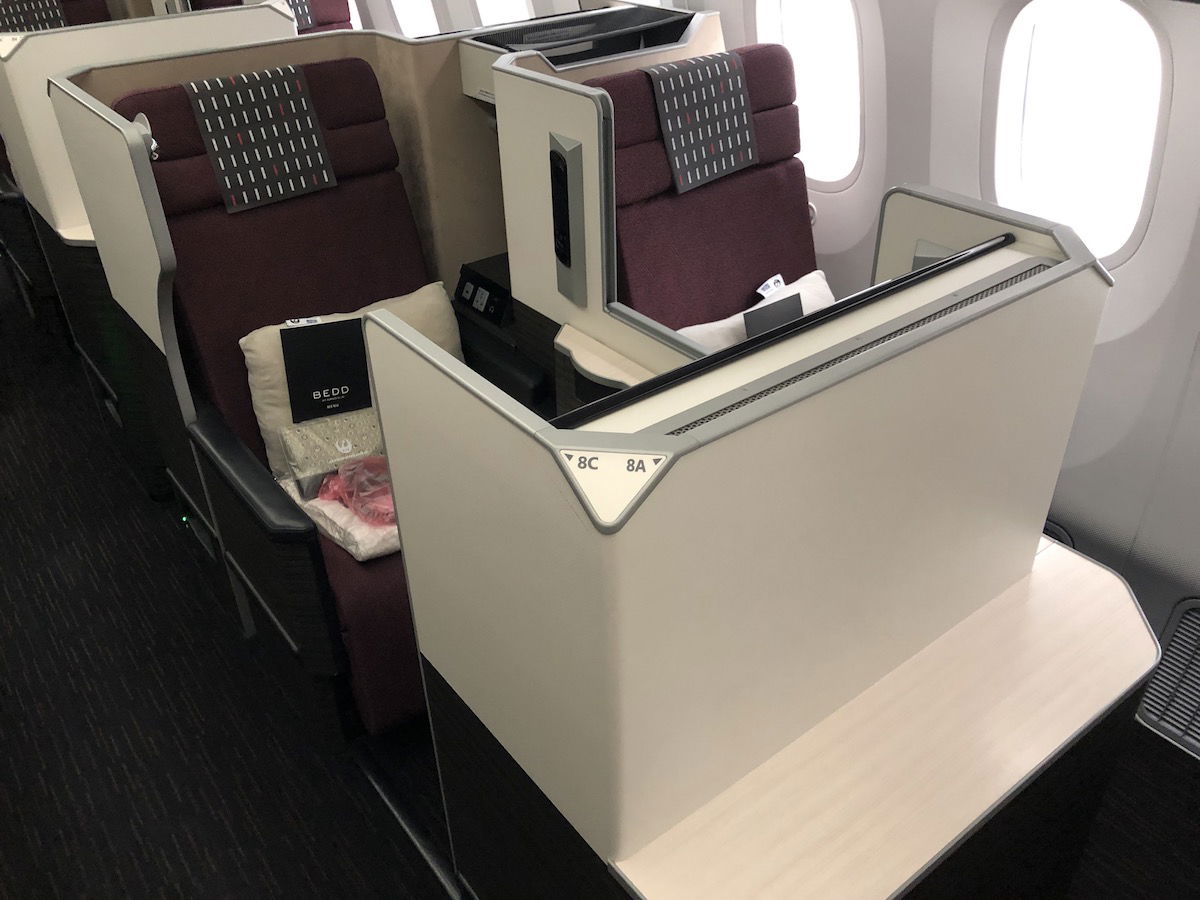
Japan Airlines business class seats 787-9
What makes the window seats so special? For one, you have direct aisle access. There’s a small path leading to the window seats, so you don’t have to jump over the person in the aisle.
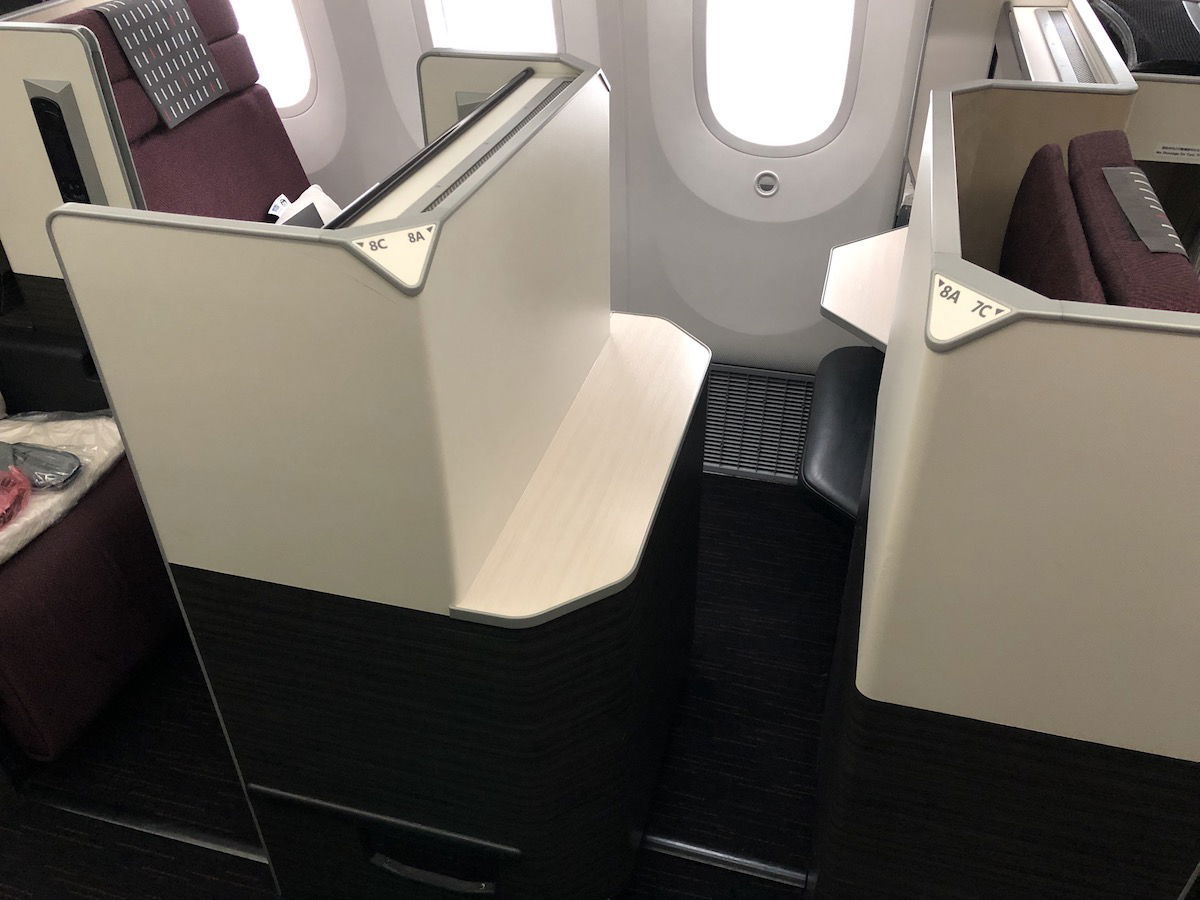
Japan Airlines business class seats 787-9
More importantly, there’s a partition between the seats, and if that partition is raised (which you can do after takeoff), you have one of the most private business class seats in the sky.
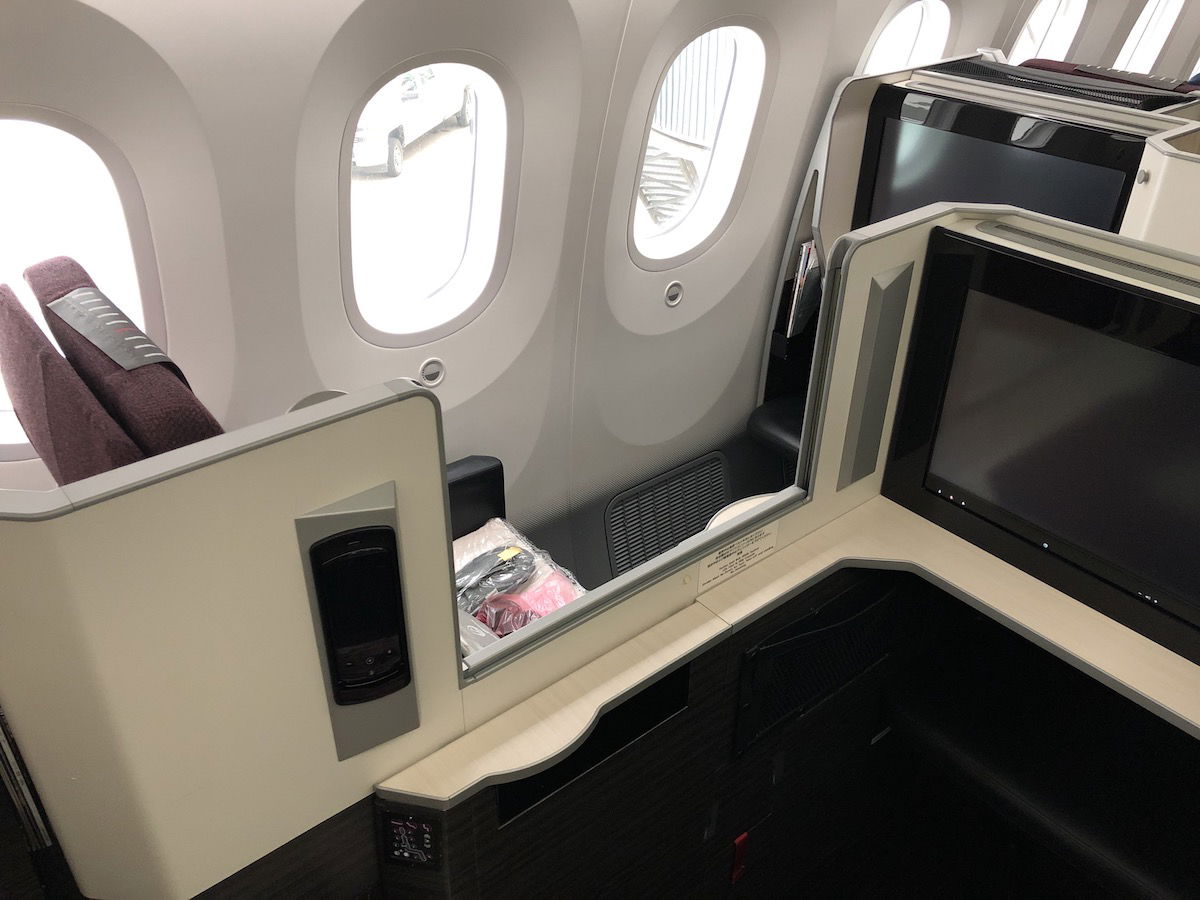
Japan Airlines business class seats 787-9
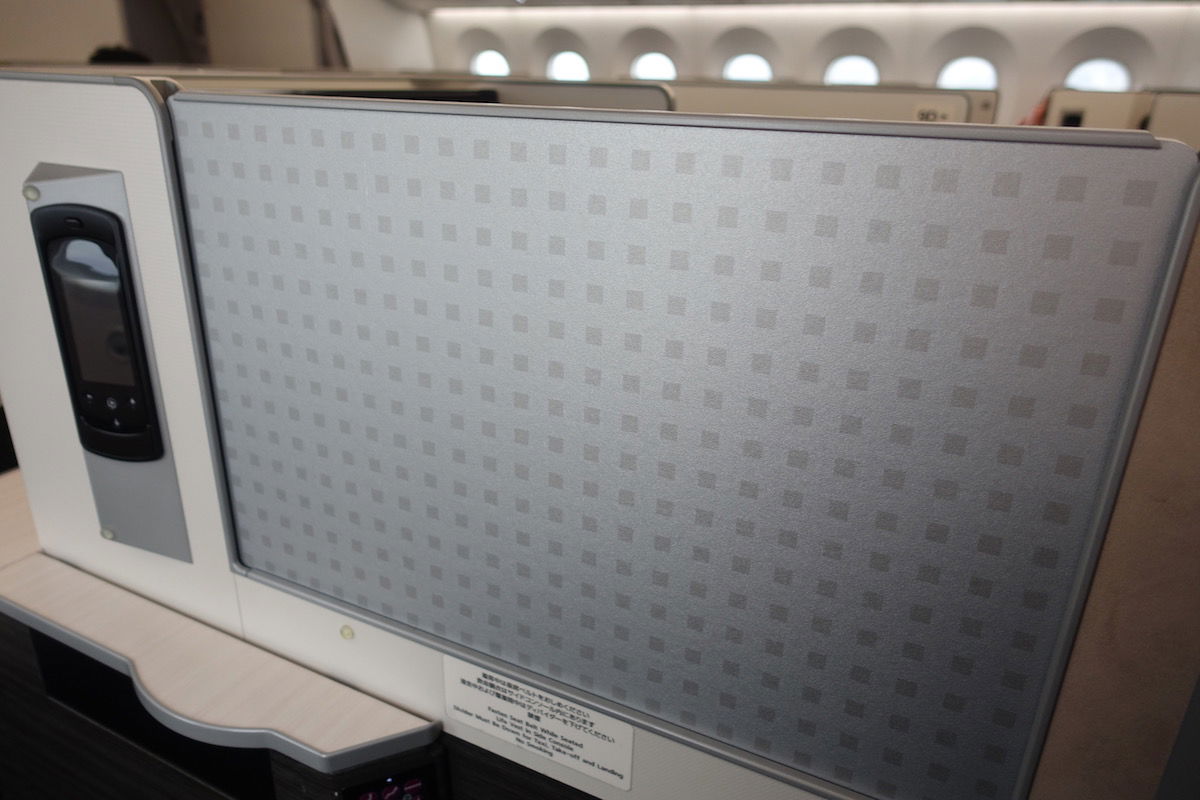
Japan Airlines business class privacy shield
While the aisle and window seats are staggered (one is further up than the other), the center seats are right next to one another. While that might seem ideal for those traveling together, personally I’d still choose an aisle and a window, or even two windows, if traveling with someone. The window seats in this configuration are just so much better (in case I haven’t made that clear yet). 😉
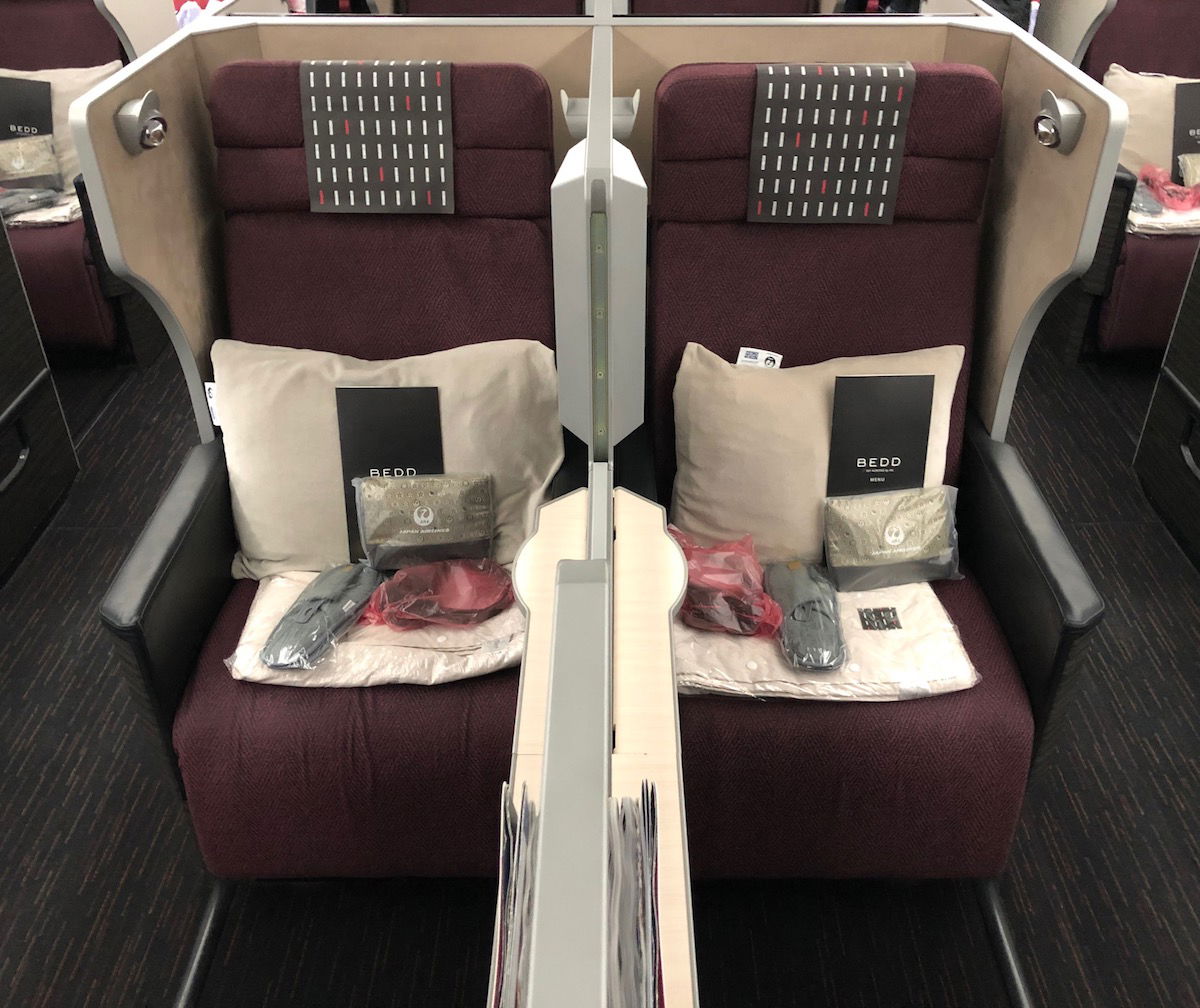
Japan Airlines business class seats 787-9
Now, perhaps the downside to Apex Suites is that they have virtually no storage, at least within easy reach. So it’s almost tough to figure out where to place your phone.
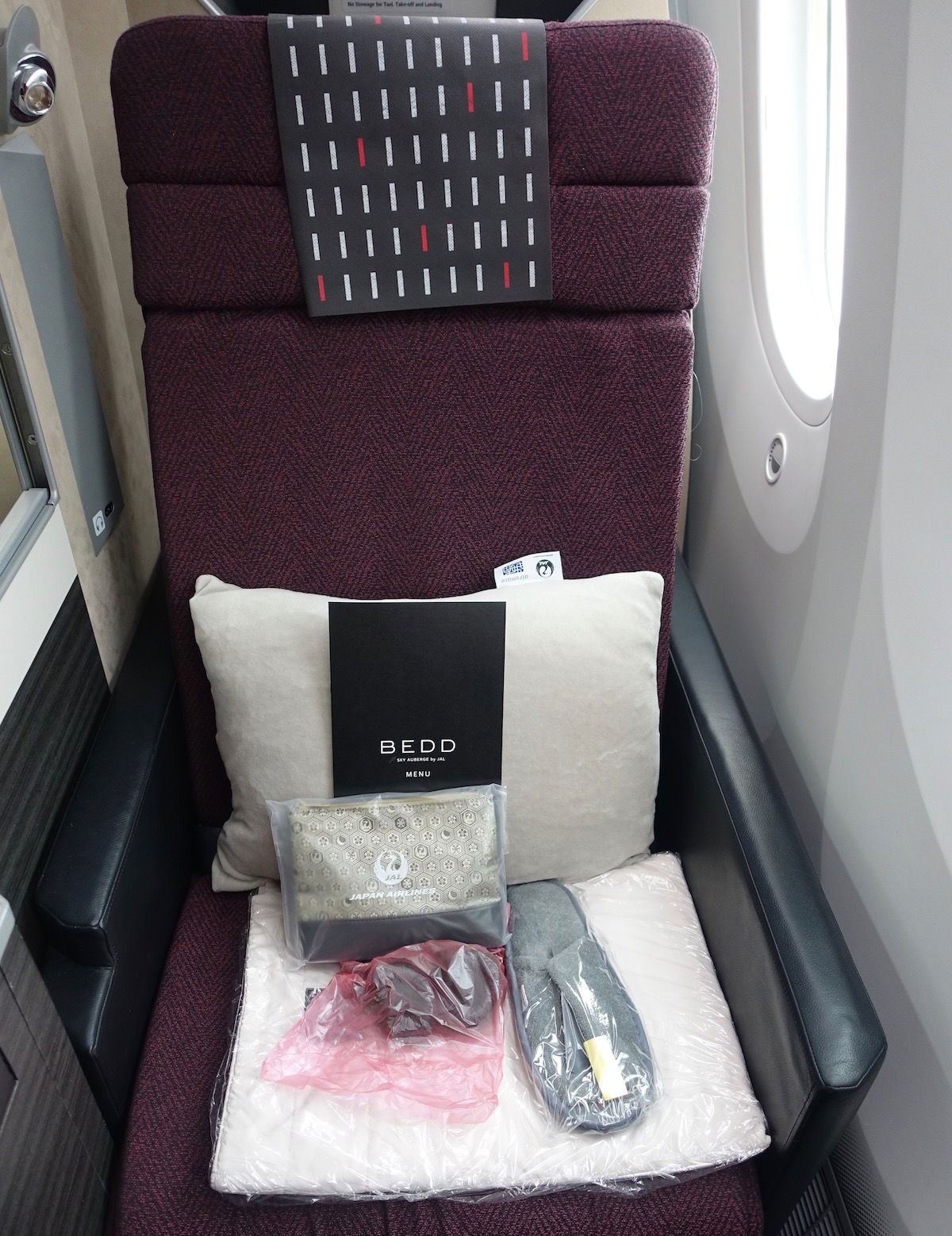 Apex Suite window seat Japan Airlines
Apex Suite window seat Japan Airlines
But that’s a small price to pay for having a massive ottoman on which to place your feet, rather than having to squeeze them into a small footwell. Furthermore, there’s a significant amount of storage underneath the ottoman, so you can easily place a bag there during the flight.
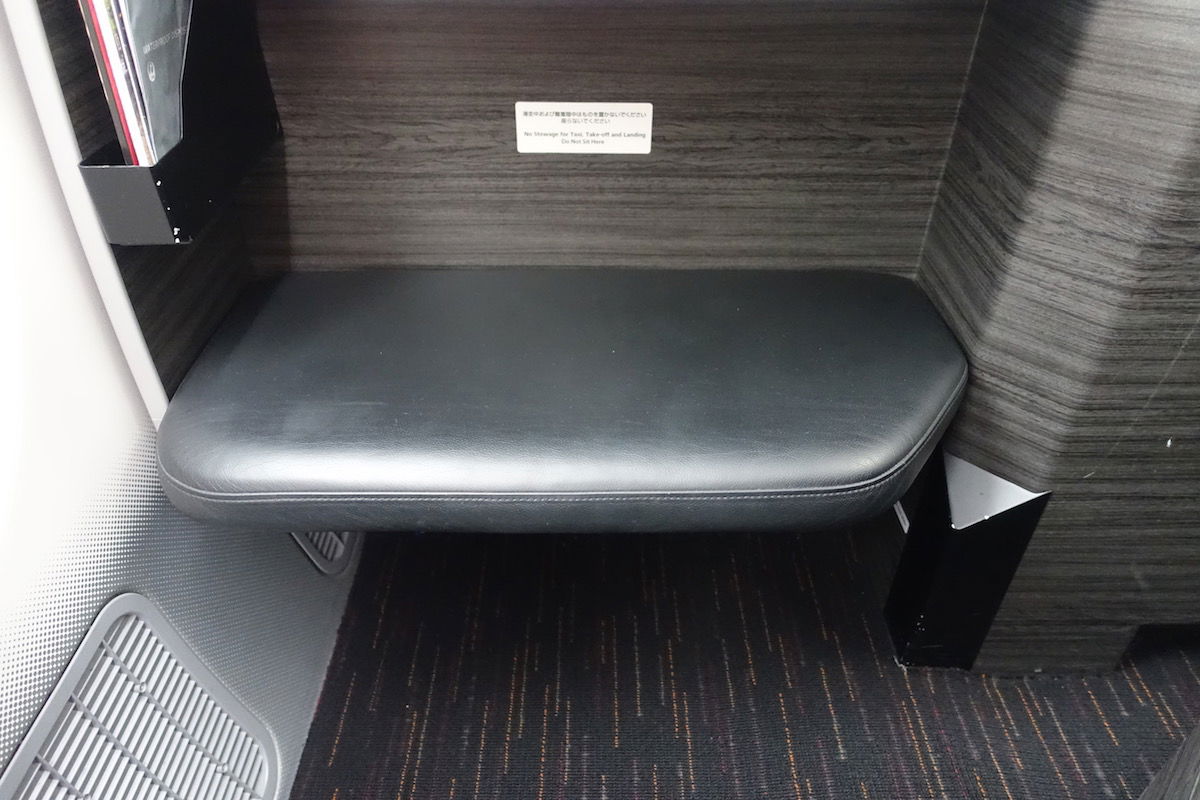 Japan Airlines Apex Suite 787-9
Japan Airlines Apex Suite 787-9
In terms of the seat features, there’s a panel with seat controls to the side of the seat.
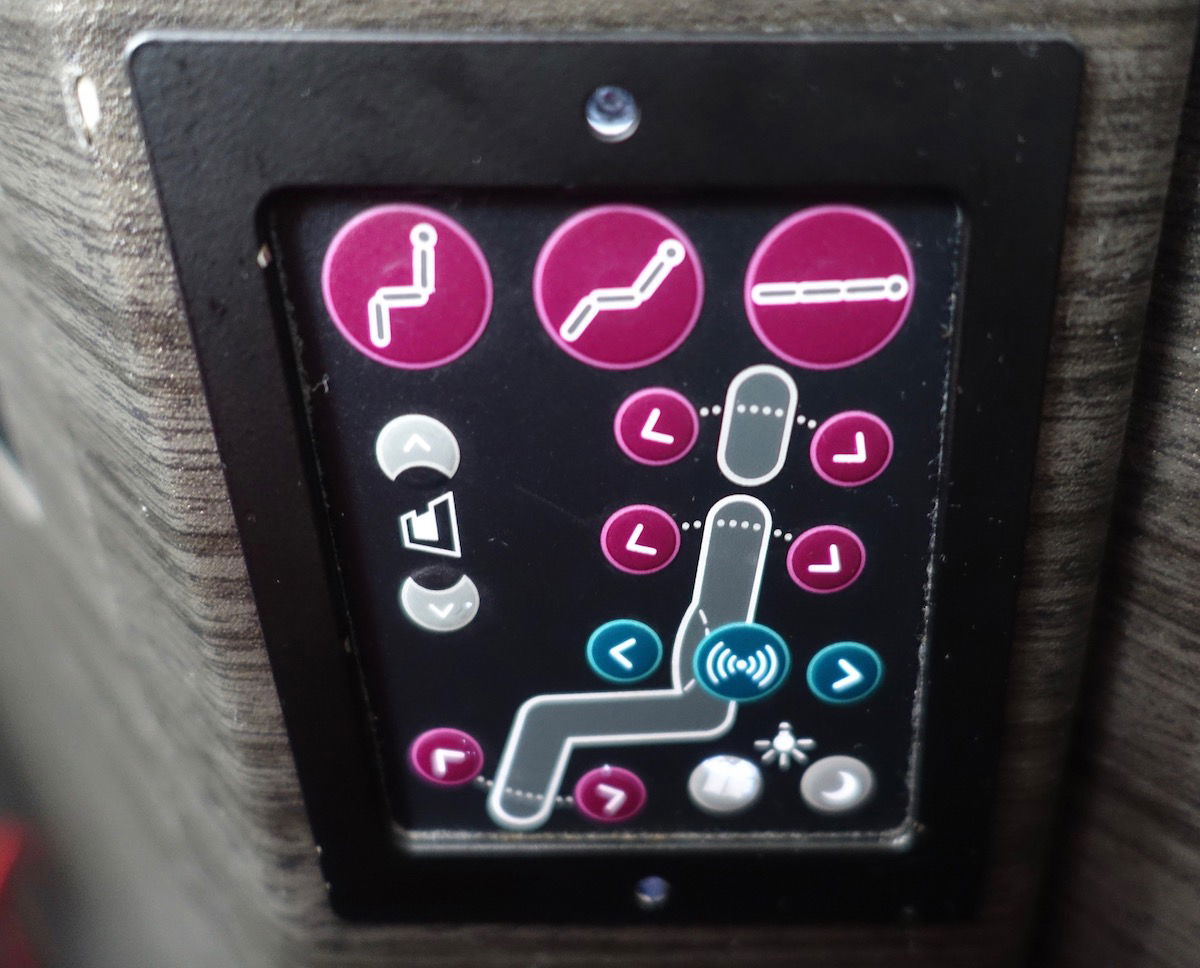
Japan Airlines business class seat controls
This is also where the entertainment controller is located.
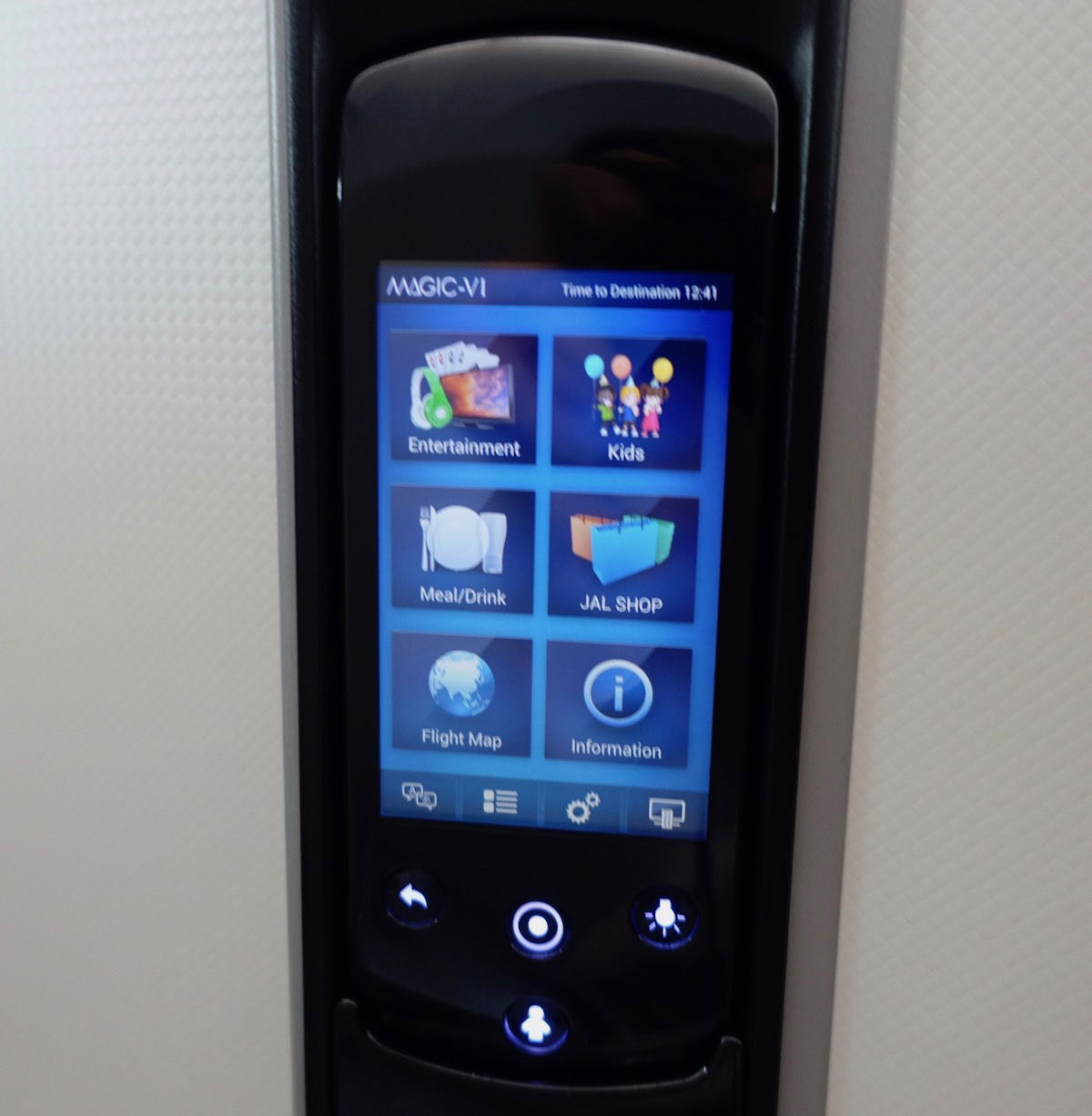 Japan Airlines business class entertainment controller
Japan Airlines business class entertainment controller
The 110v and USB outlet is also within easy reach.
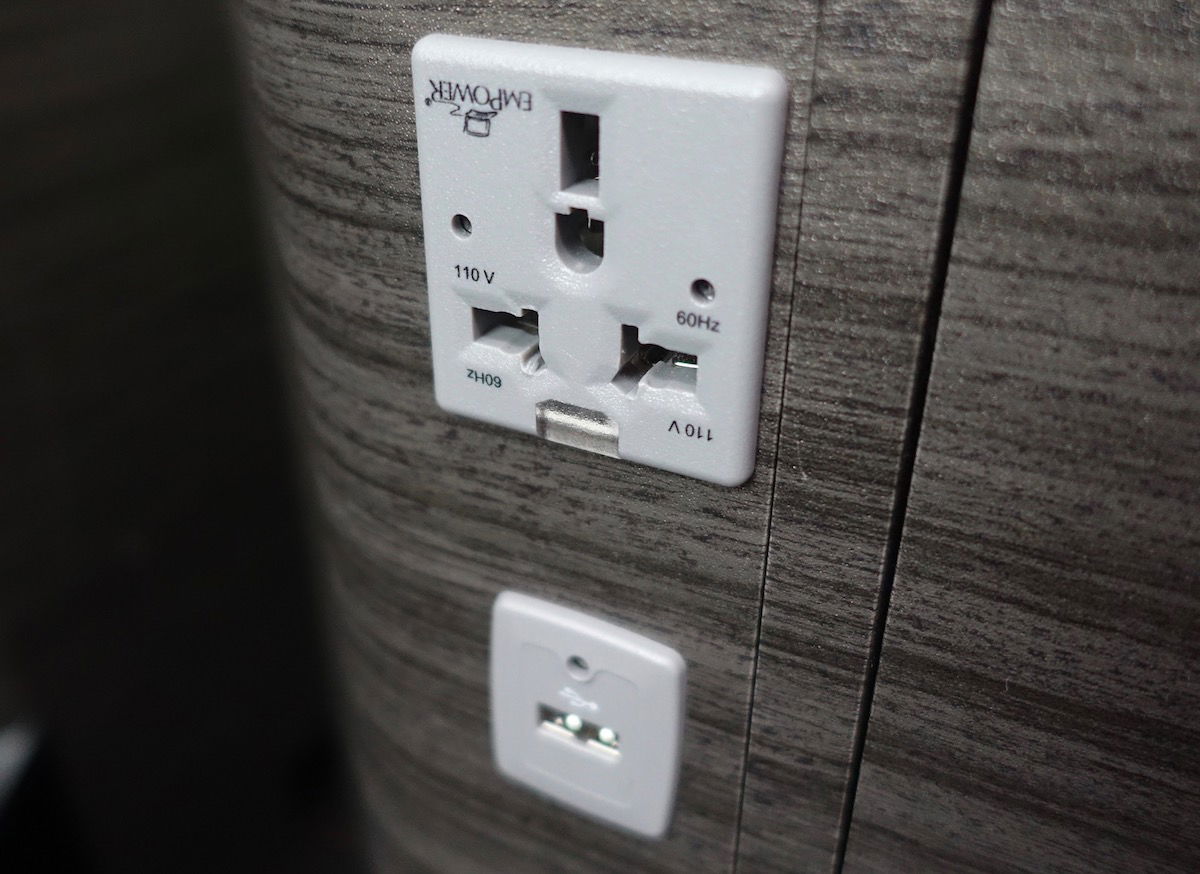
Japan Airlines business class power outlet
The tray table pops out of the side armrest, and consists of a solid table that can’t be folded over (so don’t expect that you can get up during the meal service).
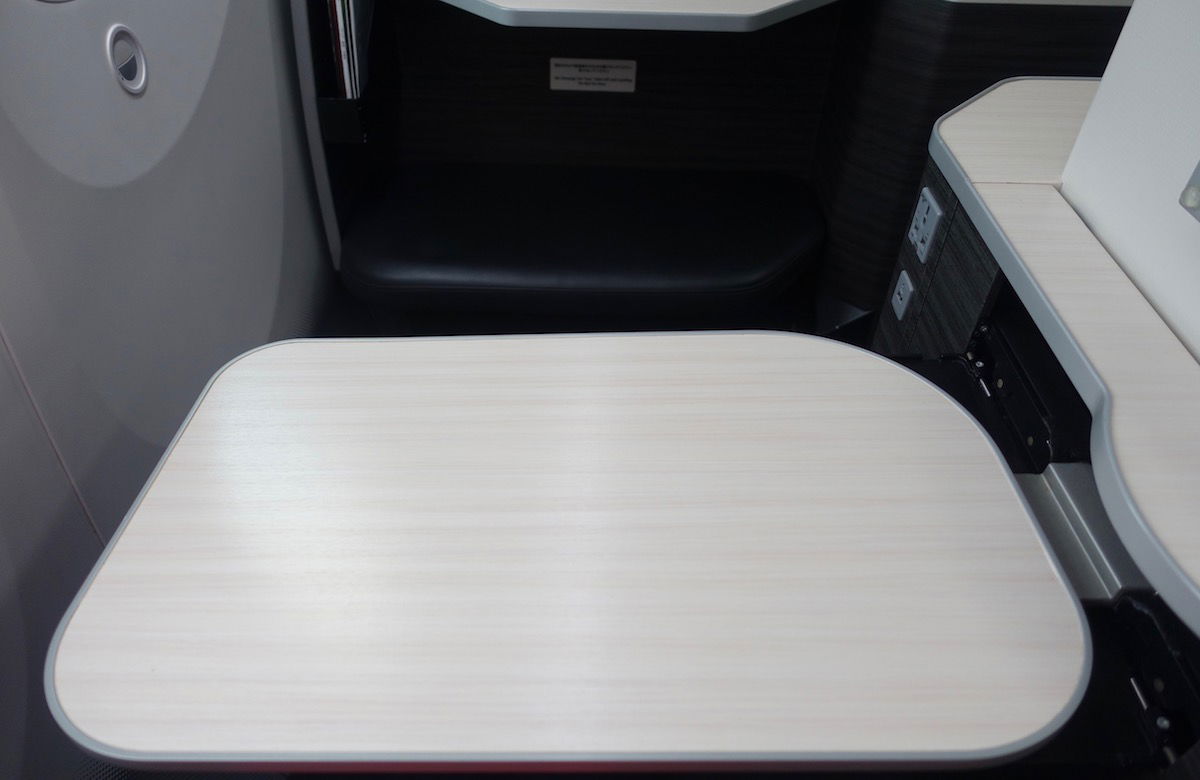
Japan Airlines business class tray table
This is an excellent seat, though I do have to note that rather annoyingly Japan Airlines doesn’t have have individual air nozzles, which sure is frustrating, given that the airline keeps their cabins quite warm.
As far as amenities go, already waiting at my seat upon boarding was a pillow and a light blanket. This is only part of the bedding, as they have more bedding when it’s time to sleep.
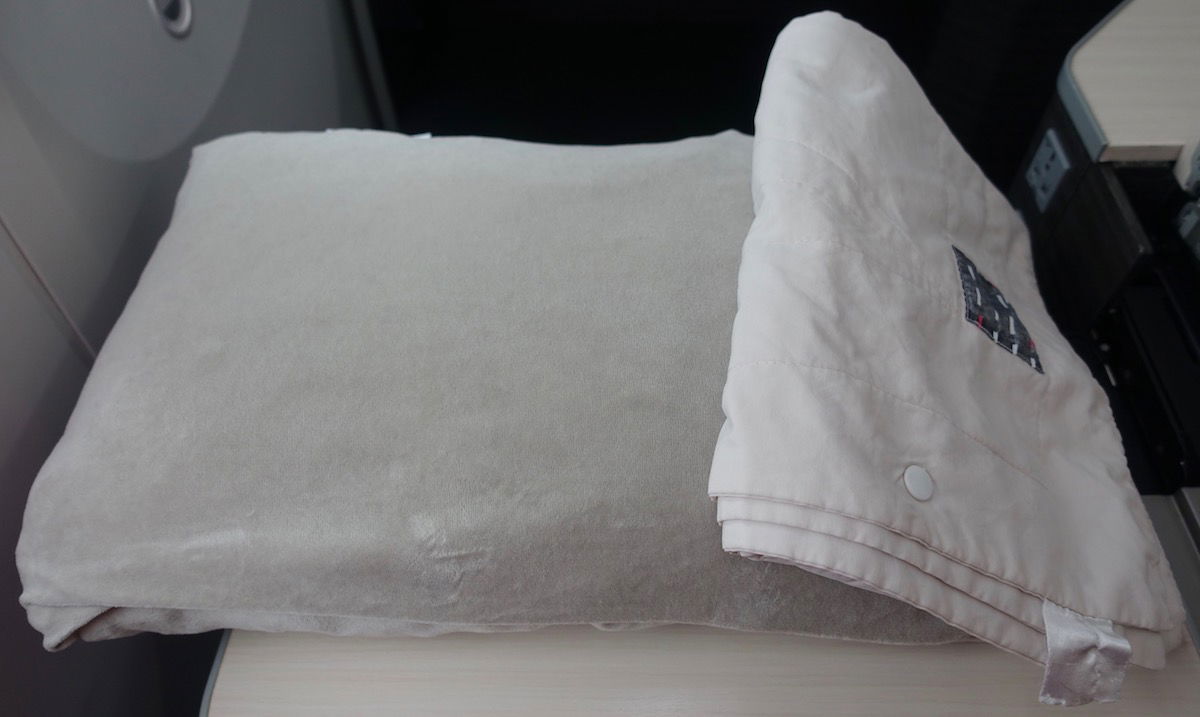
Japan Airlines business class bedding
There were also a pair of headphones, which were fairly high quality.
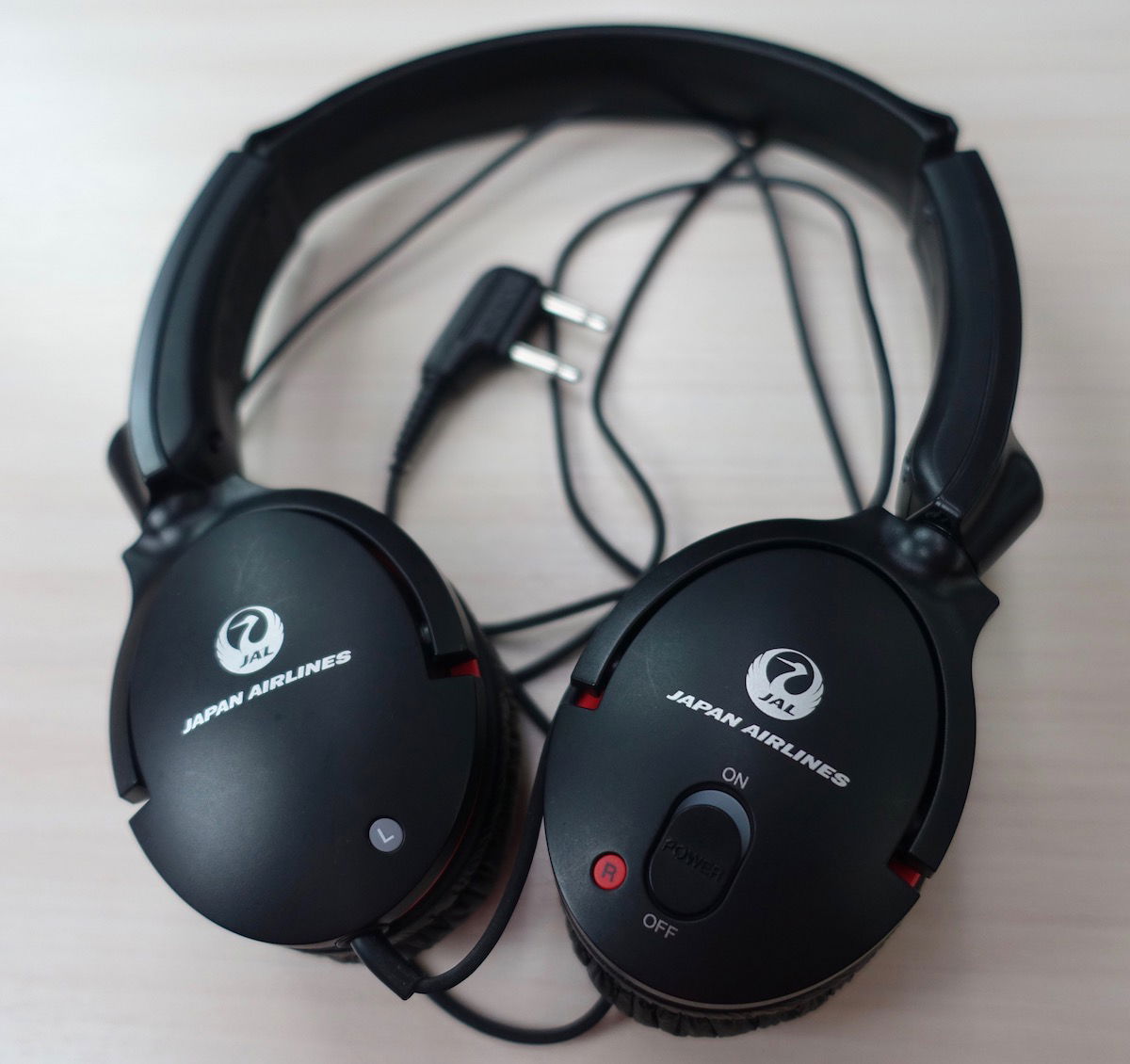 Japan Airlines business class headphones
Japan Airlines business class headphones
Then there were slippers, along with a shoehorn.
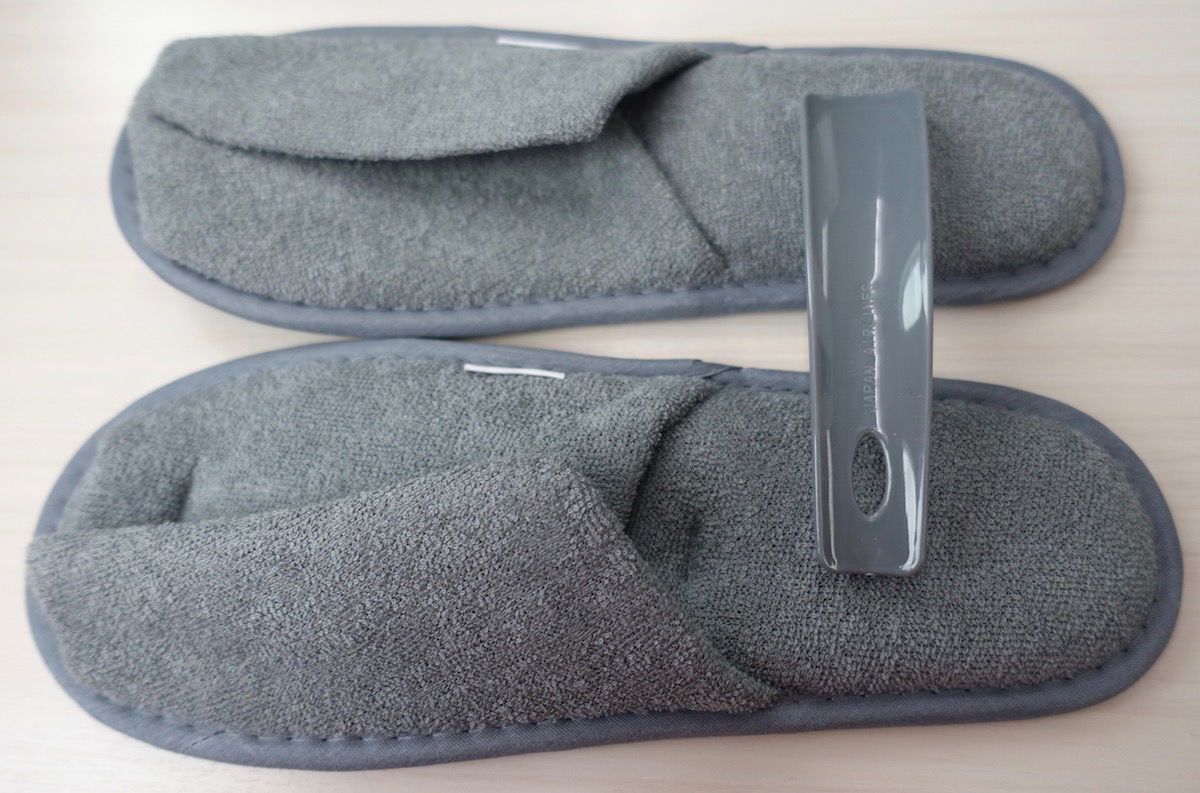
Japan Airlines business class slippers
There was also an amenity kit, which contained some rather unconventional products, like a “gentle steam eye mask,” a “moisture mask,” and a “medicated stick,” as they were described.
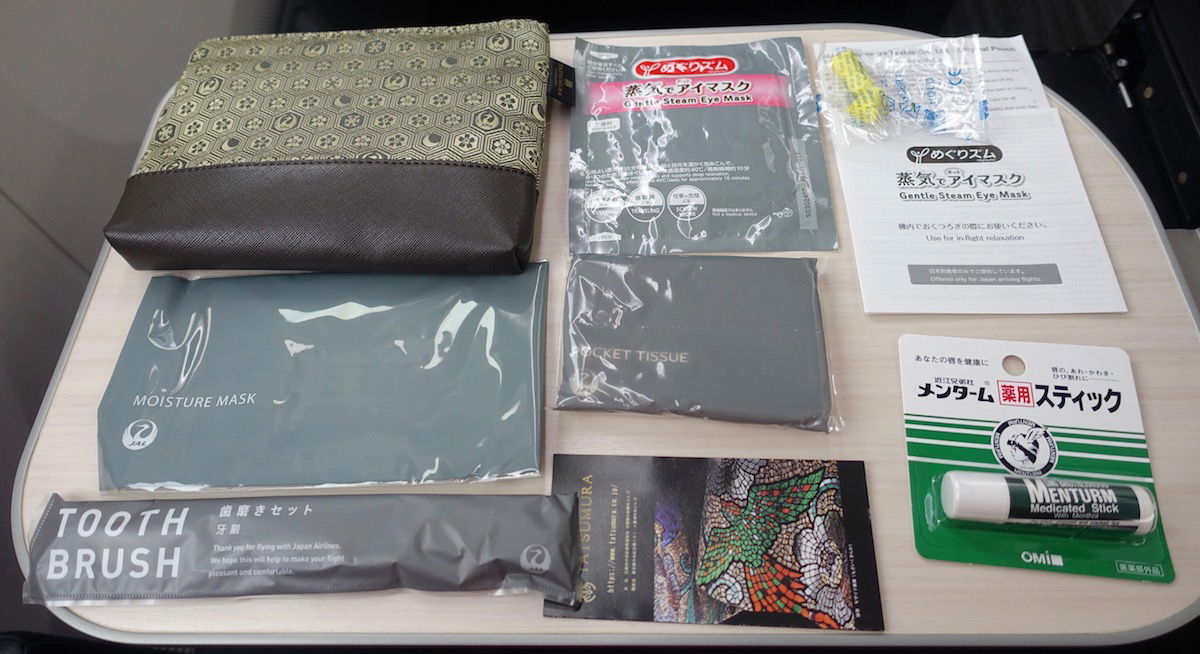
Japan Airlines business class amenity kit
Also waiting at my seat was the menu, from JAL’s oddly named “BEDD Sky Auberge” dining program.
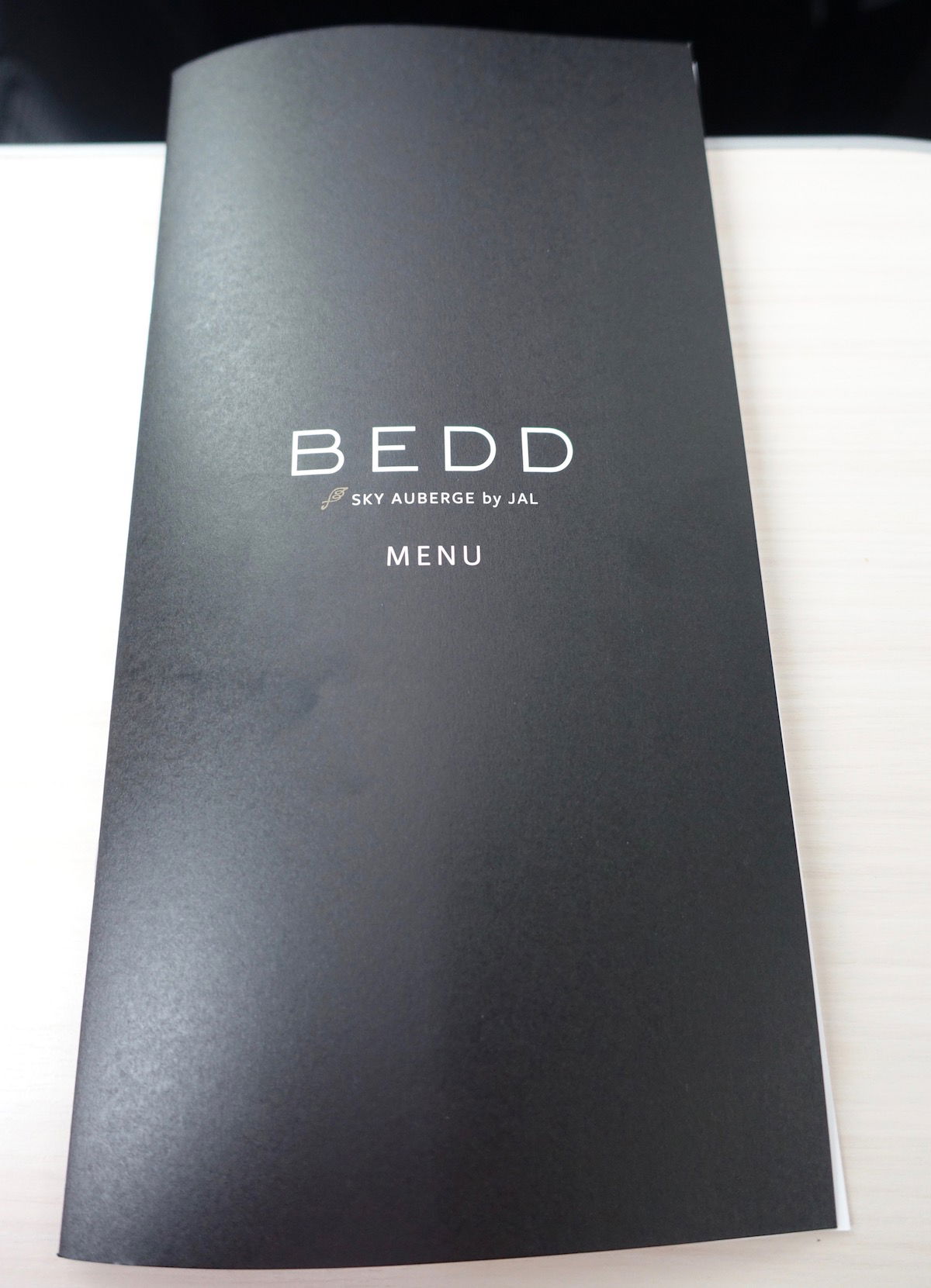
Japan Airlines business class menu
Japan Airlines’ 787-9s are extremely low capacity (they have just 195 seats), so boarding was quick. Economy was full, premium economy was about half full, and business class was about 75% full.
The seat next to me stayed empty. This was ideal, since it meant Ford and I could both have window seats, but Ford could still come and sit next to me during meals.
25 minutes after boarding started, landing cards were distributed for Japan. Then a couple of minutes later pre-departure drinks were offered, with the choice between champagne and orange juice. I was offered a tiny pour of champagne, and frankly was surprised it was served in a plastic cup.
I know American and Japan Airlines have a transpacific joint venture, but I didn’t think this would mean that JAL adopts American’s service levels.
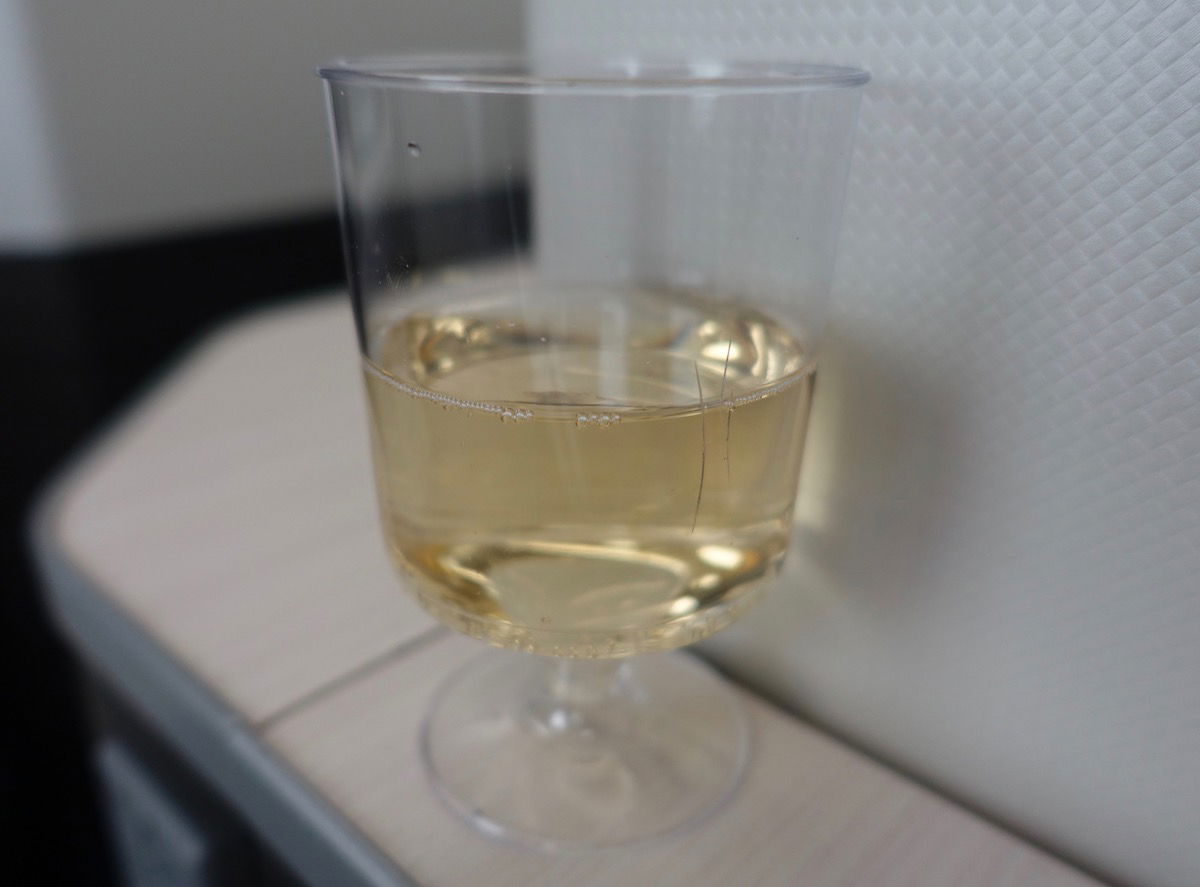 Japan Airlines business class pre-departure drink
Japan Airlines business class pre-departure drink
A few minutes later the crew passed through the cabin with magazines and newspapers. Then cardigans were distributed. I know this is a Japanese thing — personally I’ve never thought to myself “ah, what I really need to get comfortable for the next 13 hours is a cardigan!”
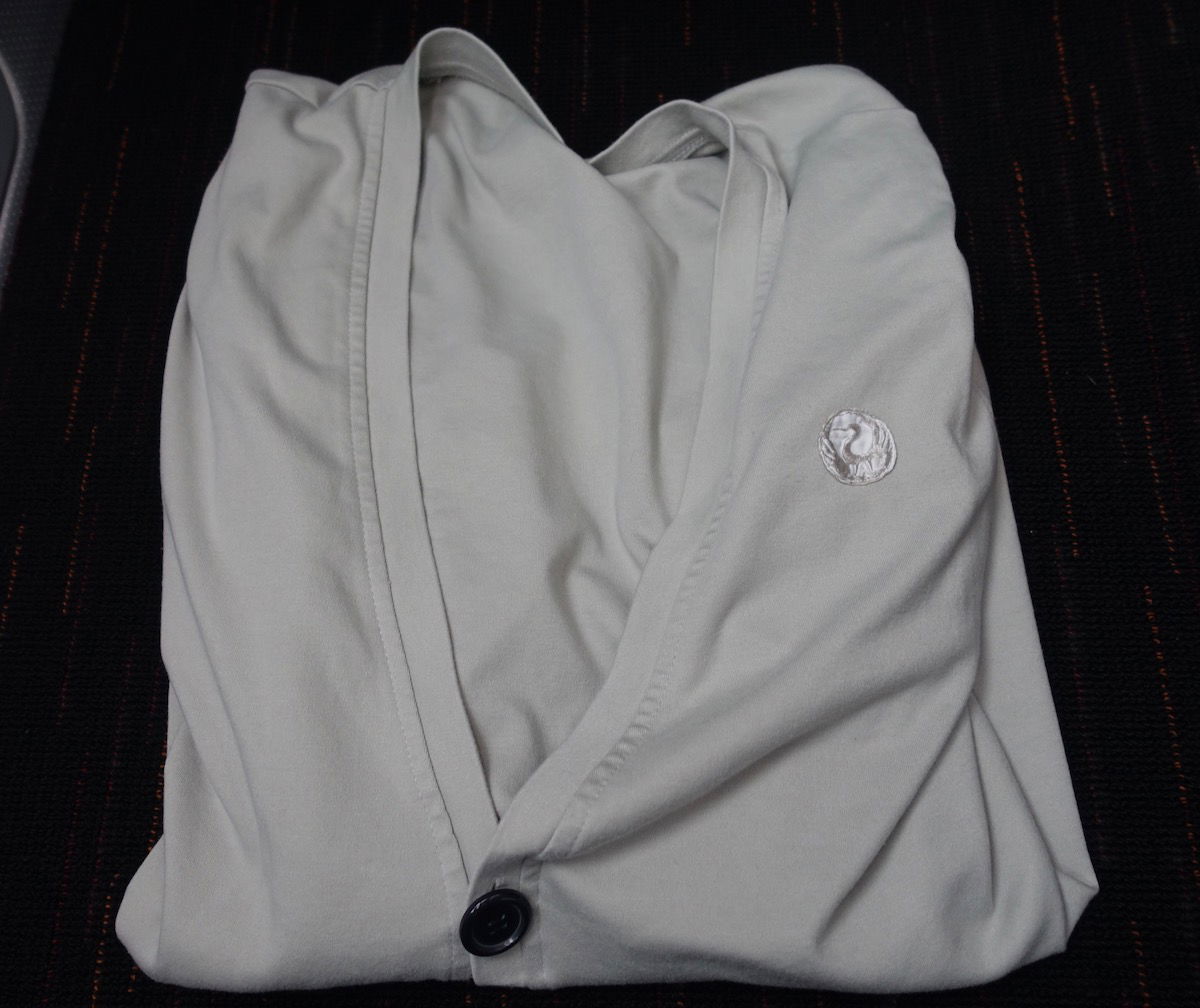
Japan Airlines business class cardigan
At 11:40AM the main cabin door closed, and we were advised of our flight time of 12hr55min. At 11:45AM we began our pushback.
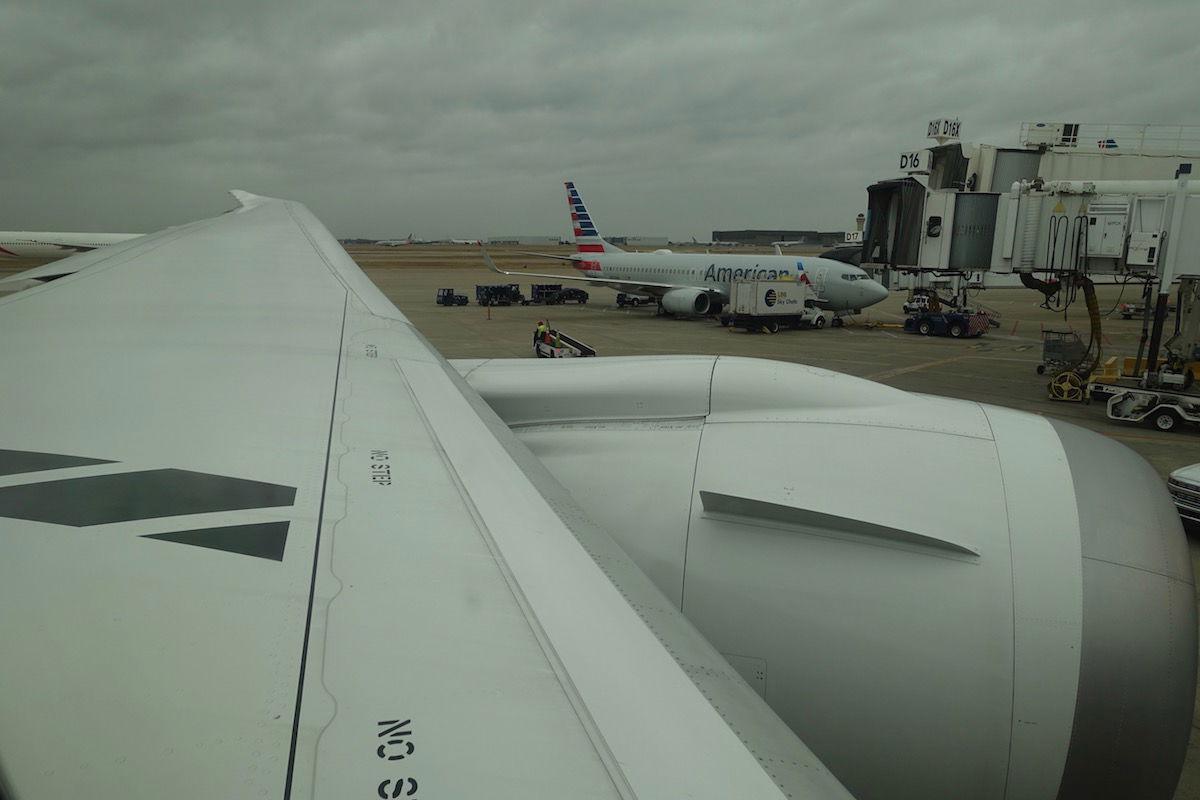 Pushing back DFW
Pushing back DFW
During pushback the safety video was screened, and by 11:50AM we started our taxi to the departure runway. Hello Asiana cargo!
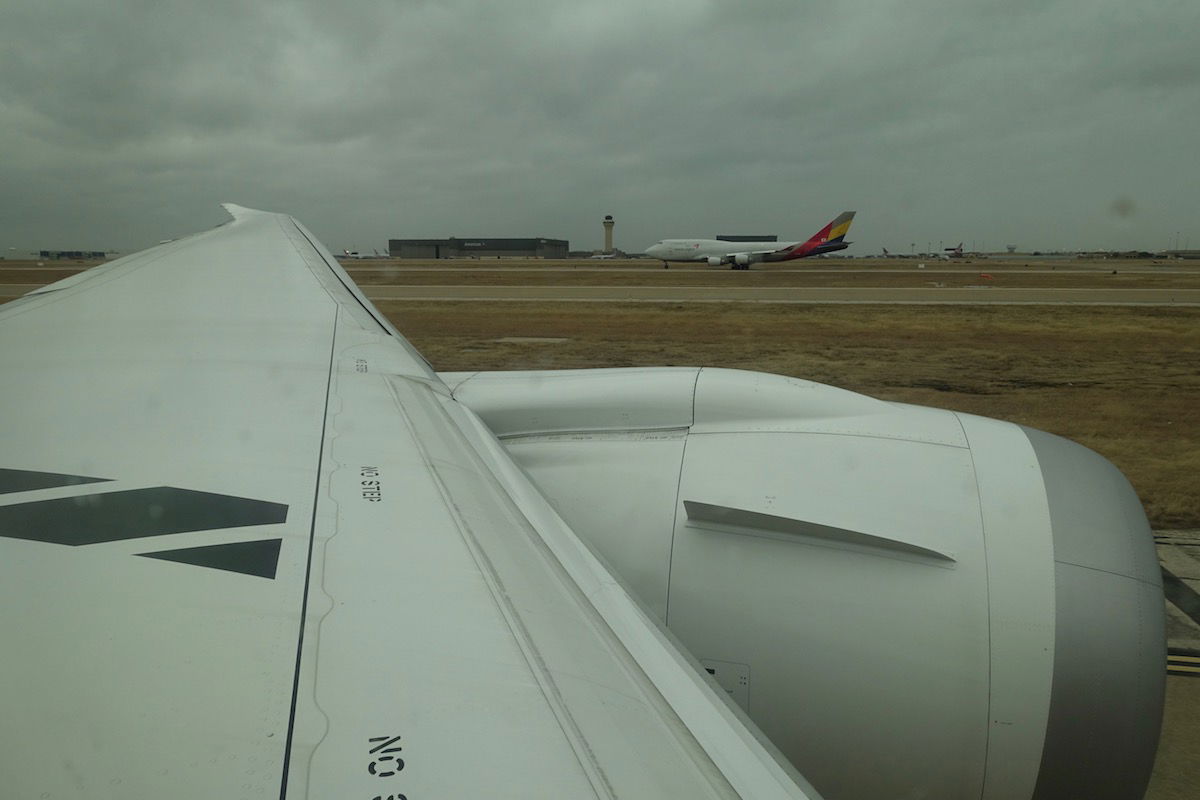
Taxiing DFW
We just had a short taxi, and at 12PM we were cleared for takeoff on runway 18L.
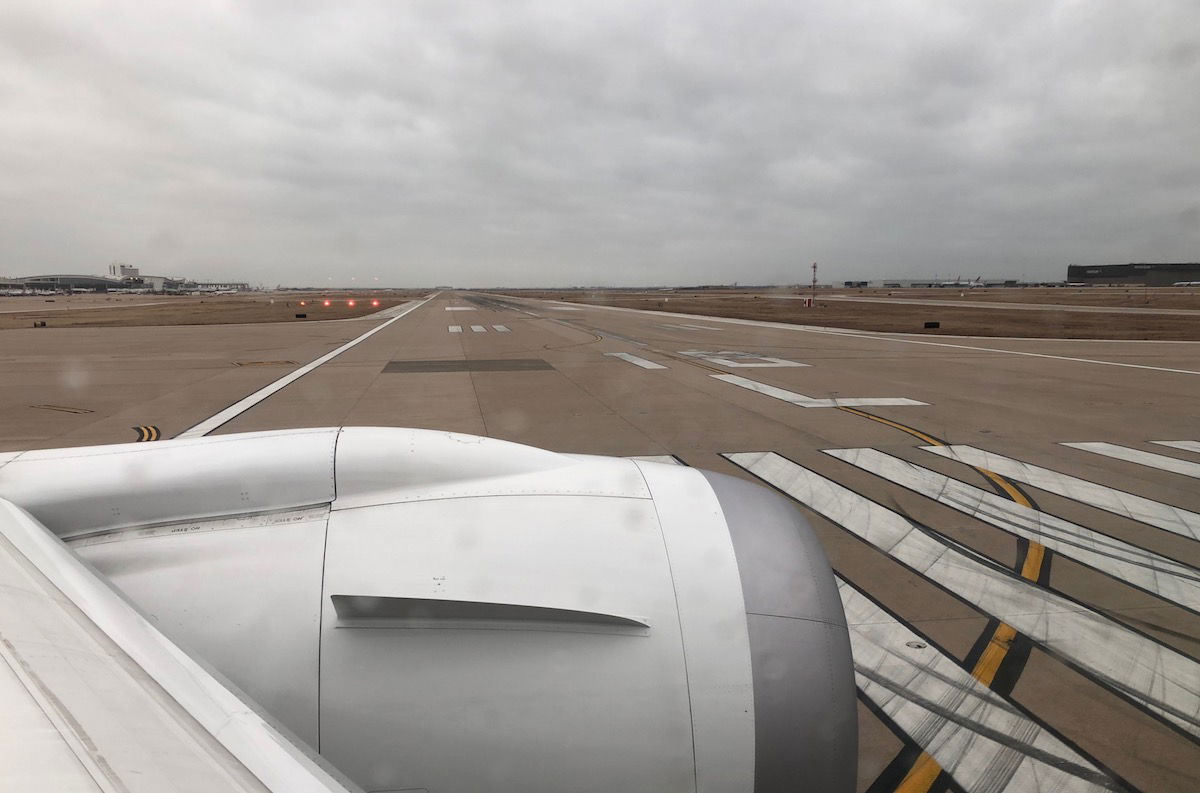 Taking off DFW
Taking off DFW
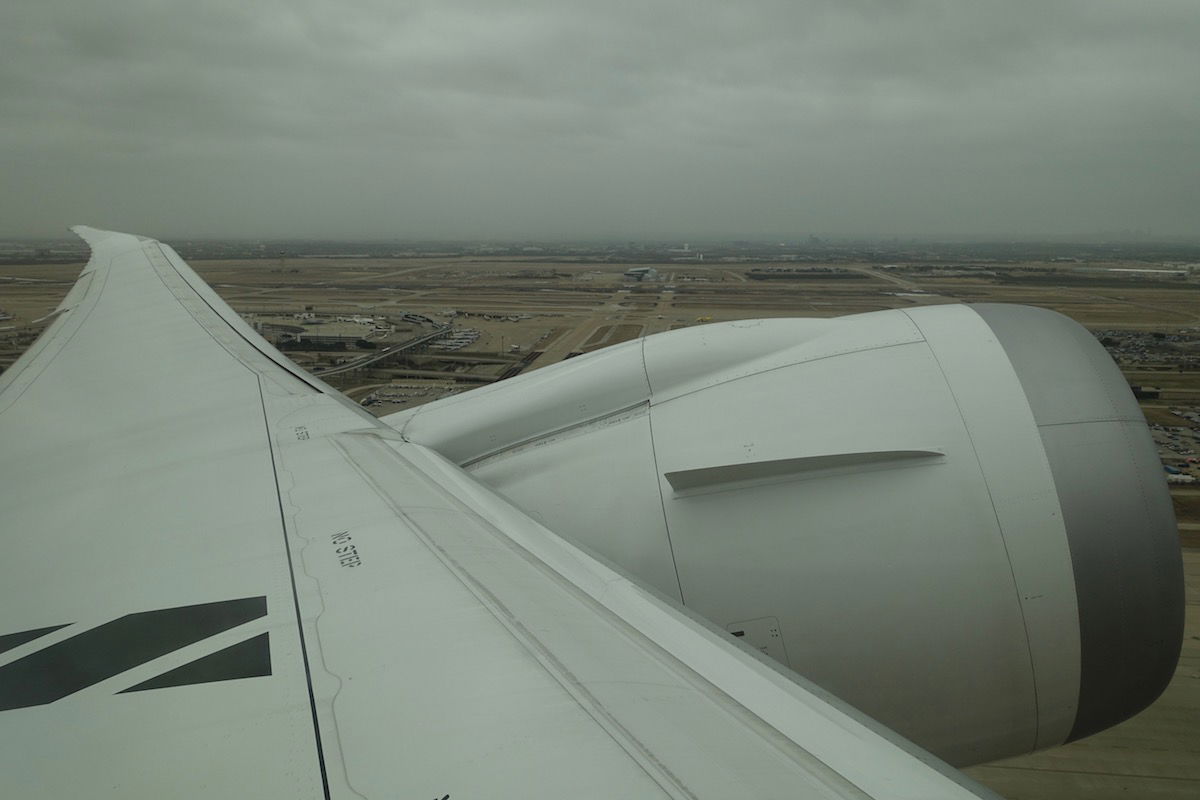 View after takeoff from DFW
View after takeoff from DFW
The seatbelt sign was turned off just five minutes after takeoff, and as usual my first destination was the bathroom. The JAL 787-9 business class cabin had three lavatories, including two in the center of the cabin, and one at the very front of the cabin.
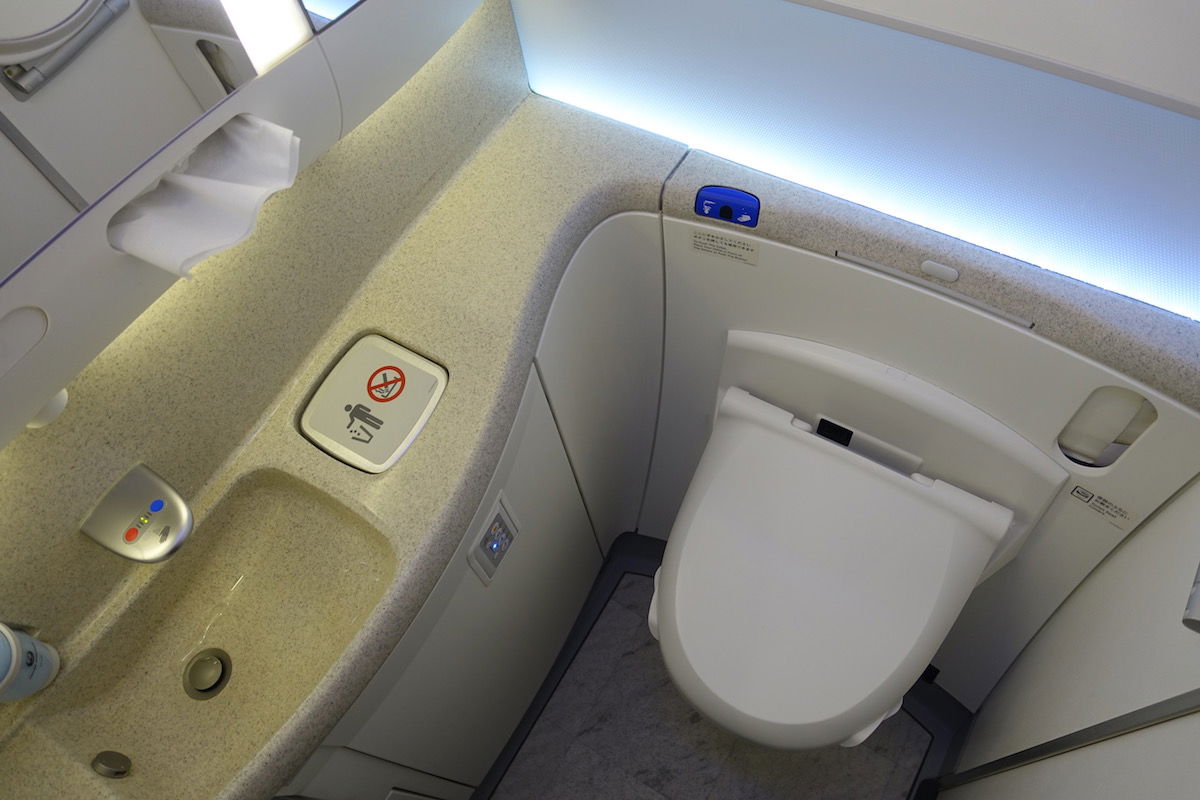 Japan Airlines lavatory
Japan Airlines lavatory
They had bidets, which sure is an awesome feature.
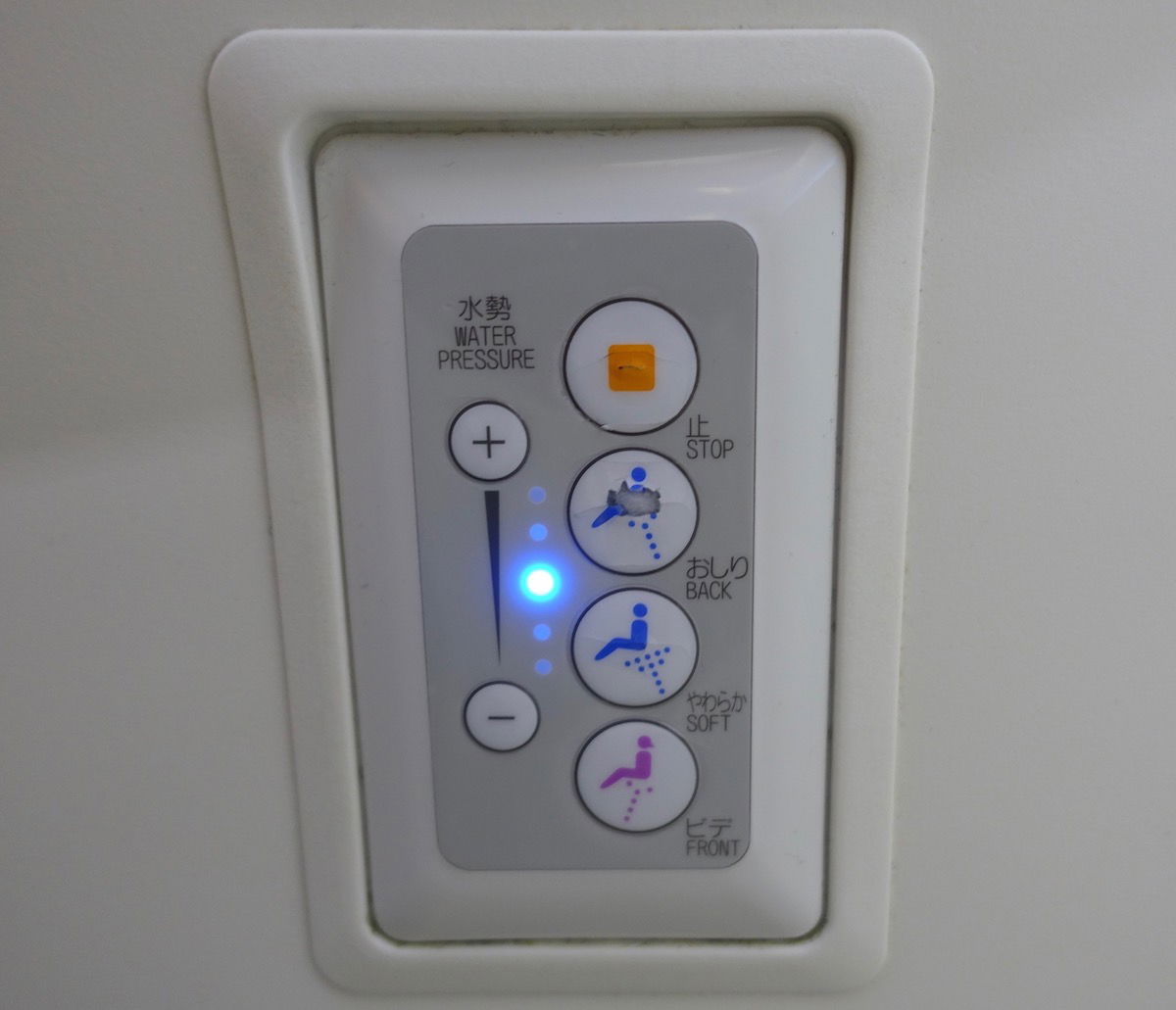
Japan Airlines lavatory bidet
They also had amenities like toothbrushes, toothpaste, mouthwash, and moisturizer.
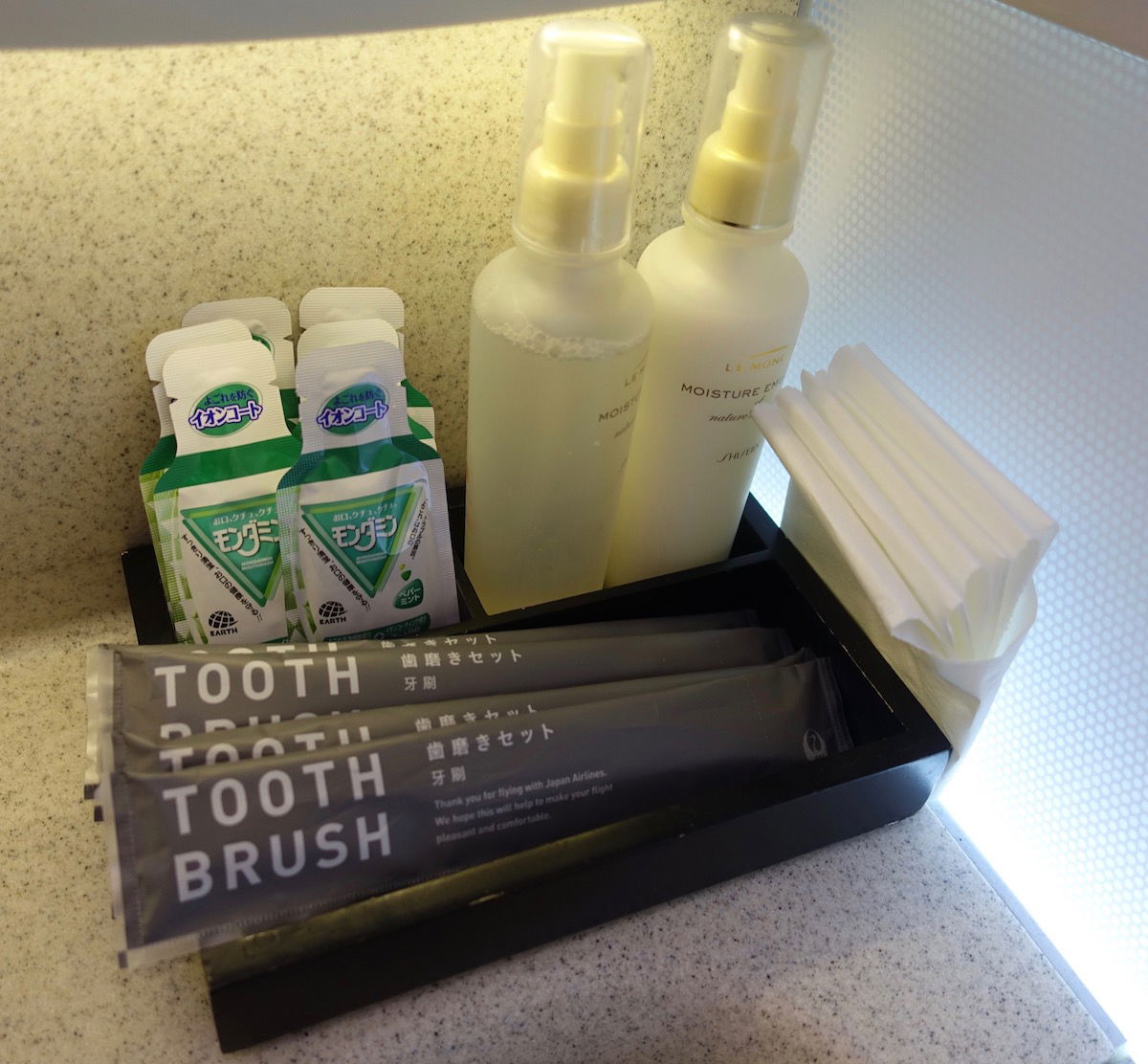
Japan Airlines lavatory amenities
The crew also put some cute notes in the lavatory.
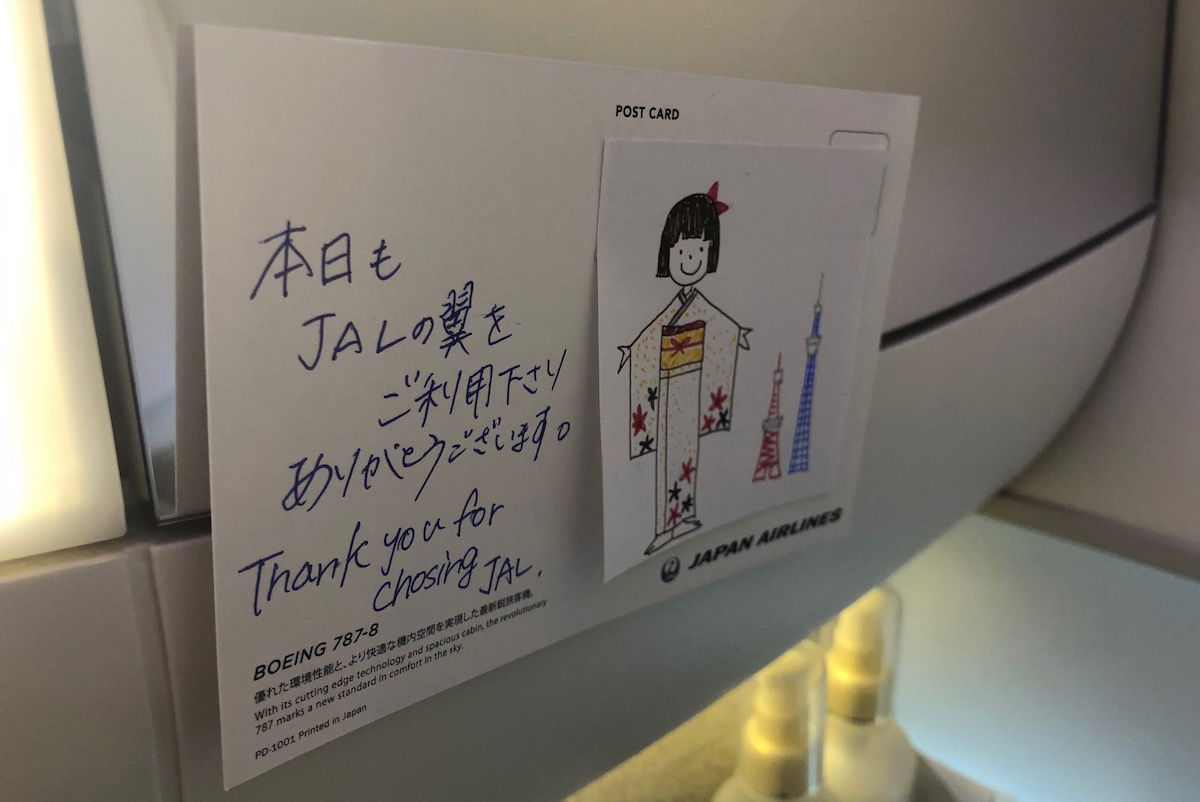
Japan Airlines lavatory
I was flying on a weekday and had quite a bit of work to get done, so one of the things I love about JAL is their Wi-Fi. They charge just $19 for Wi-Fi for the entire flight with no data caps. That’s tough to beat.
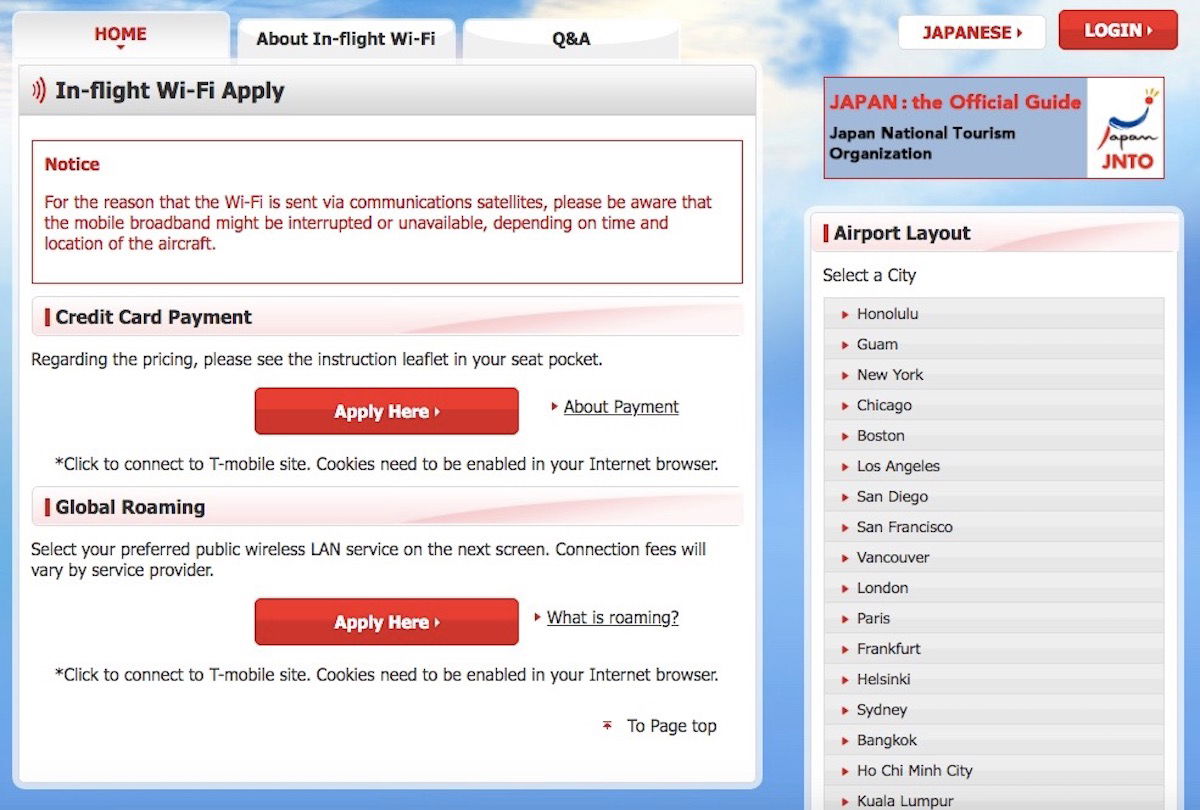 Japan Airlines Wi-Fi
Japan Airlines Wi-Fi

Japan Airlines Wi-Fi
As far as entertainment goes, JAL’s entertainment selection is limited, though perhaps even more annoying than the selection is that the monitor isn’t touchscreen. So you have to control everything off the small handheld controller (at least as far as I can tell), which I find complicated to use. Fortunately with Wi-Fi I don’t care much, since I’m happy just to be productive.
After takeoff service was pretty slow to get started. Meal and drink orders were taken by the crew about 30 minutes after takeoff. Warm towels were distributed a few minutes after that, and then tablecloths were distributed about 15 minutes later.
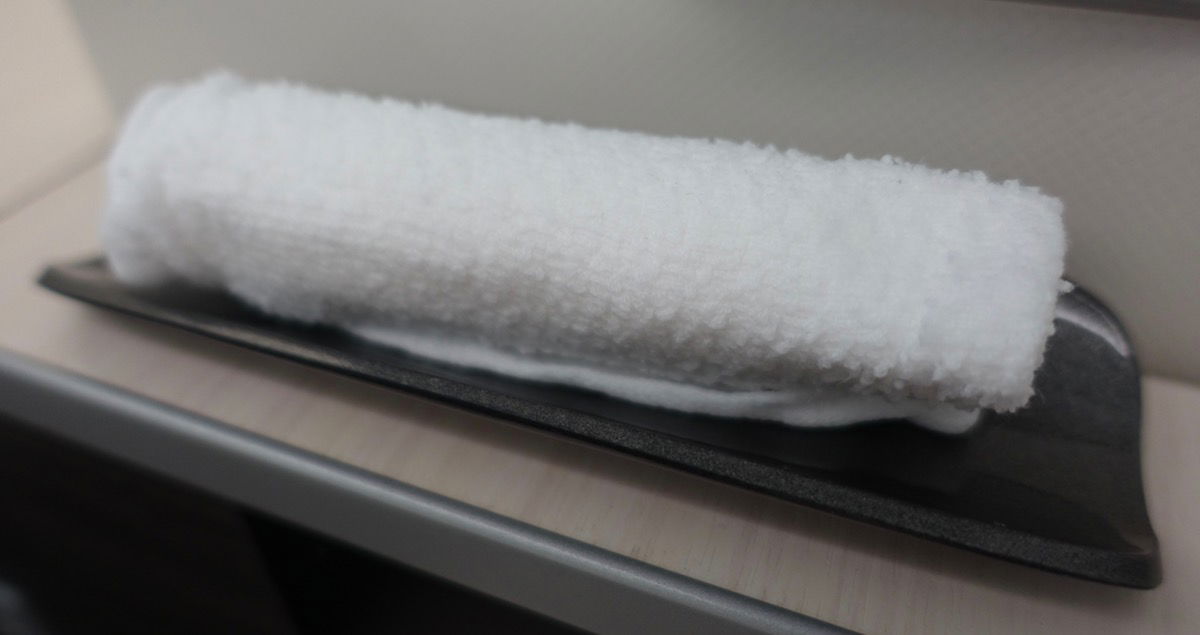 Japan Airlines business class warm towel
Japan Airlines business class warm towel
The menu read as follows:
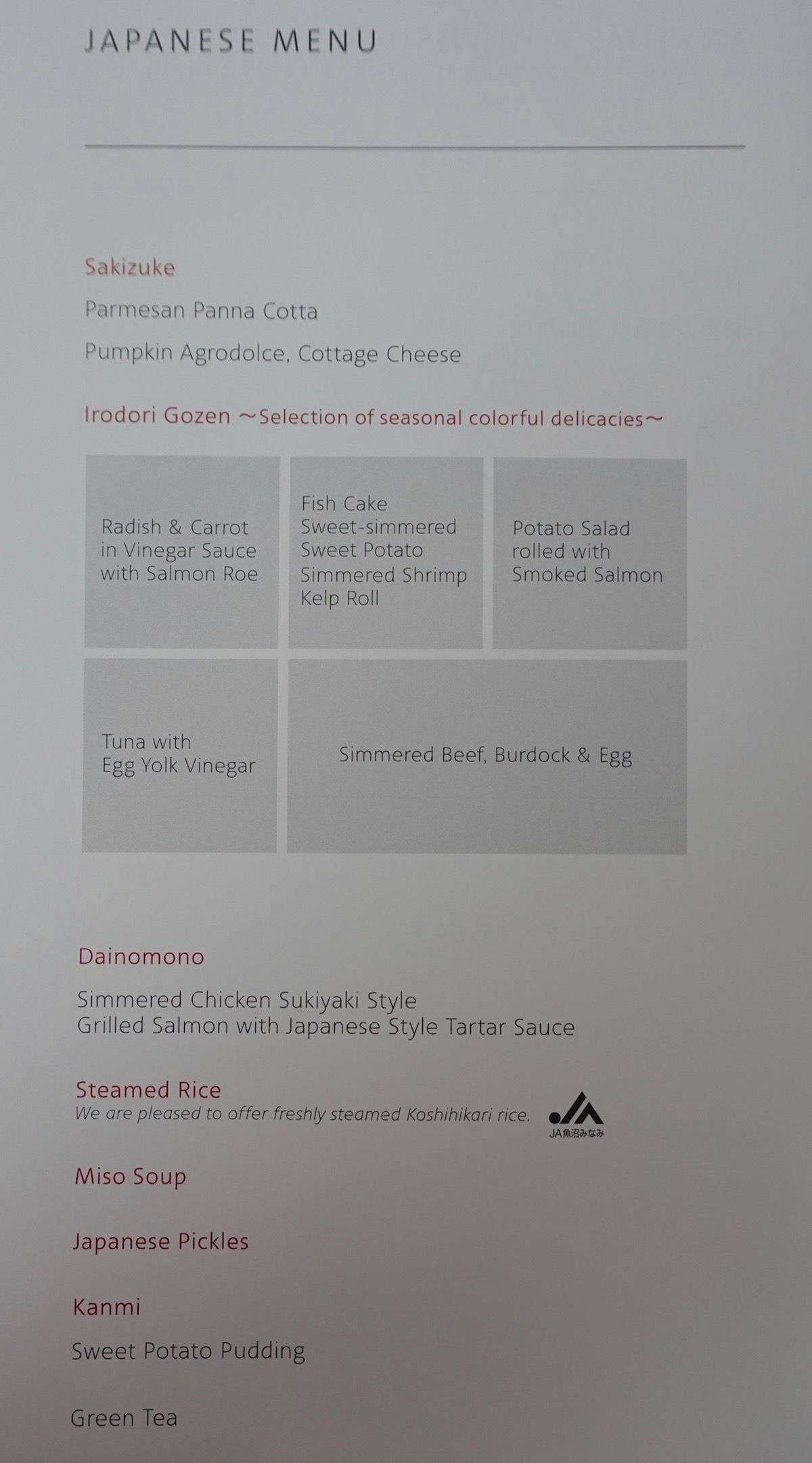
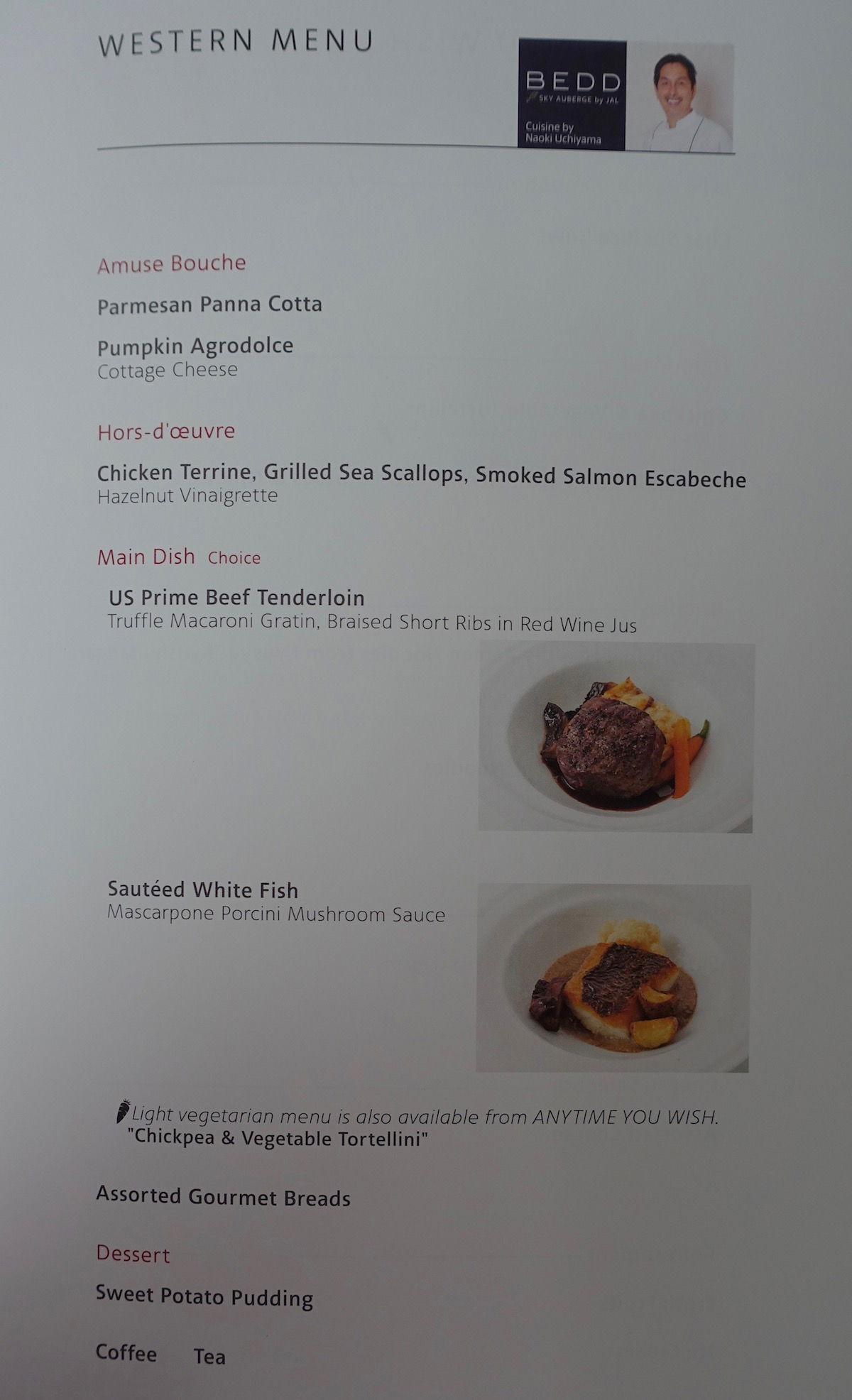
The drink list read as follows:
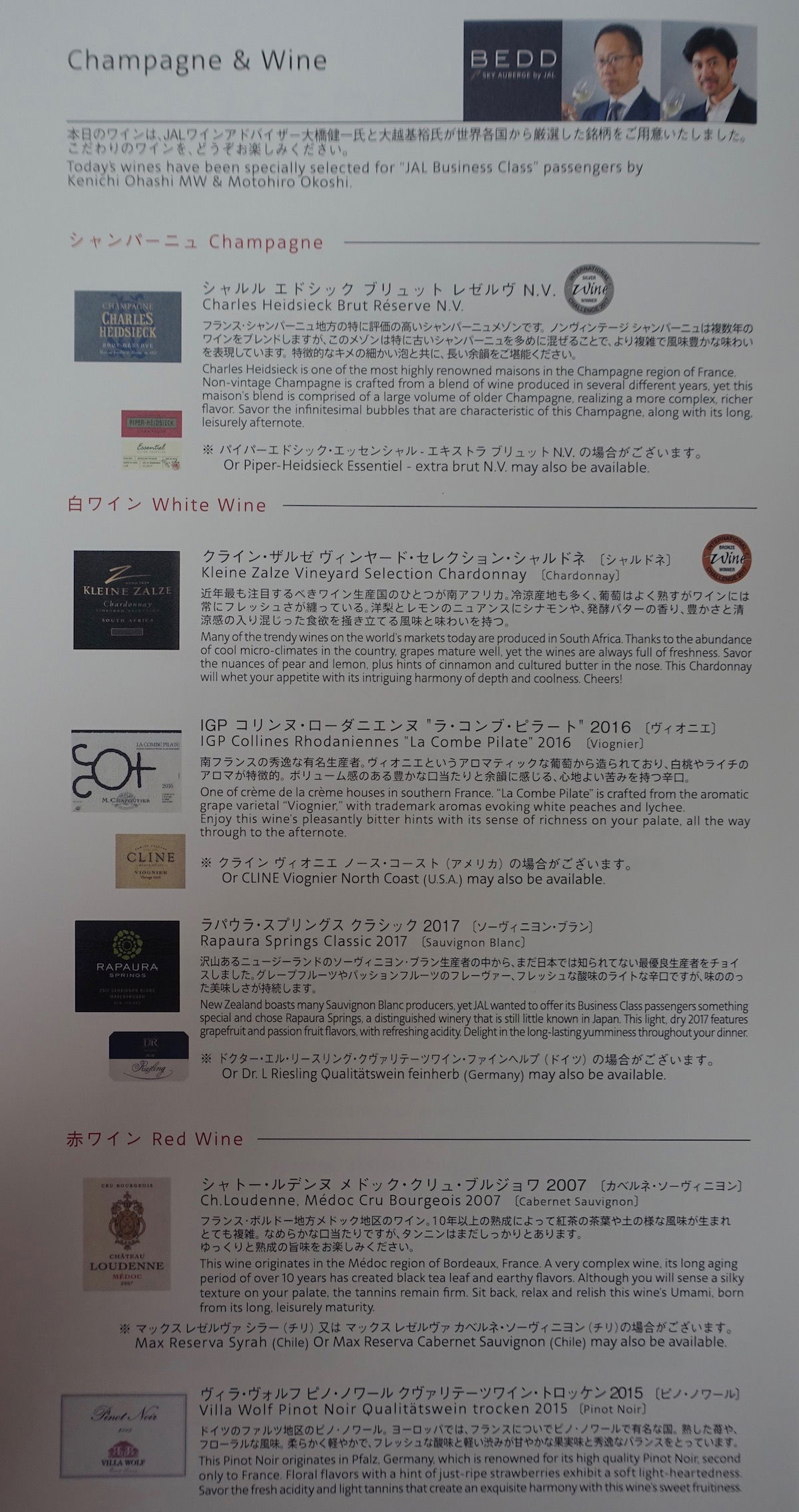
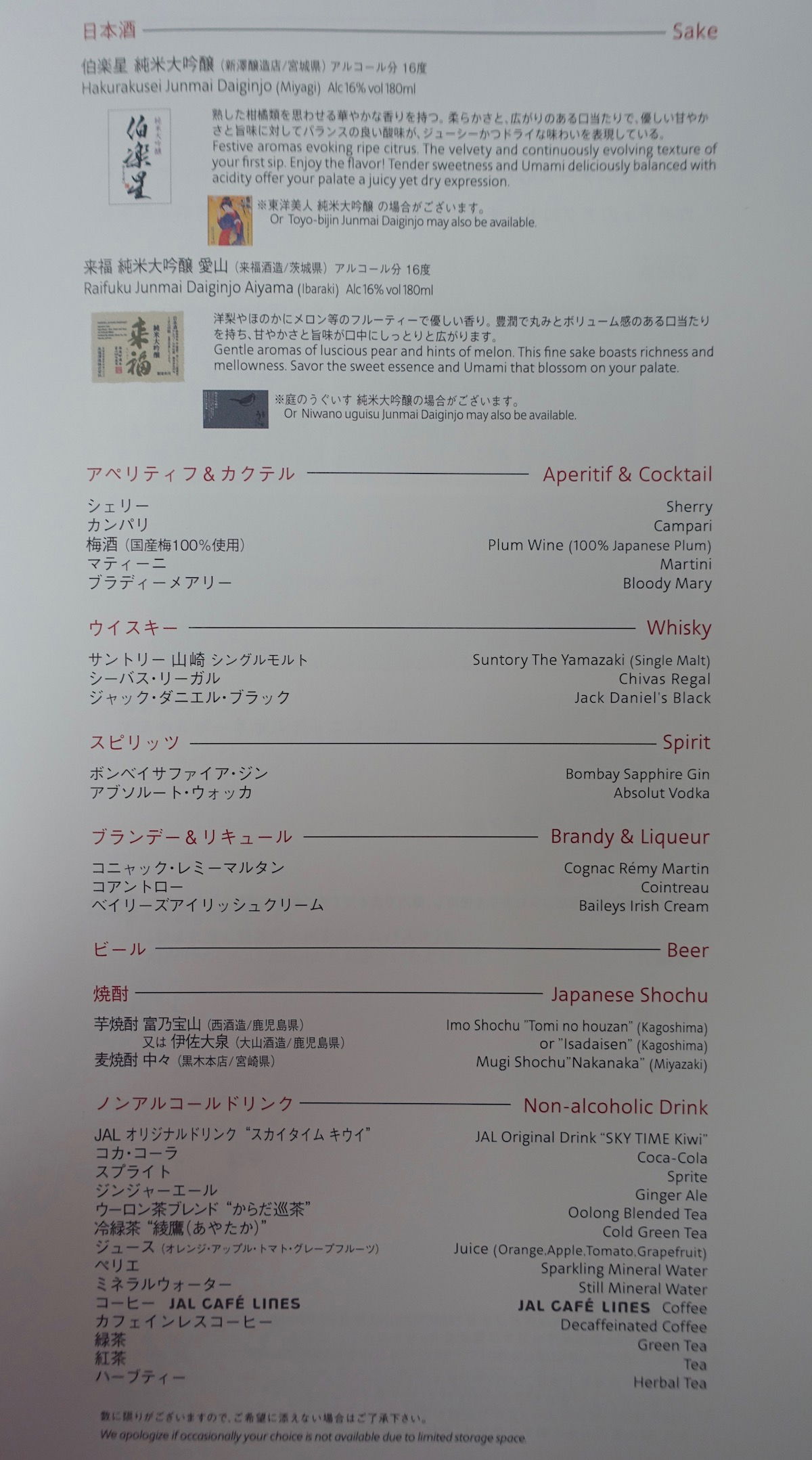
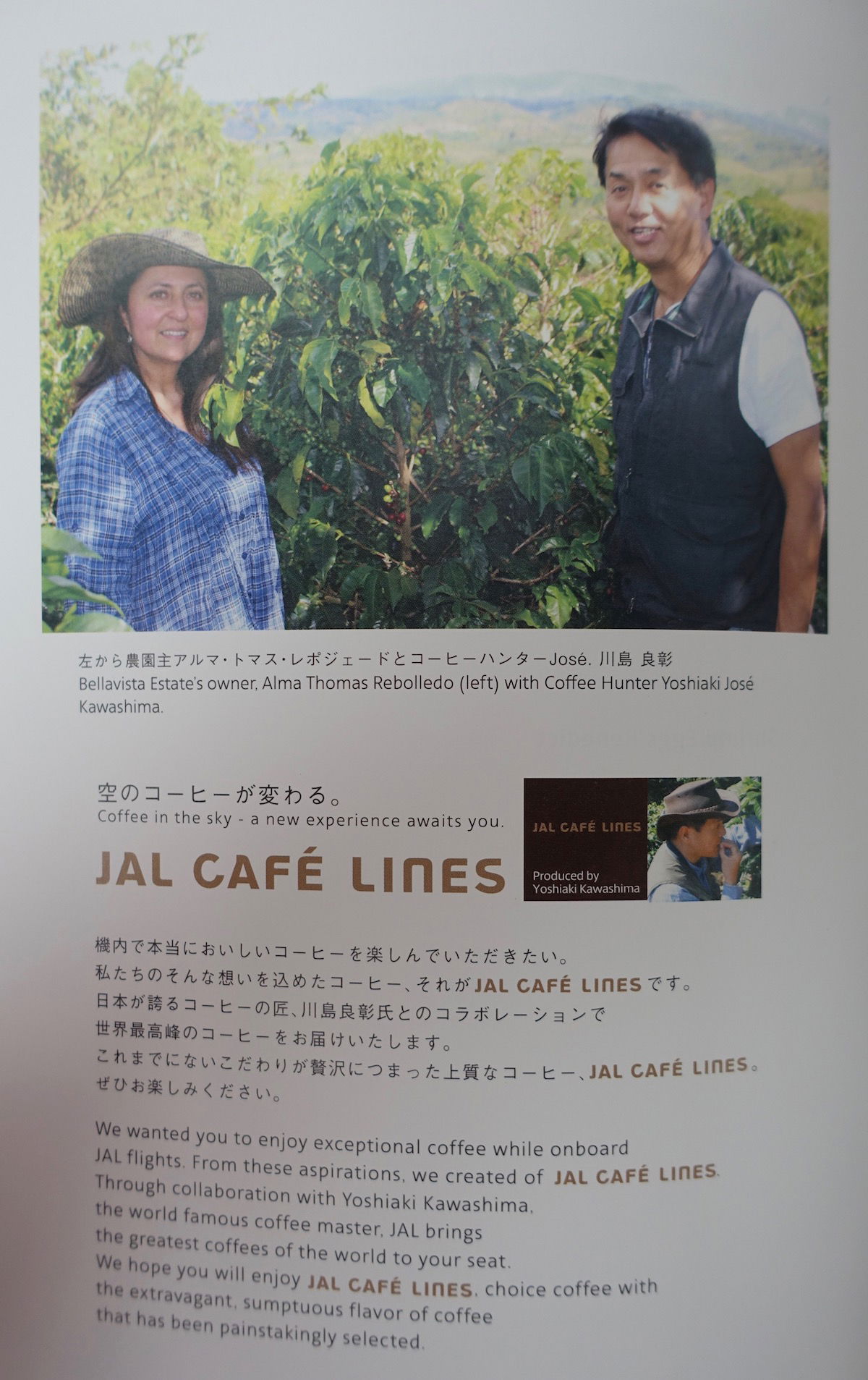
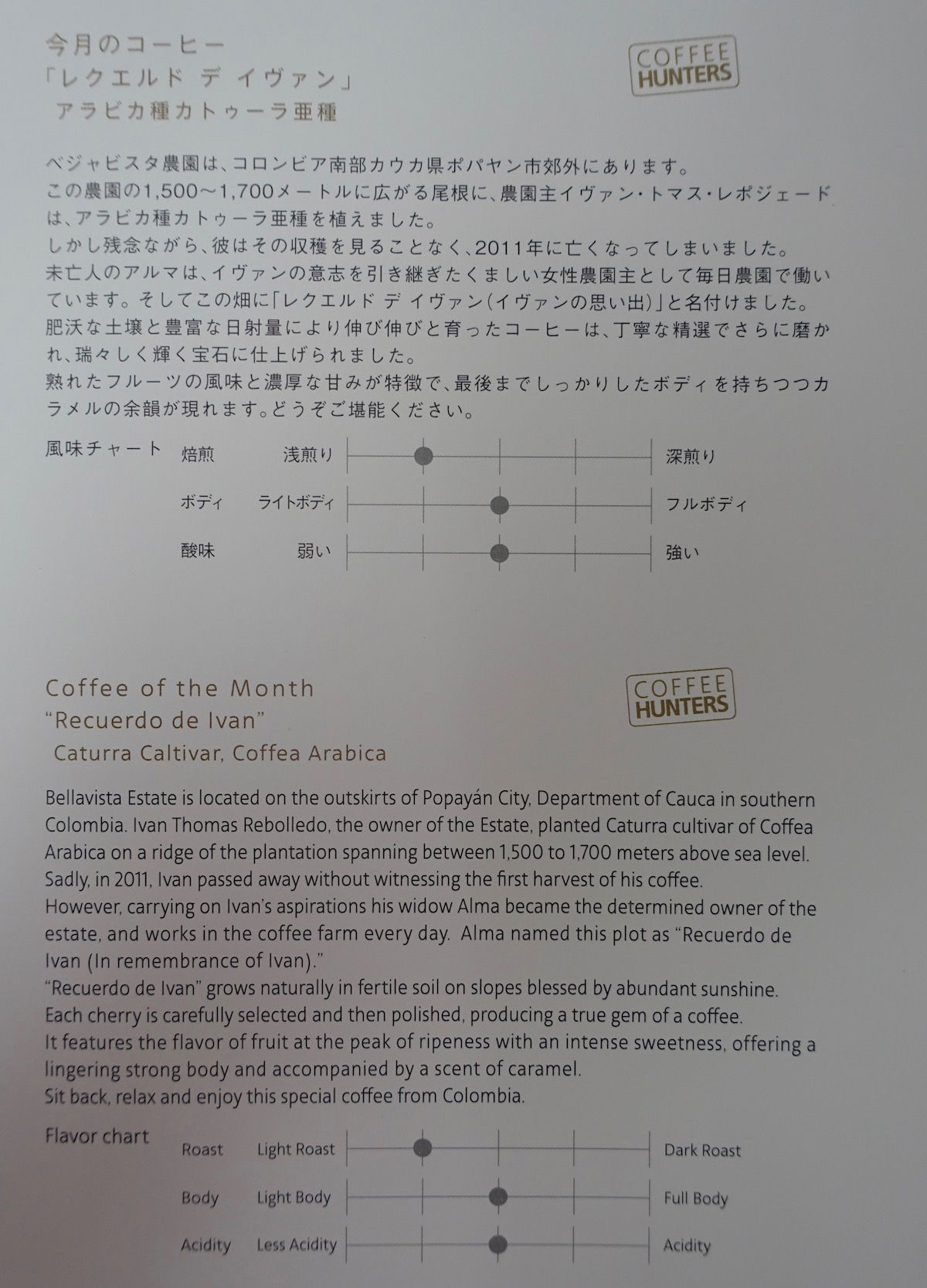
Just under an hour after takeoff the first drink was served, along with the amuse bouche. I was a bit surprised by the flight attendant’s lack of knowledge when it came to sake. I asked for the driest sake, and she didn’t seem to have a recommendation. Fortunately I enjoyed the sake that I randomly decided on.
The first drink was served with an amuse bouche, which consisted of parmesan panna cotta and pumpkin agrodolce with cottage cheese. The parmesan panna cotta also had pork, which I don’t eat, but otherwise it was tasty.
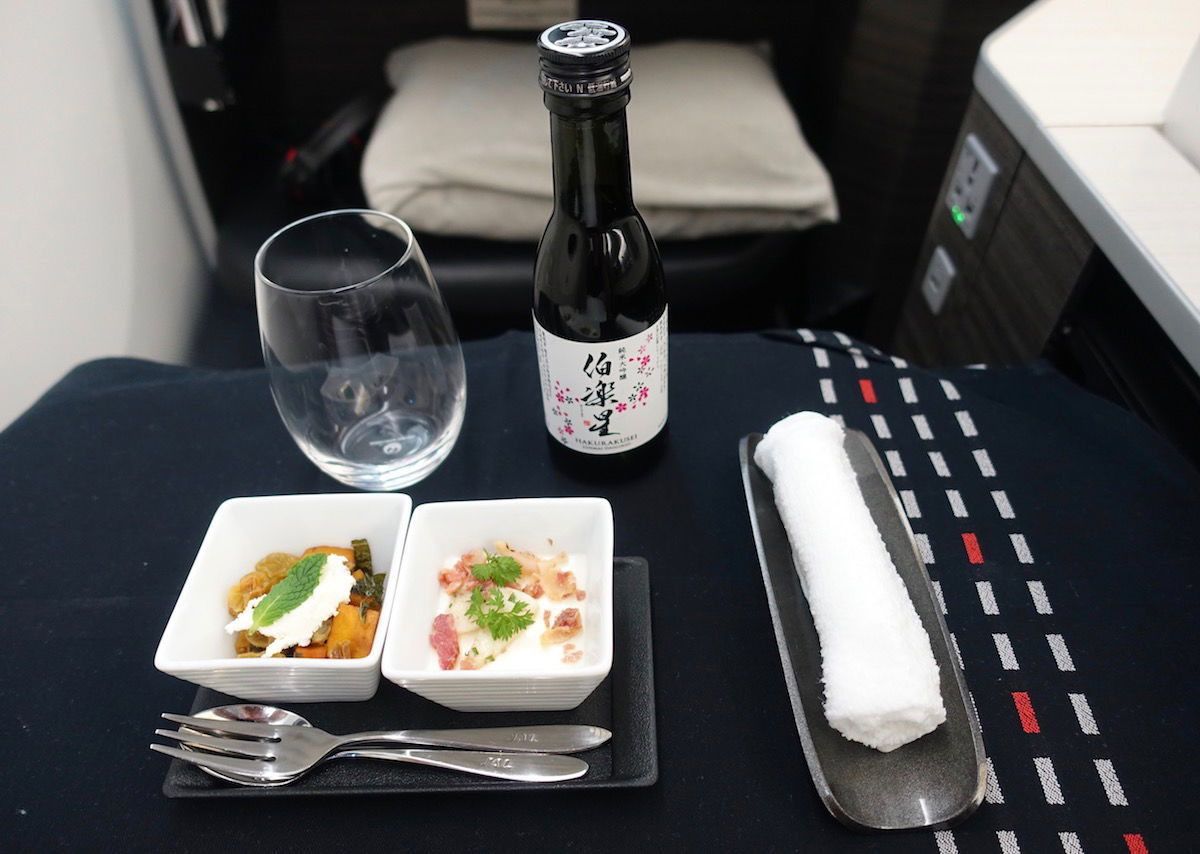
Japan Airlines business class amuse bouche
About 15 minutes later the starter was served. I wanted to sample both the Western and Japanese menu, so deferred to Ford as to which he preferred. He ended up having the Japanese, while I had the Western, though I tried a little bit of everything.
My starter consisted of chicken terrine, grilled sea scallops, and smoked salmon escabeche, with hazelnut vinaigrette. The dish was totally fine but nothing special, though personally I didn’t like the way the dressing was presented on the plate.
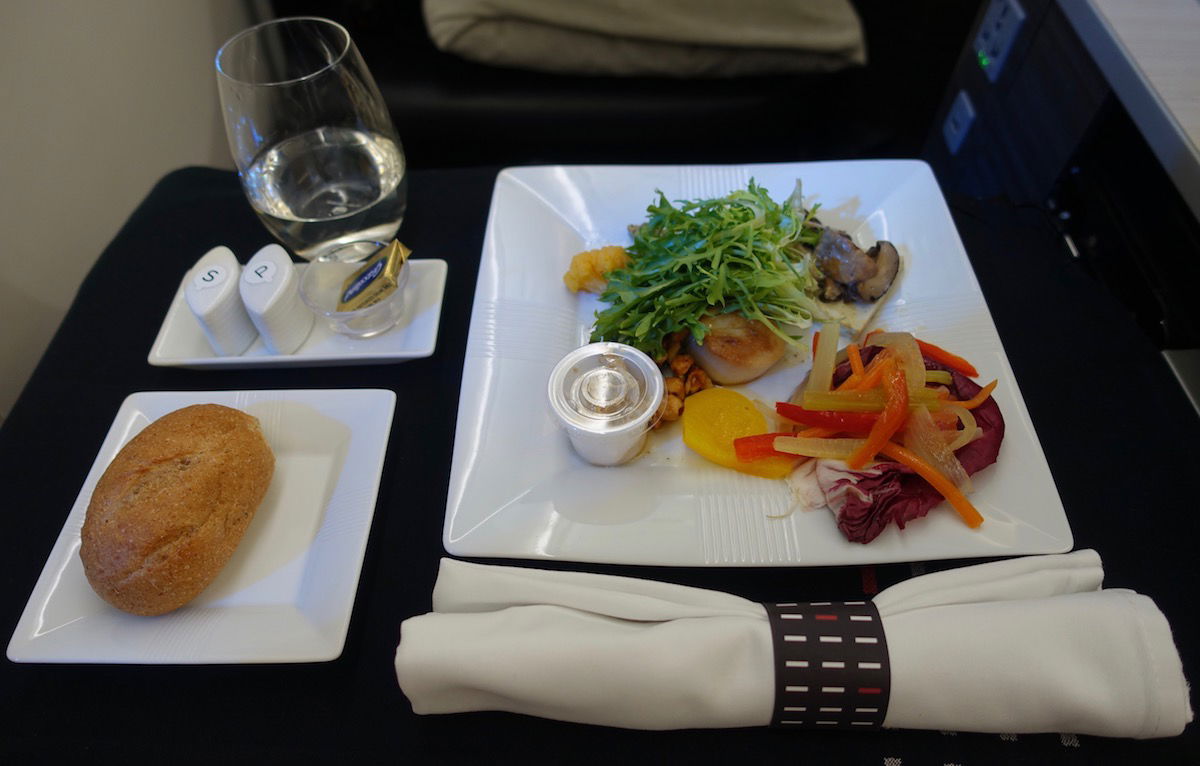
Japan Airlines business class hors d’oeuvre
Ford’s starter was much better, and included:
- Radish & carrot in vinegar sauce with salmon roe
- Fish cake sweet-simmered in sweet potato simmered shrimp kelp roll (that’s a lot of simmering!)
- Potato salad rolled with smoked salmon
- Tuna with egg yolk vinegar
- Simmered beef, burdock and egg
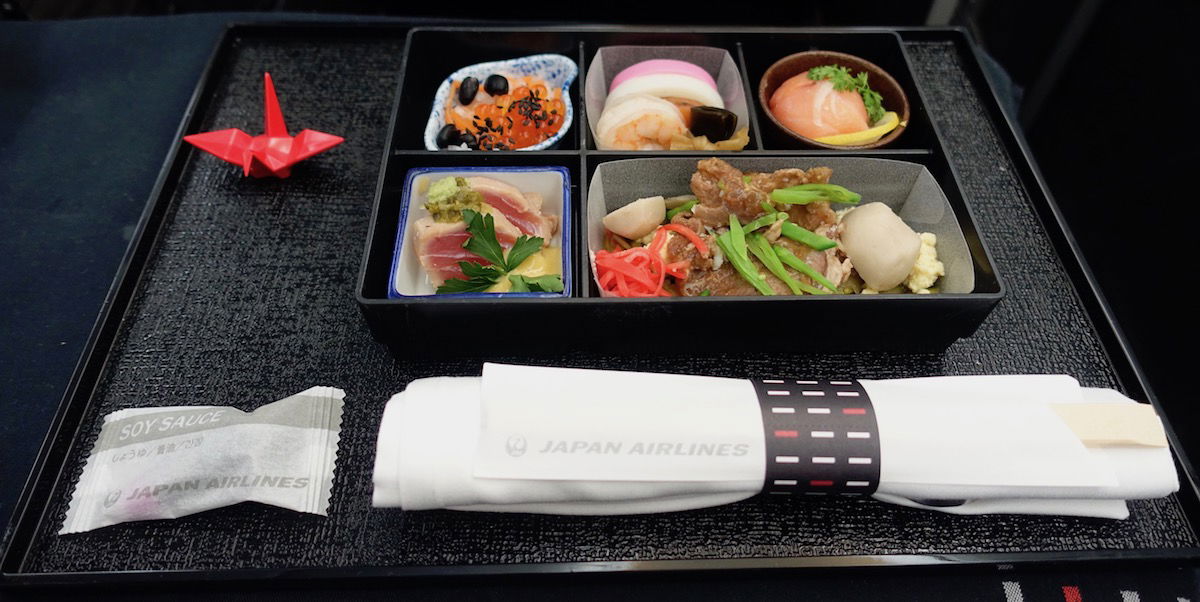
Japan Airlines business class Japanese meal
It was about 40 minutes between when the starter and main were served. For the main course I ordered the sautéed “white fish” with mascarpone porcini mushroom sauce, which was good.
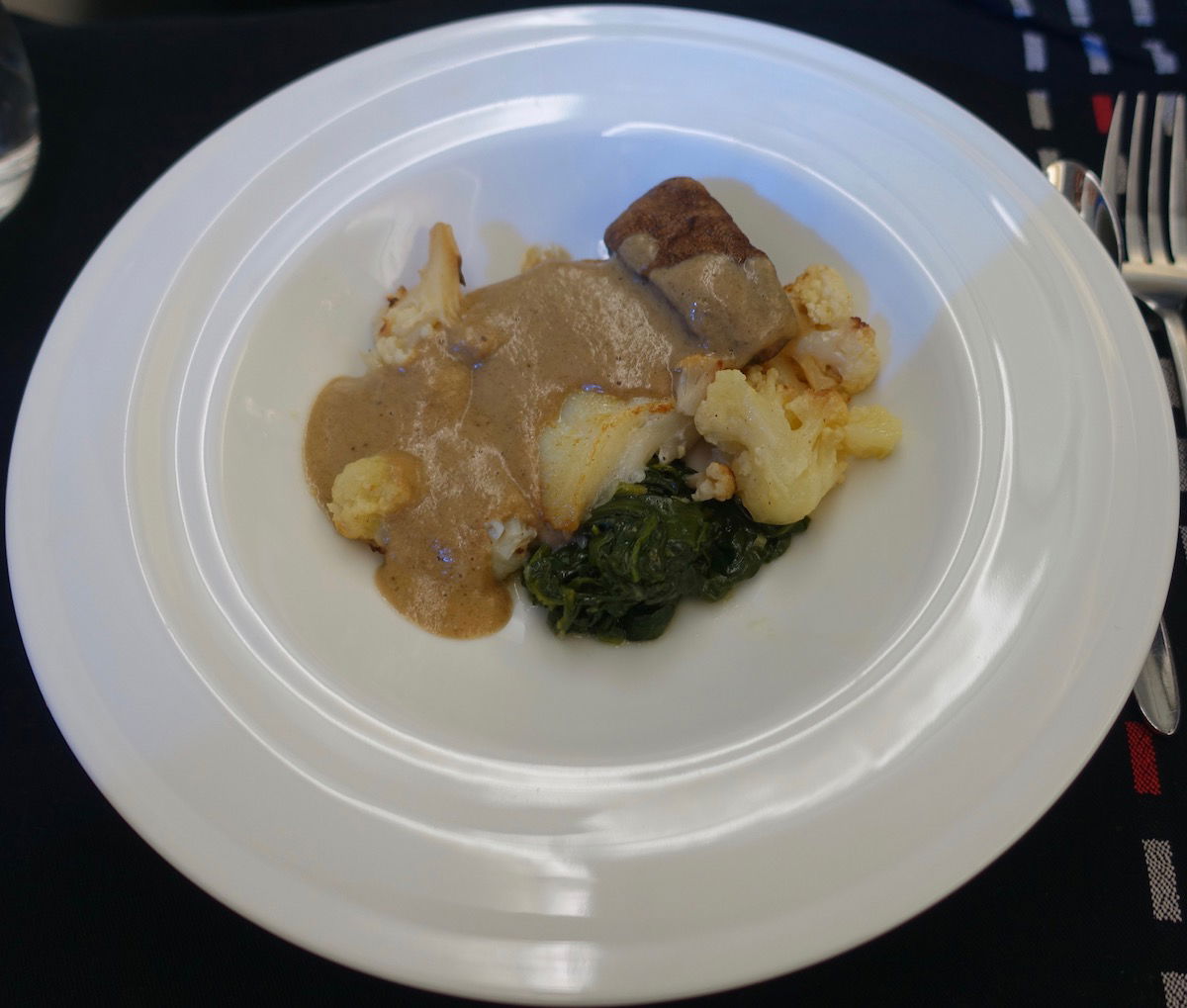 Japan Airlines business class Western meal
Japan Airlines business class Western meal
Ford’s main consisted of simmered chicken sukiyaki style and grilled salmon with Japanese style tartar sauce, as well as miso soup and Japanese pickles.
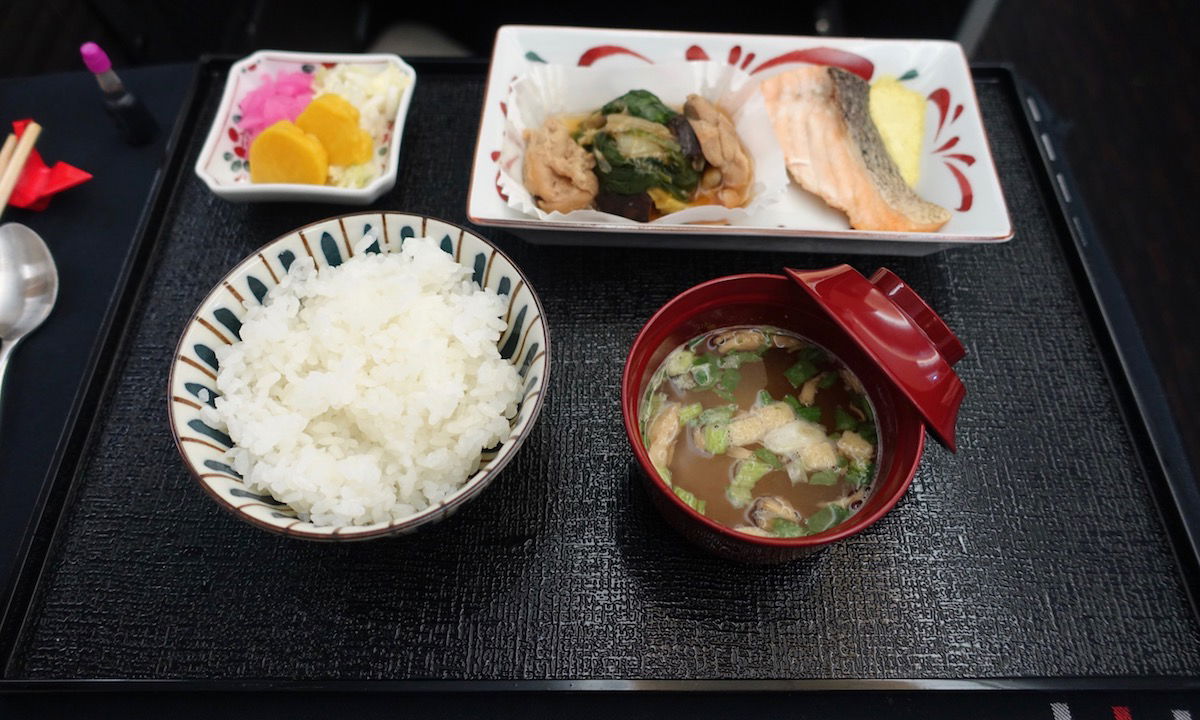
Japan Airlines business class Japanese meal
We were quite enjoying the sake, and decided to try a different one with our main course.
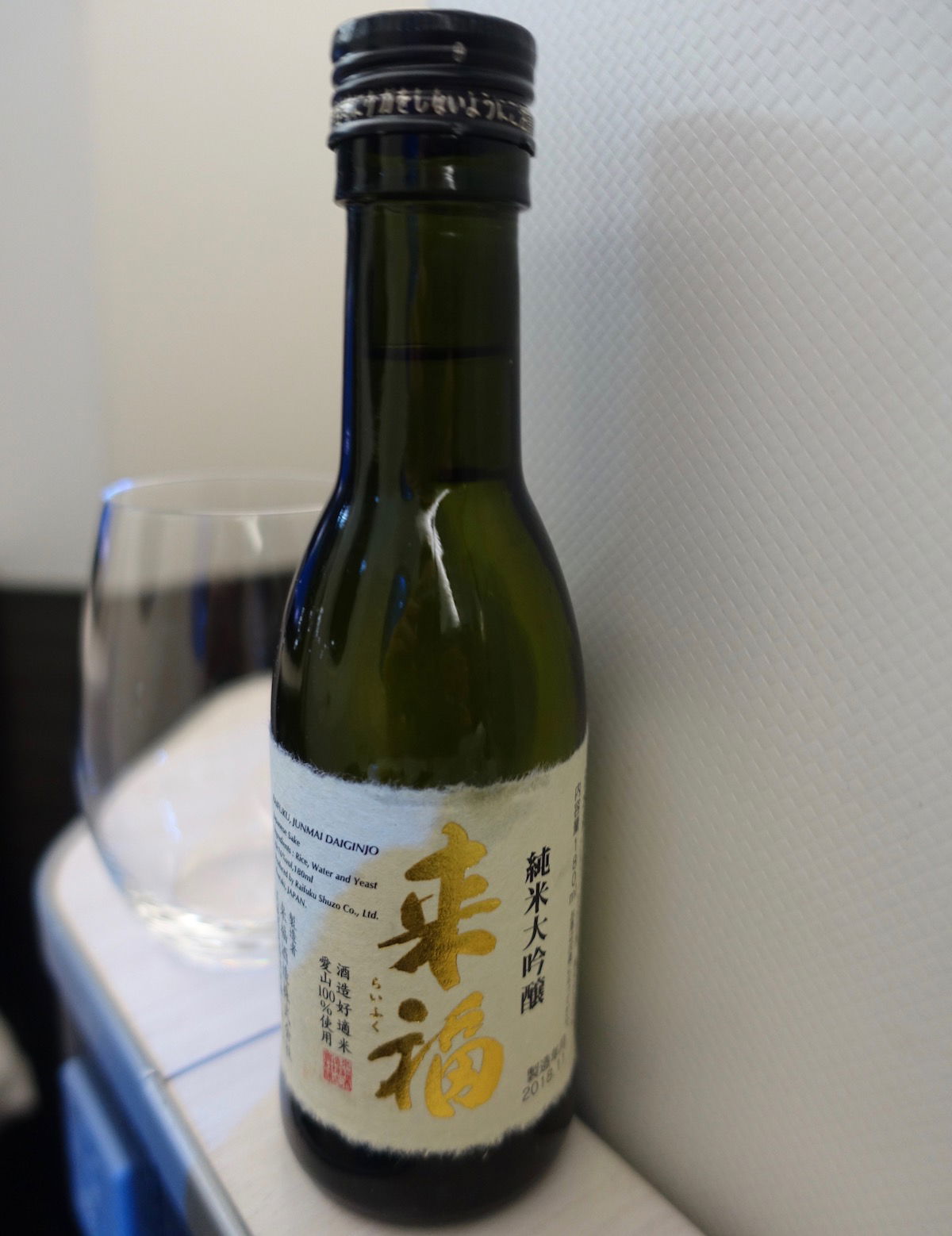
Japan Airlines business class sake
The dessert selection was limited, and for both the Western and Japanese menu consisted of sweet potato pudding. On the same trolley as the dessert they also offered coffee and tea.
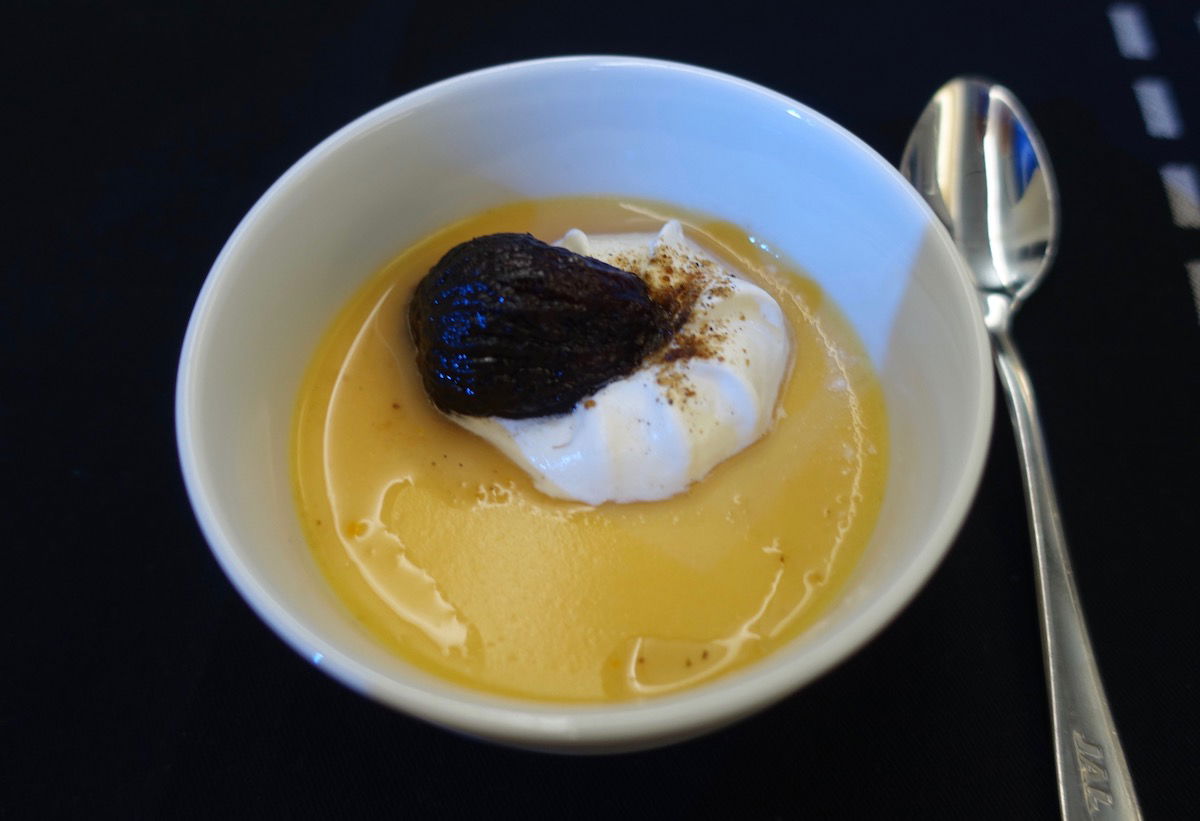
Japan Airlines business class dessert
Upon the conclusion of the meal we were offered bottles of water.
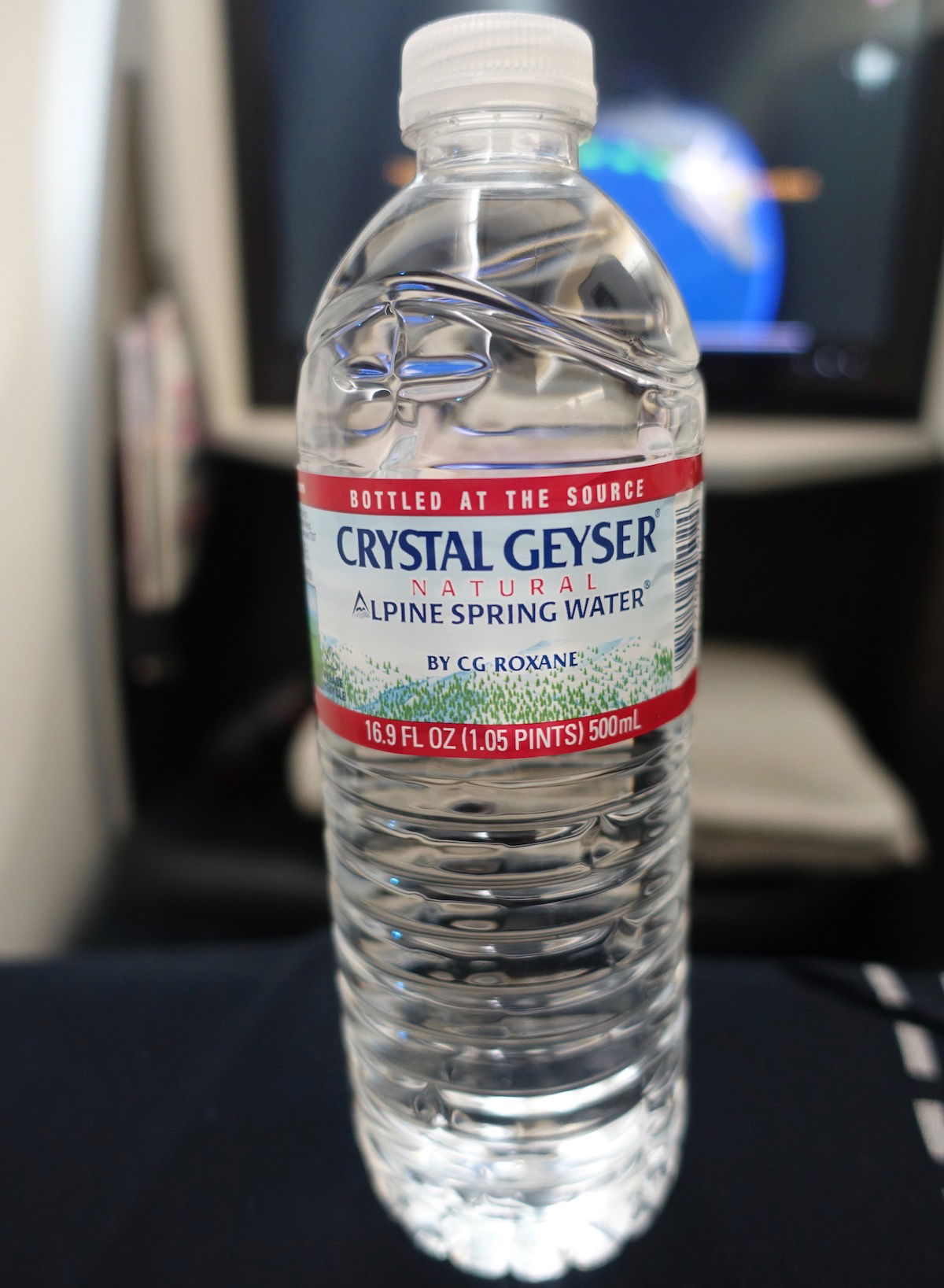
Japan Airlines business class bottled water
The meal service was concluded over two hours after takeoff, so was quite drawn out. That’s not really an issue, though, since this is a very long flight.
As far as the service goes, I’m trying to think of the best way to describe it. I was flying a Japanese airline, so of course service was good.
But I’d be lying if I didn’t say I found the service to be below average for a Japanese airline. Maybe the problem is that a few weeks prior I flew Japan Airlines first class and had an out-of-this-world-spectacular crew.
On this flight the crew just seemed to lack that x-factor that makes flying a Japanese carrier so special. They were friendly and they were well intentioned, but they just weren’t as attentive or infectiously adorable as I often find on Japanese airlines. For example, it would take them forever to clear trays, both during the main meal service, and also later in the flight when I ordered snacks.
Anyway I worked a bit longer, and soon enough we had some great views as we were traveling northwest.
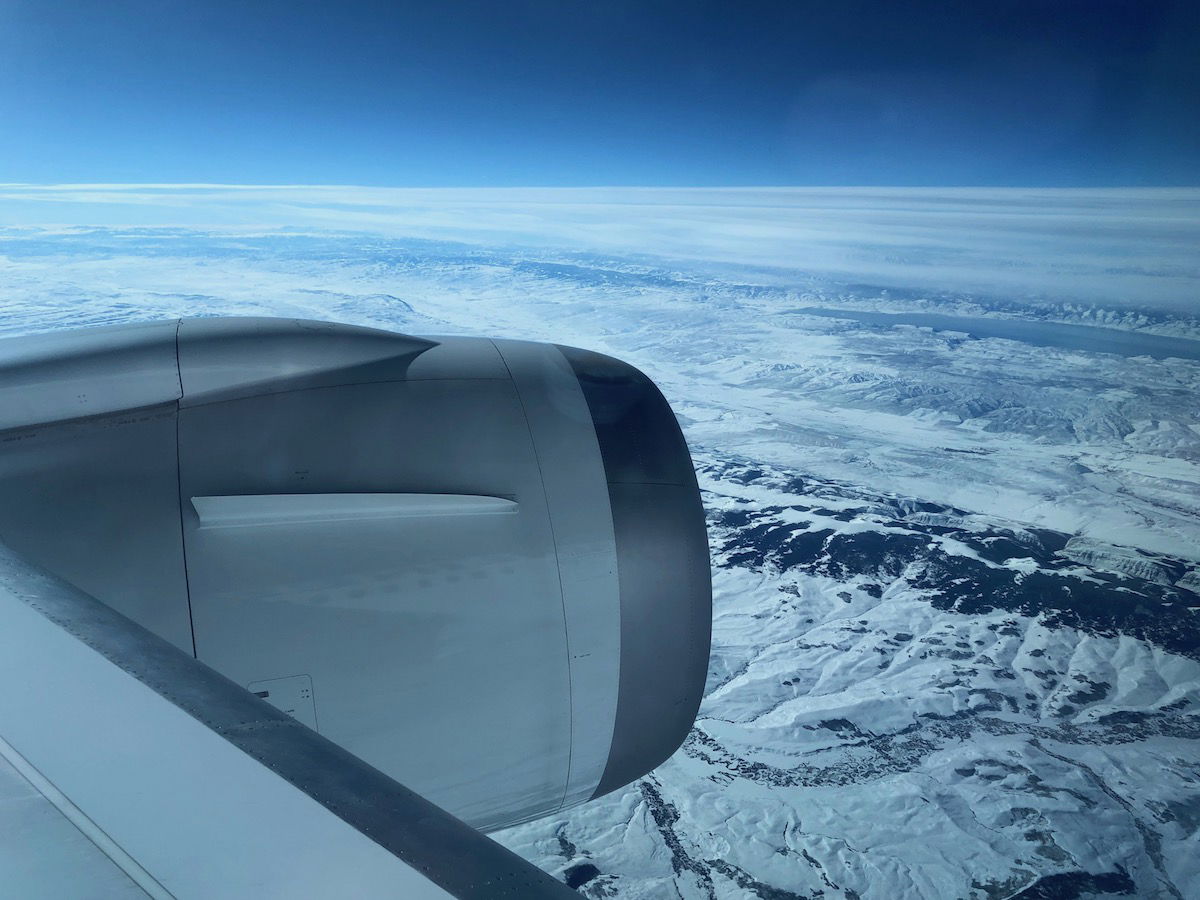 View enroute to Narita
View enroute to Narita
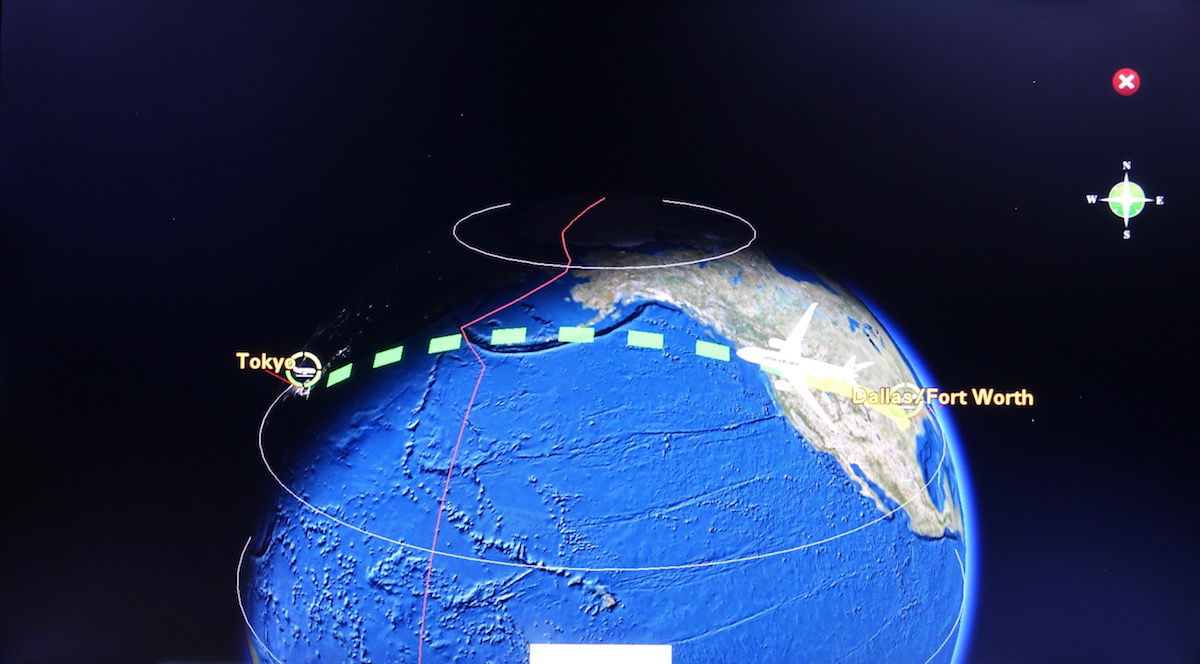 Moving map enroute to Narita
Moving map enroute to Narita
With just under 10 hours remaining inflight I asked to have my bed made, as I was hoping to get some rest.
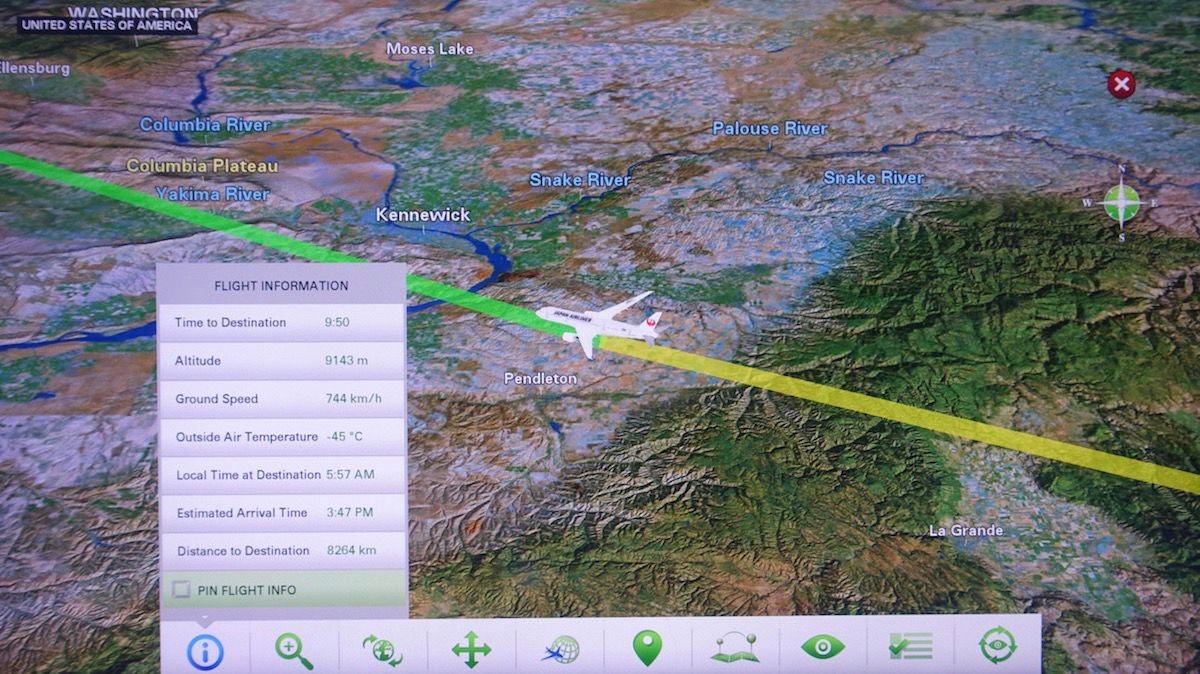
Moving map enroute to Narita
Japan Airlines has mattress pads in business class, which really help in terms of comfort. The Apex Suite window seat really is one of the most comfortable business class seats out there, especially in bed mode.
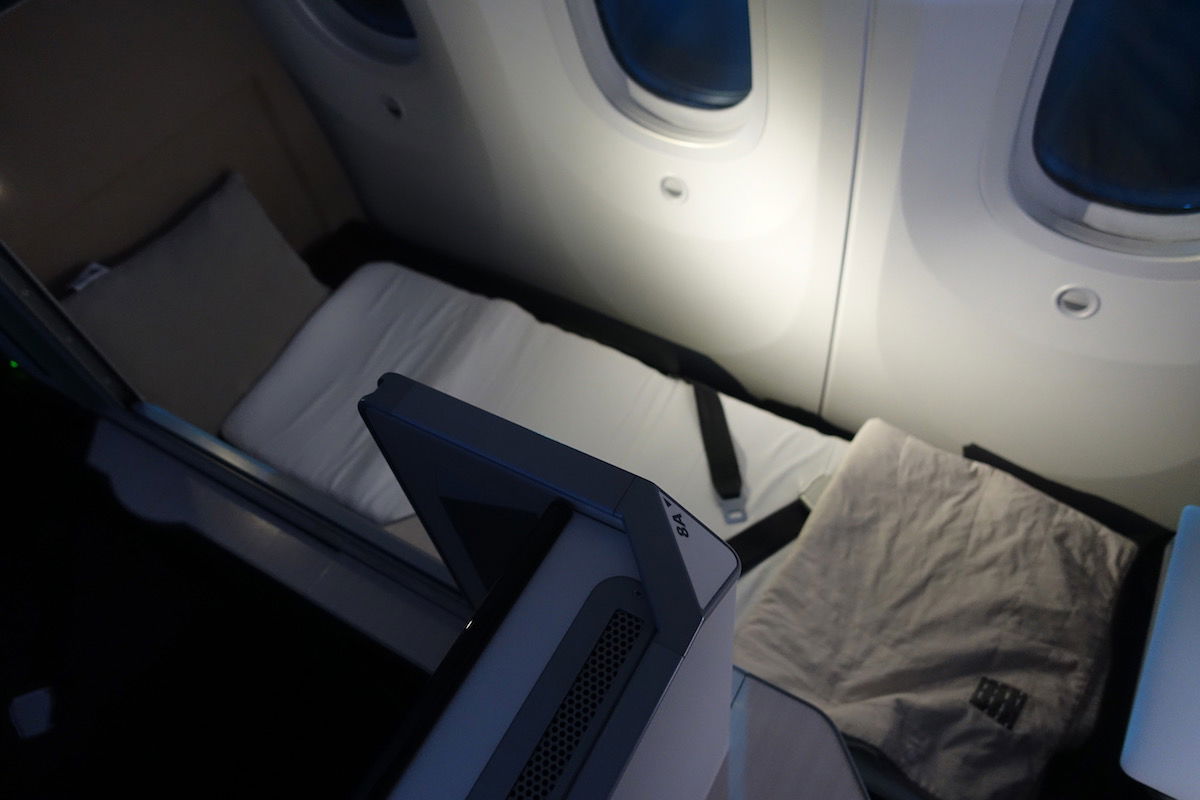 Japan Airlines business class bed
Japan Airlines business class bed
I’m always optimistic when it comes to sleeping on planes. I was hoping I’d sleep most of the way to Japan, but rather I got just under three hours of sleep, and woke up with just under seven hours remaining to Narita.
Unfortunately I found the cabin to be really warm due to the lack of air nozzles, which made it hard to sleep.
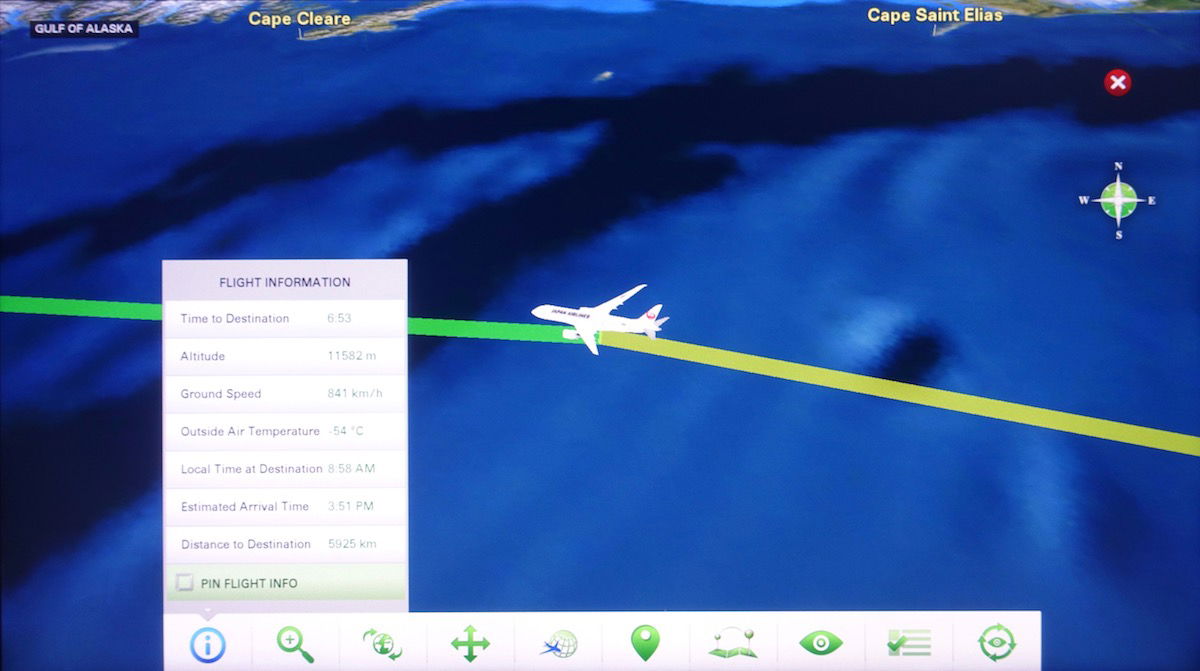
Moving map enroute to Narita
I worked for a bit longer, and then eventually ordered a coffee, as I realized my odds of going back to sleep were slim.
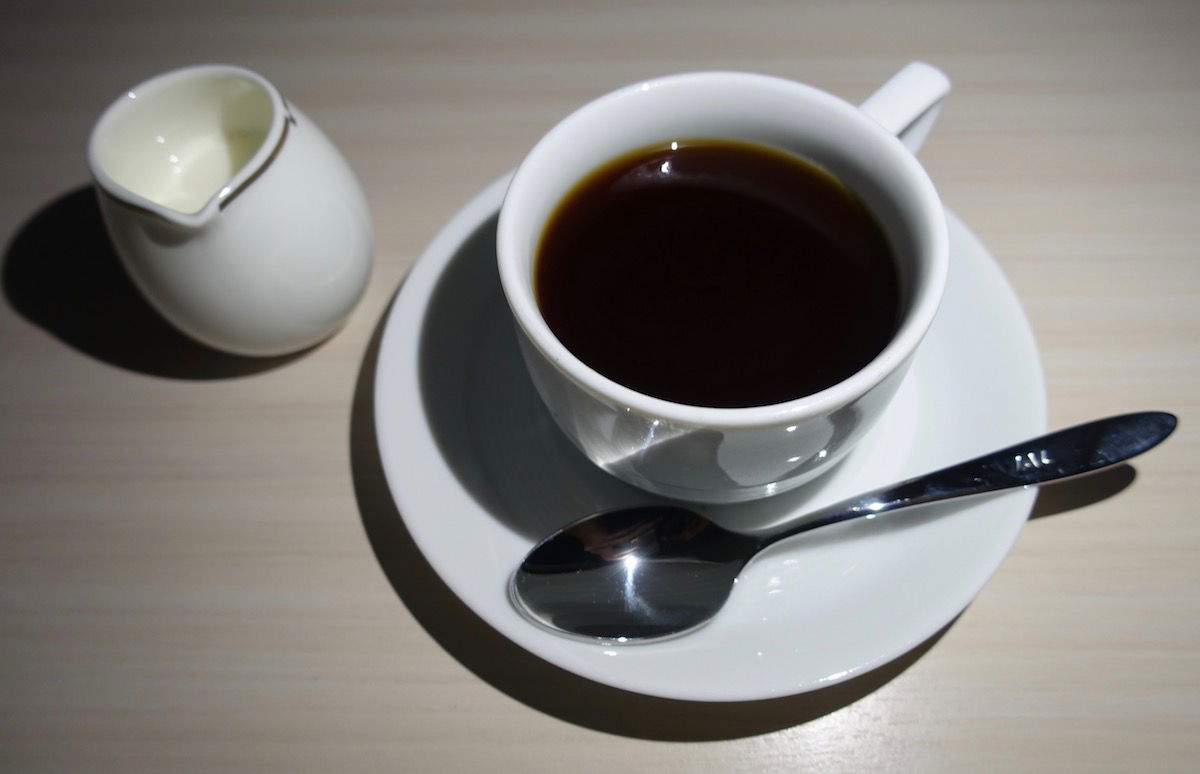
Japan Airlines business class coffee
While going to the lavatory I noticed a small snack bar set up in the galley between cabins, with some self serve wine, water, chocolate, and packaged snacks.
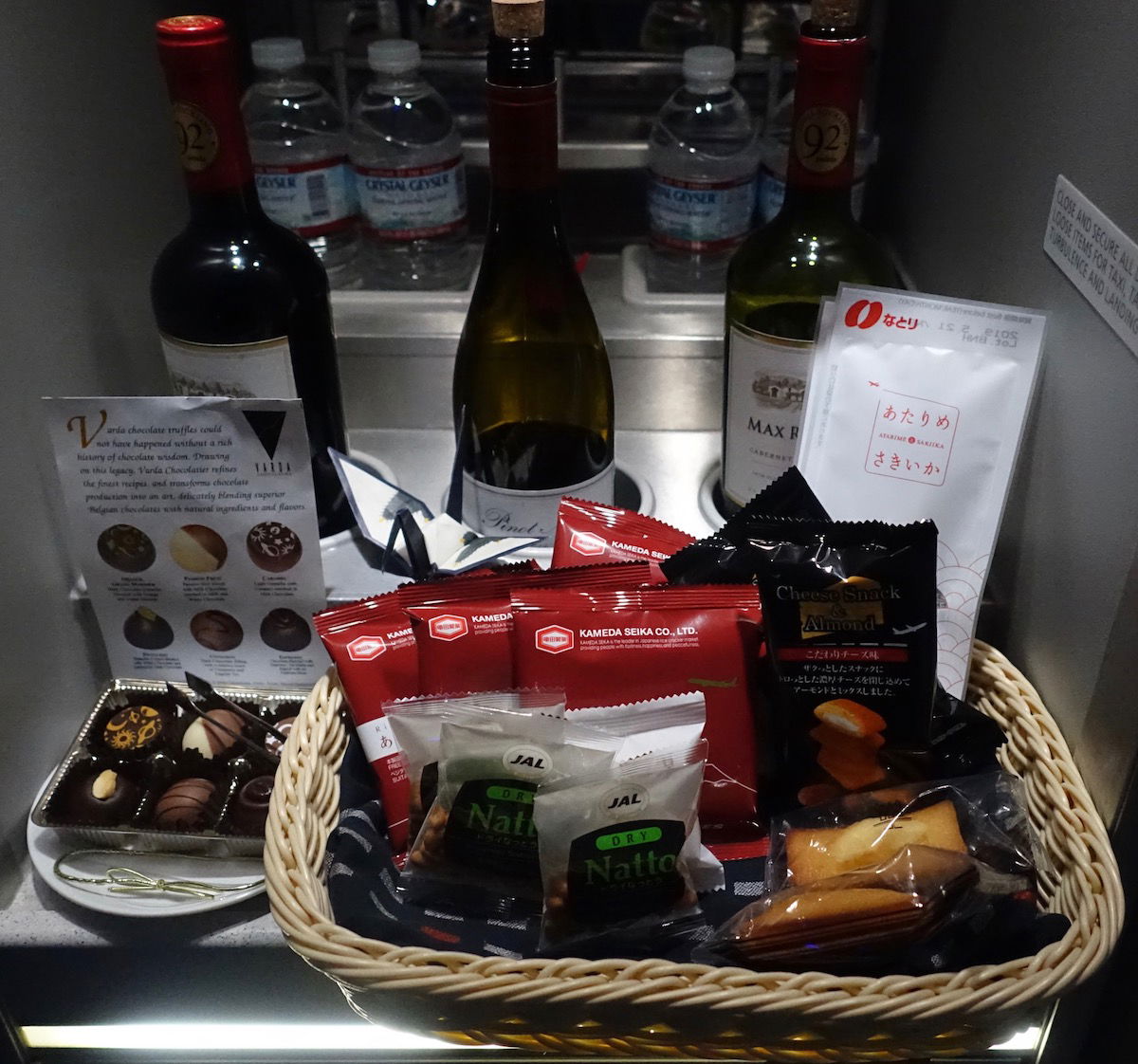
Japan Airlines business class snack bar
Eventually I was feeling a bit hungry so decided to order something off the “anytime” dining menu. While the first meal has set timing, the subsequent meal services are all on demand, and can be ordered anytime after the first meal service, up to 90 minutes before landing.
The menu read as follows:
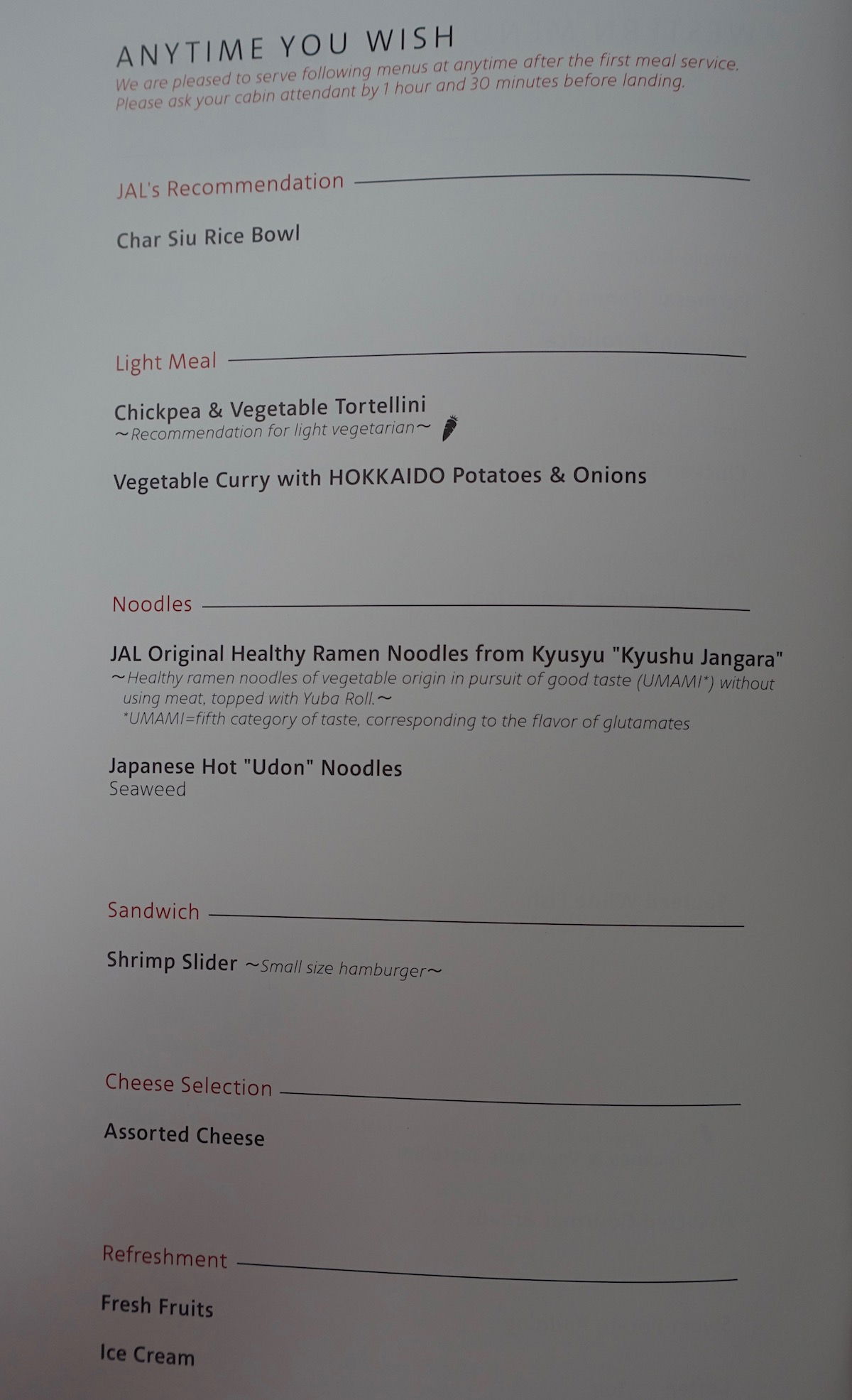
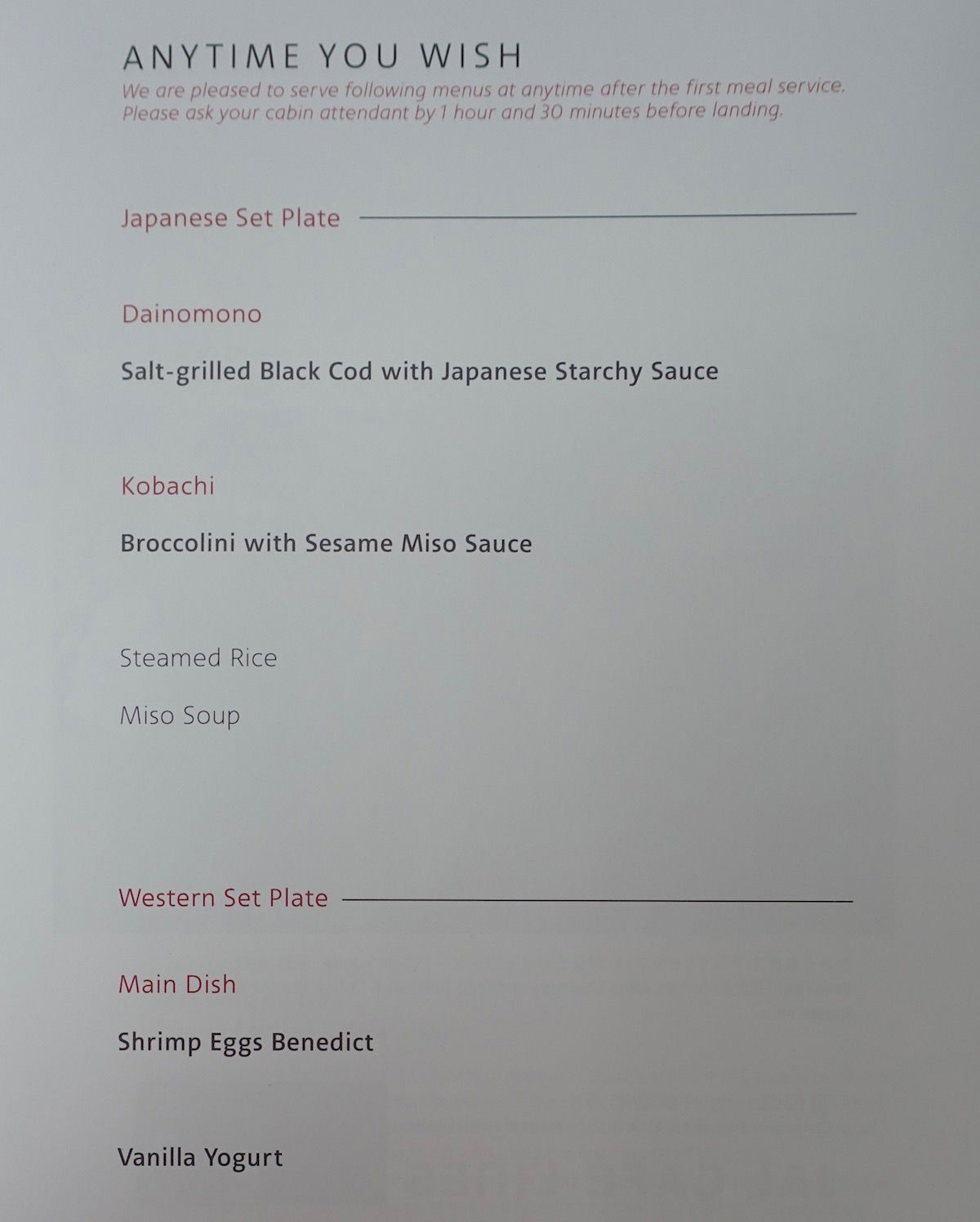
I decided to order the vegetable curry, which was exceptional. JAL’s curries are consistently great, in my experience.
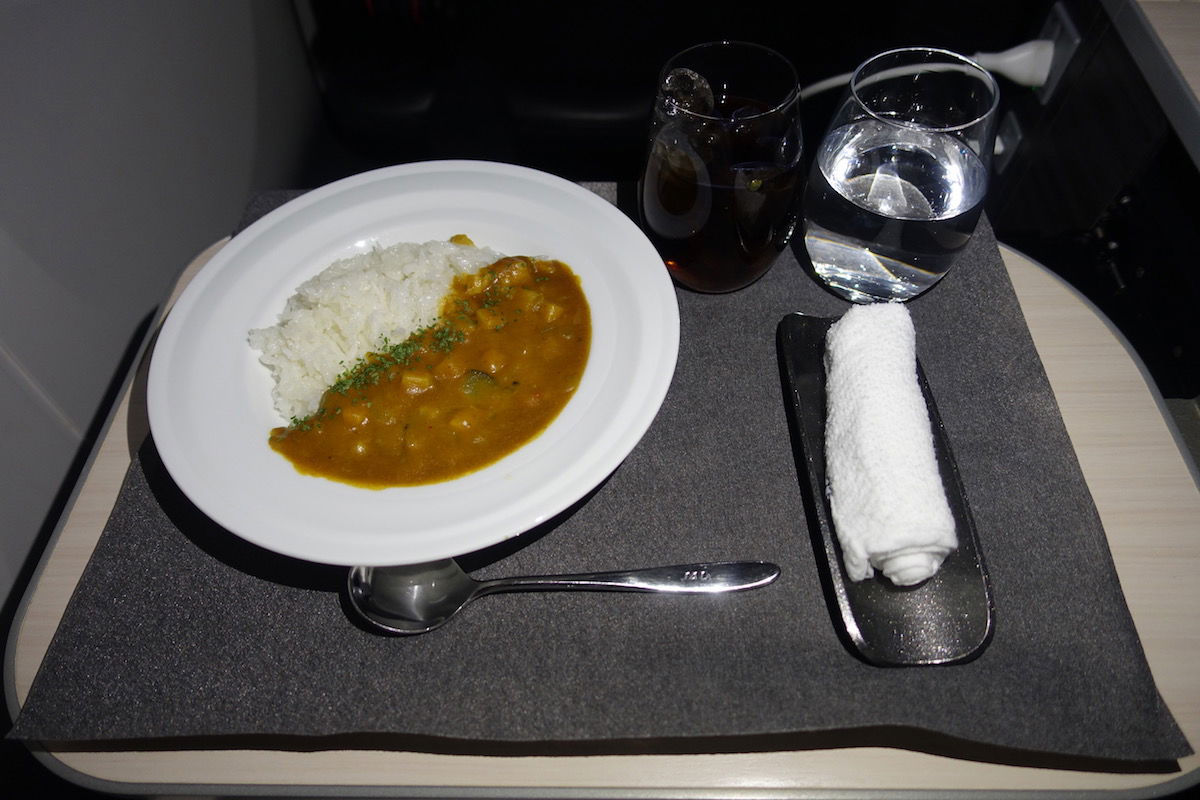 Japan Airlines business class snack
Japan Airlines business class snack
I also ordered some ice cream, which consisted of a vanilla Haagen-Dazs tub.
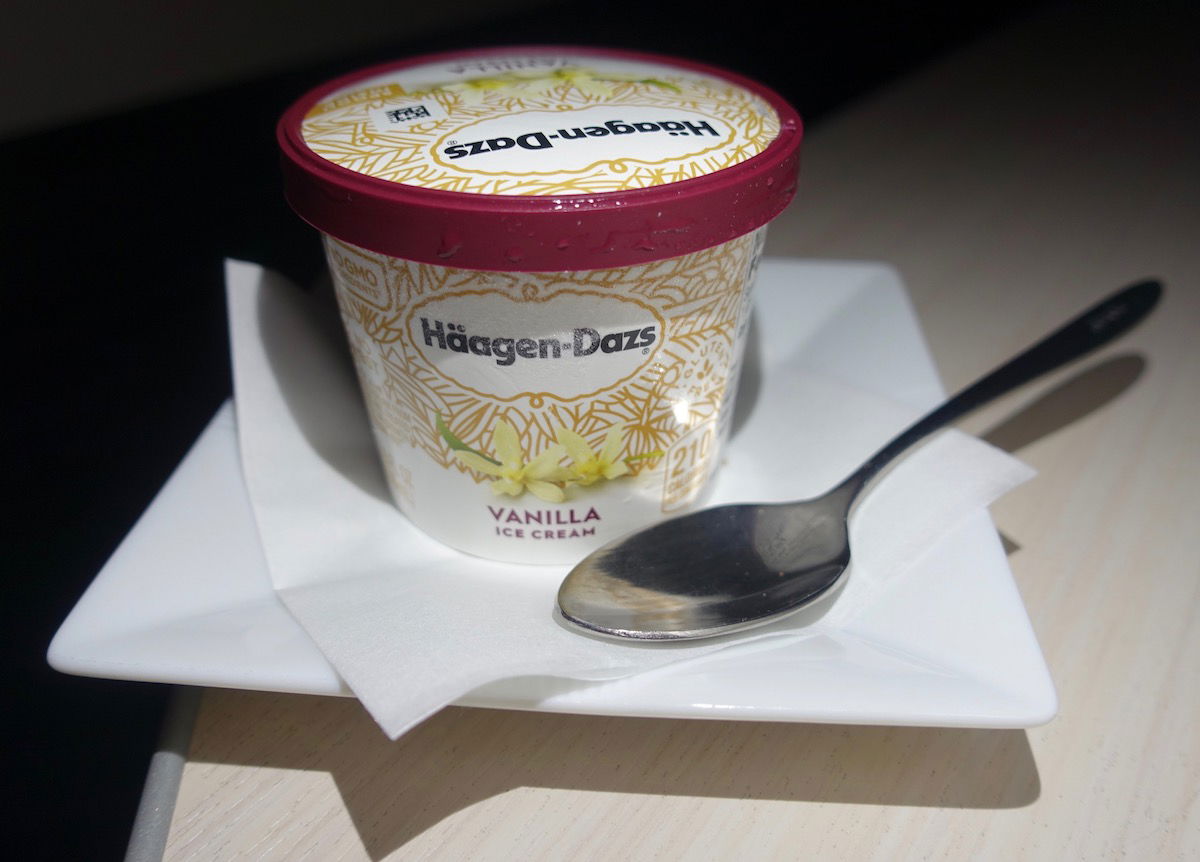
Japan Airlines business class snack
Ford woke up a short while later and ordered the Japanese set plate, consisting of salt-grilled black cod with Japanese starchy sauce, and broccolini with sesame miso sauce.
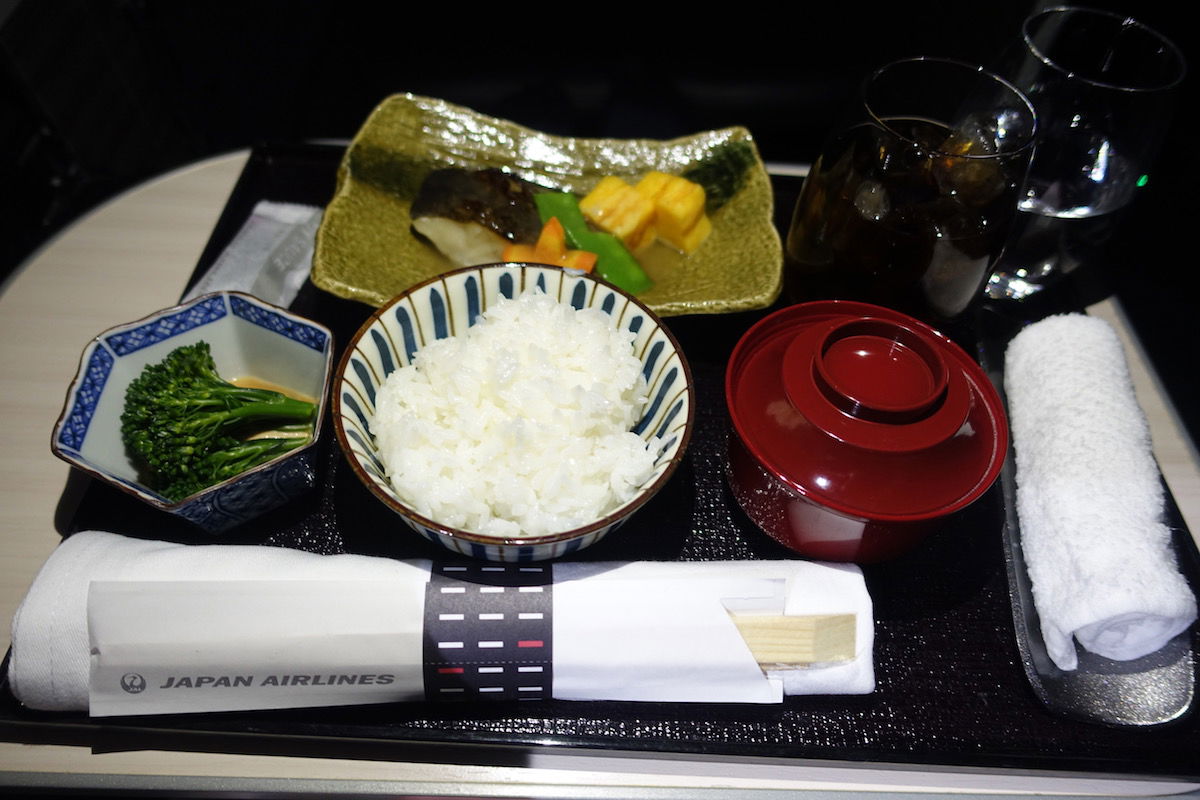
Japan Airlines business class snack
For the remainder of the flight I kept trying to go back to sleep, though ultimately failed, so ended up just working for most of the flight. So after spending many more hours working, just over 90 minutes before landing I ordered the pre-landing snack.
At this point the menu was quite limited, so I ordered the shrimp eggs benedict, which was quite good. It came with a side of yogurt with blueberries, and I drank another coffee.
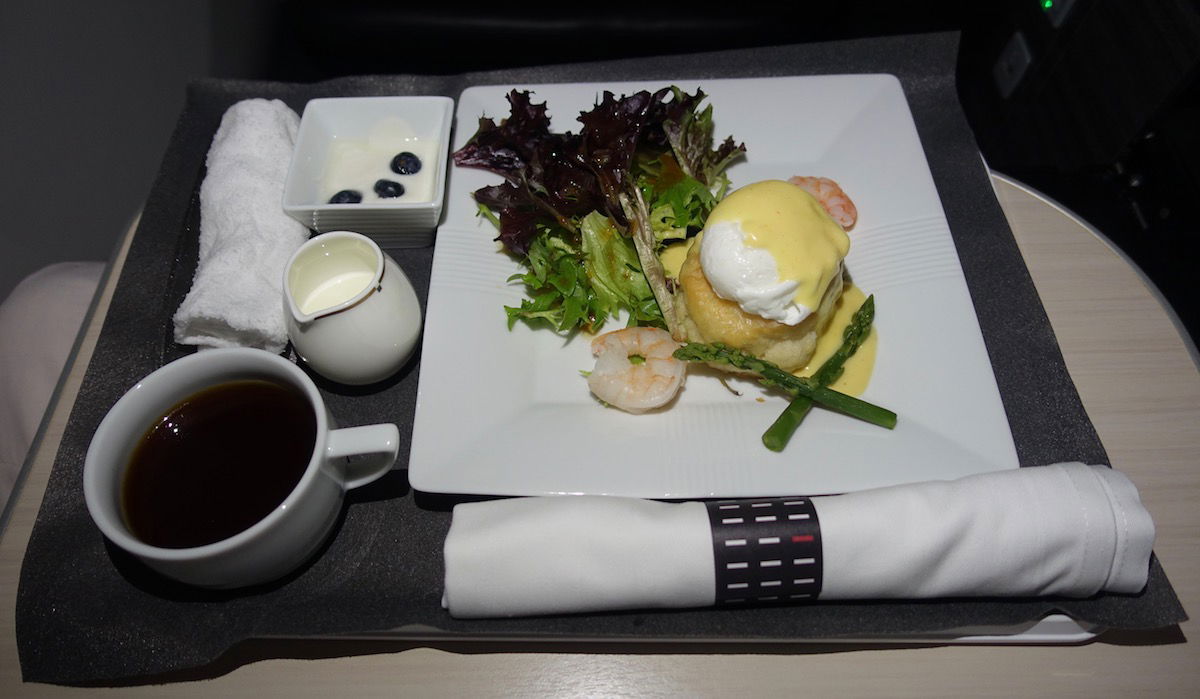 Japan Airlines business class pre-landing meal
Japan Airlines business class pre-landing meal
Ford managed to nap a bit more (I’m jealous!), and woke up about 80 minutes out. He was hungry at that point so tried to order something. LOL amateur move if he thought that was going to work, given that they stop serving food 90 minutes out.
In fairness, he had never been to Japan before, and didn’t realize that 90 minutes means 90 minutes… not 89min59sec, or anything less.
Towards the end of the flight I enjoyed the view out the window, as most people in the cabin started to wake up, meaning the windows could be undimmed.
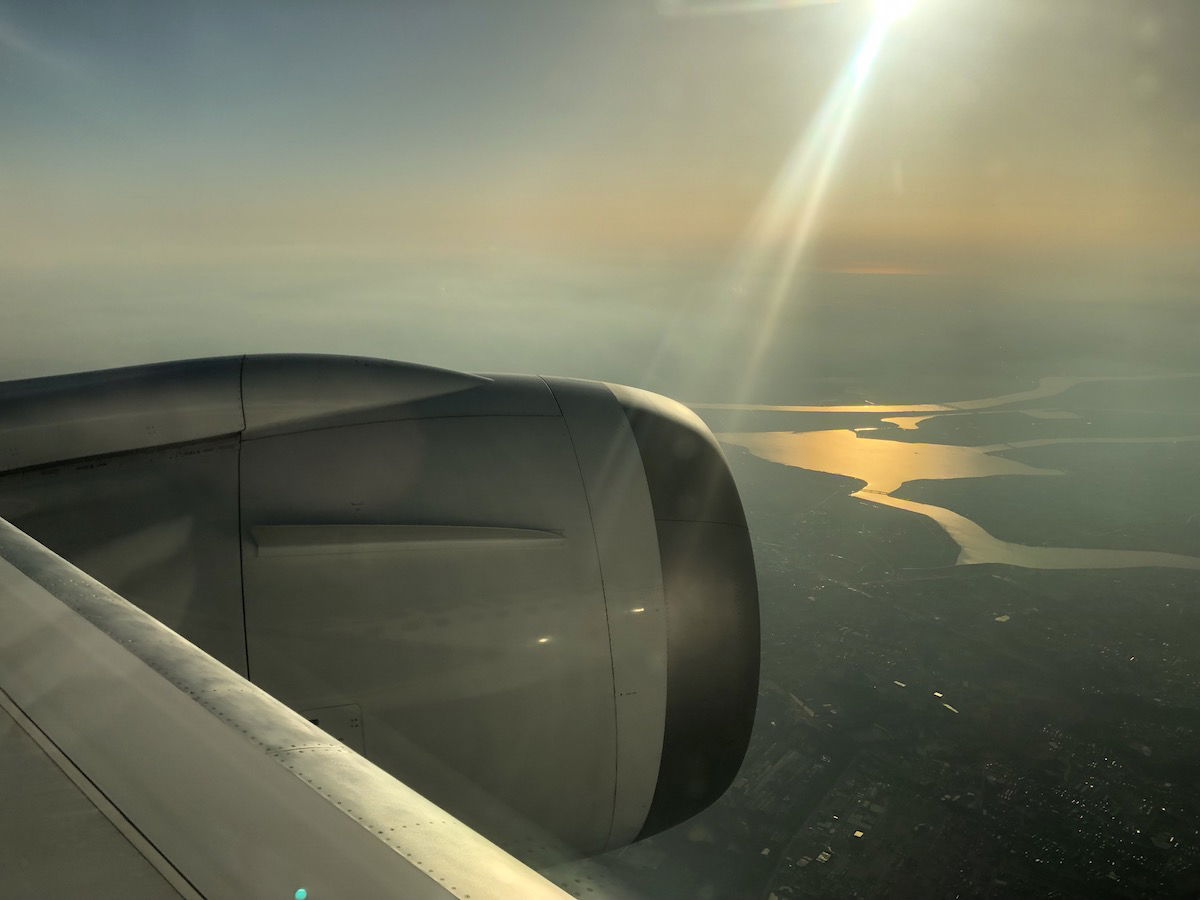 View approaching Narita
View approaching Narita
There were no announcements from the cockpit, other than that 20 minutes before arrival the pilots announced for the cabin crew to prepare the cabin for landing.
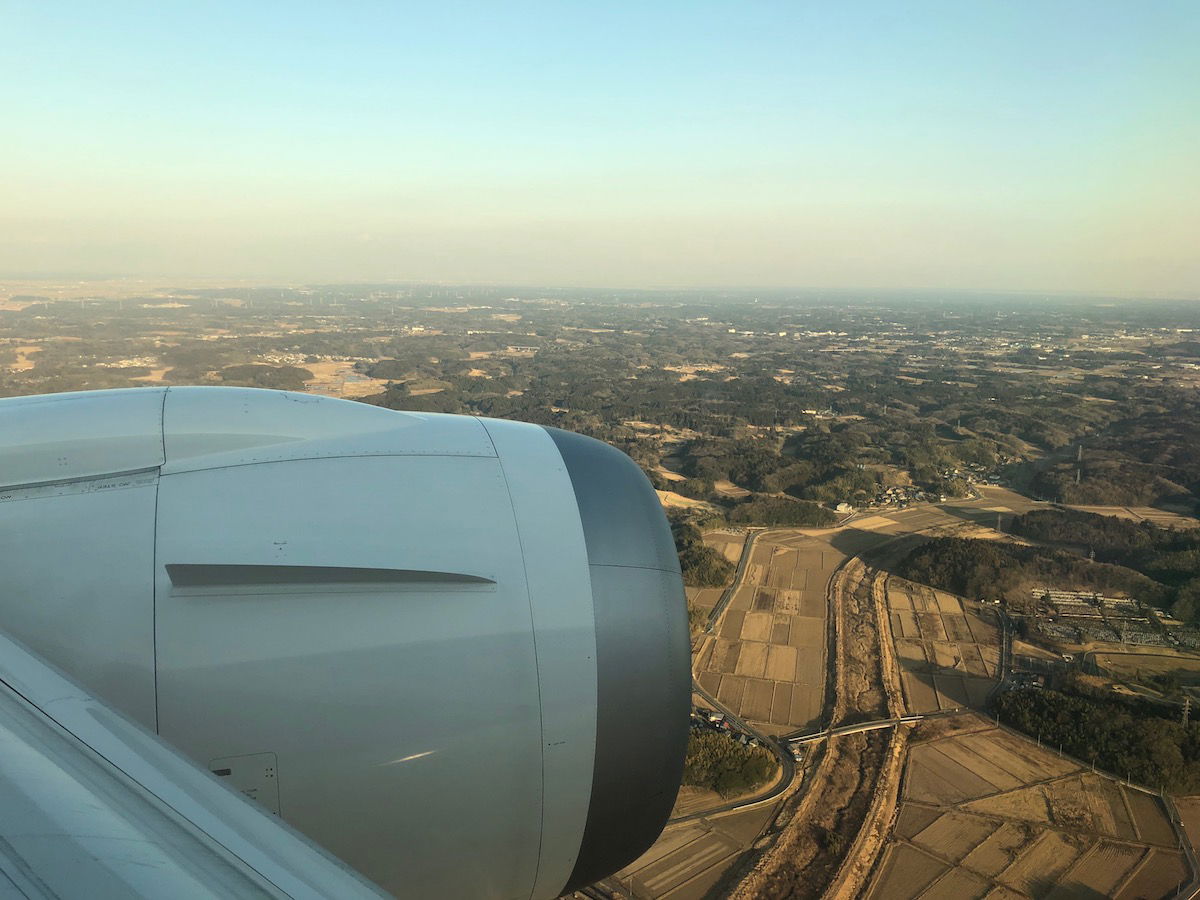
View approaching Narita
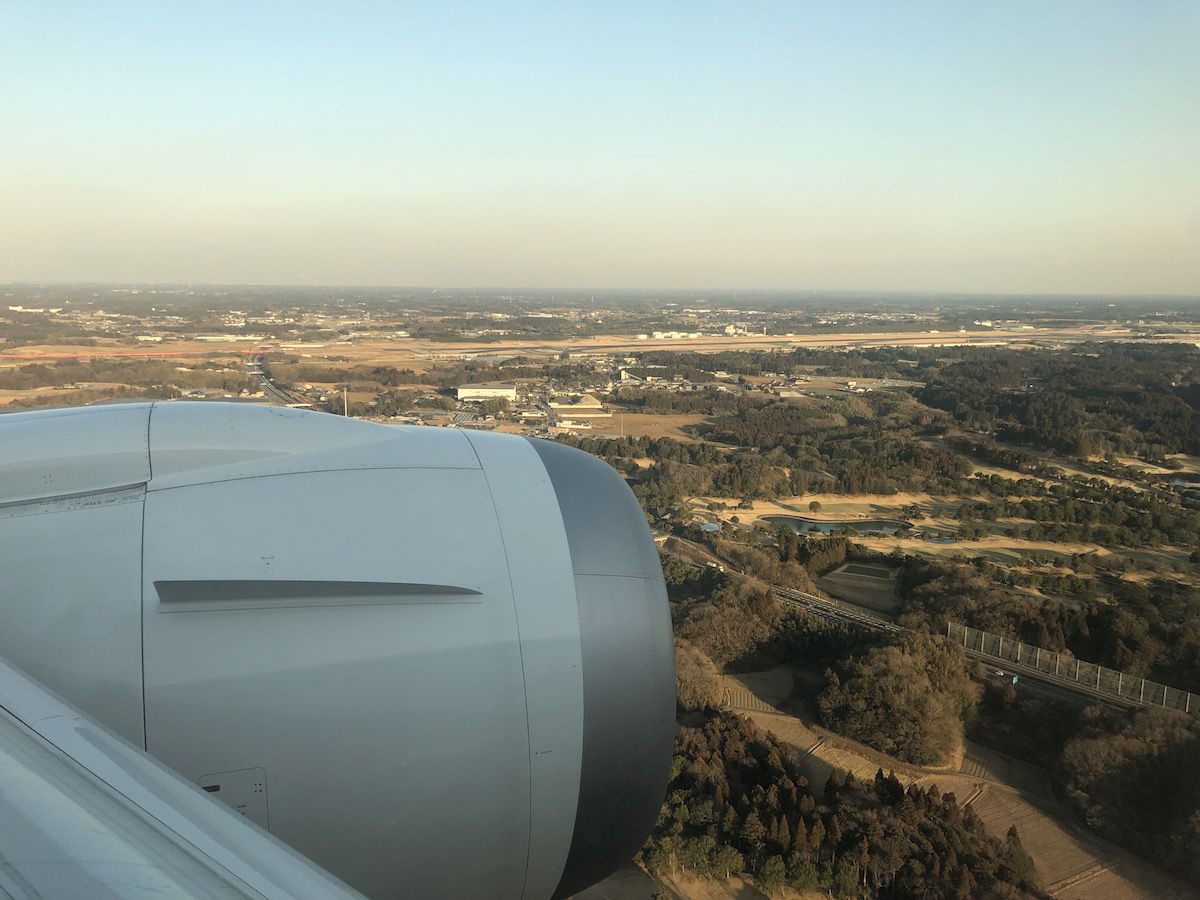
View approaching Narita
It was a beautiful (but cold) evening at Narita Airport, and we ended up touching down at 3:55PM.
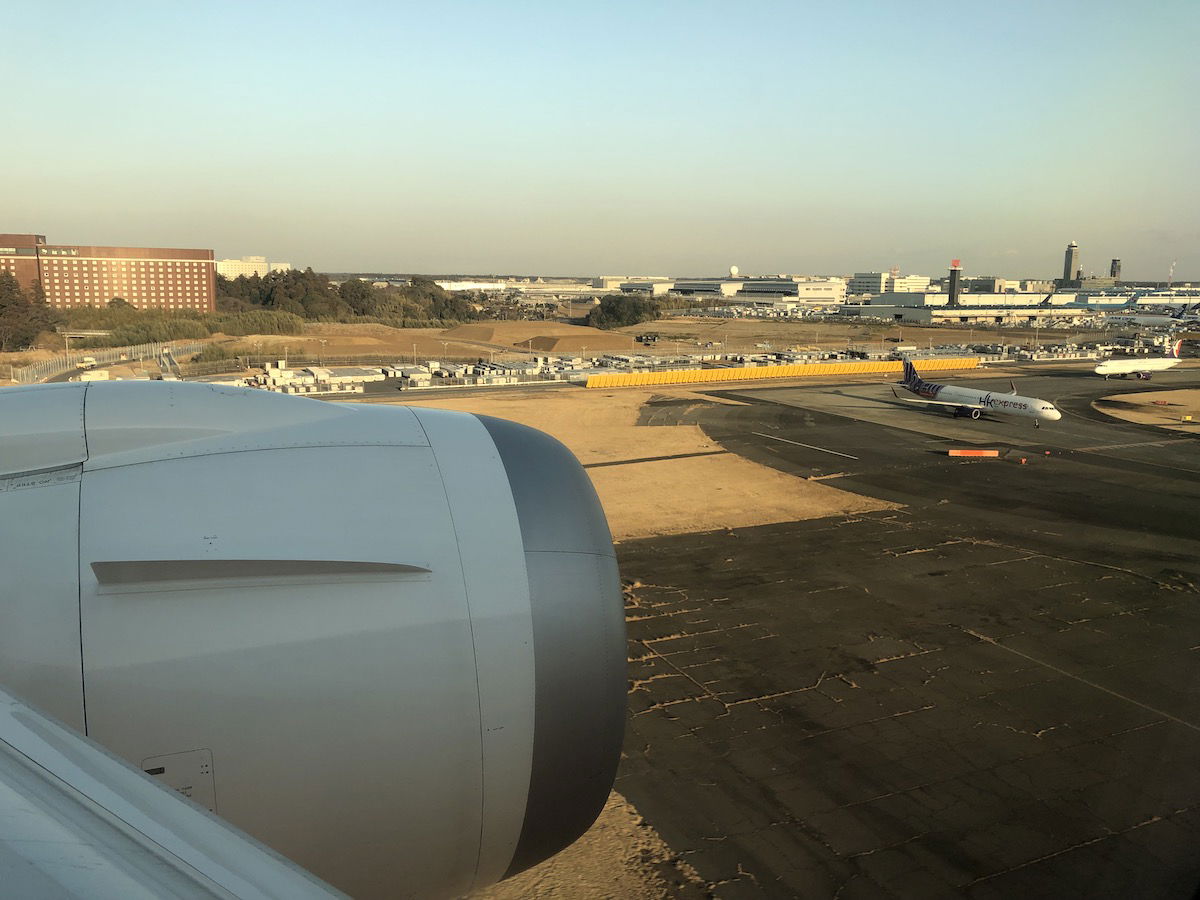
Final approach to Narita
From there we had a 10 minute taxi to our arrival gate, where we parked next to a JAL 767.
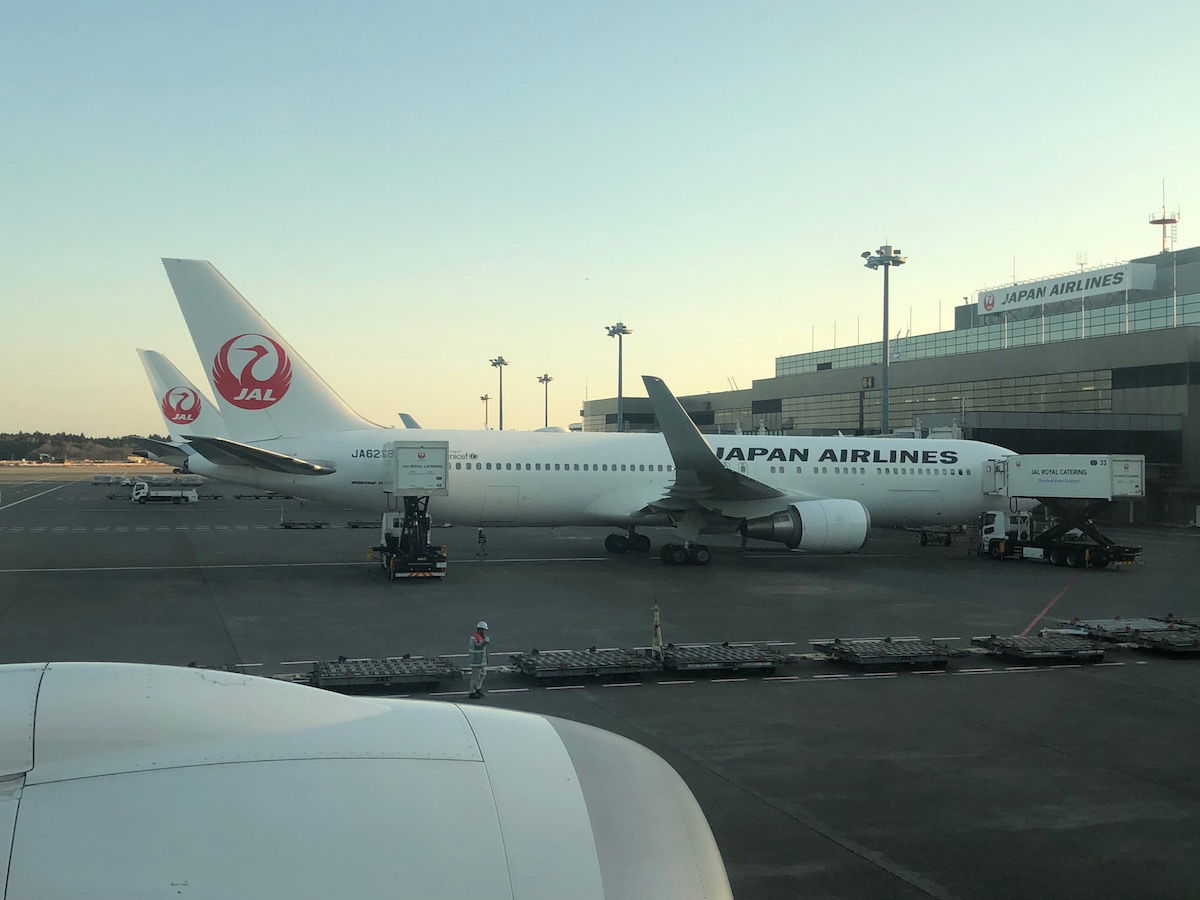 Arrival gate Narita
Arrival gate Narita
We headed towards immigration, and within about 15 minutes were on our way to our hotel for the night.
Japan Airlines 787 business class bottom line
Let’s start with the biggest positives, which is that Japan Airlines has Apex Suites in business class, which are phenomenal seats, and that they offer Wi-Fi with no data caps for under $20, which is among the best Wi-Fi pricing out there.
That’s where the exceptional aspects of the flight end, though. Don’t get me wrong, just about everything else about the flight was good, it just wasn’t exceptional.
Service was generally well intentioned and friendly, but just wasn’t as over-the-top as I’ve otherwise found on Japanese airlines, and simply wasn’t attentive. It would consistently take the crew a really long time to clear stuff, and they weren’t proactive in the least (for example, I always had to ask for drink refills). As far as the food goes, I found the quality to generally be good, but I did find the selection to be fairly limited.
All things considered I’d absolutely recommend JAL for a transpacific flight. Their hard product is exceptional, while their soft product is good.
If you’ve flown JAL business class, what was your experience like?
















Two things make this business class product a no-go for me (and this is the product that flies to my U.S. home, Boston), and I have flown it more than once.
1. The seats have very little storage. The window seats have less than the already meager storage in the aisle seats.
2. The difficulty of getting up when the tray table is open.
I think that the new (current) AA business class has a...
Two things make this business class product a no-go for me (and this is the product that flies to my U.S. home, Boston), and I have flown it more than once.
1. The seats have very little storage. The window seats have less than the already meager storage in the aisle seats.
2. The difficulty of getting up when the tray table is open.
I think that the new (current) AA business class has a much better hard product, and while the food is usually inedible, I take my own.
Better late than never. Over the past 7 months or so I've asked numerous Japanese counterparts about using the term "dry" to describe sake. A few insist sake is never described as "dry," a few have disagreed and will describe sake as such. Interestingly, it doesn't seem to matter how well they speak English. A couple of the most fluent English speaking Japanese men I know insist "dry' is not used to describe sake. On...
Better late than never. Over the past 7 months or so I've asked numerous Japanese counterparts about using the term "dry" to describe sake. A few insist sake is never described as "dry," a few have disagreed and will describe sake as such. Interestingly, it doesn't seem to matter how well they speak English. A couple of the most fluent English speaking Japanese men I know insist "dry' is not used to describe sake. On the other hand, a couple of the least proficient English speakers I know think "dry" can be used to describe sake. As I wrote to A passerby above, I'm always happy to challenge my own assumptions. Take care.
"On this flight the crew just seemed to lack that x-factor that makes flying a Japanese carrier so special. They were friendly and they were well intentioned, but they just weren’t as attentive or infectiously adorable as I often find on Japanese airlines. "
Lucky, i think you were a bit harsh about your flight's crew. How can flight attendants be "infectiuously adorable" with all passengers all the time ? They are not robots with...
"On this flight the crew just seemed to lack that x-factor that makes flying a Japanese carrier so special. They were friendly and they were well intentioned, but they just weren’t as attentive or infectiously adorable as I often find on Japanese airlines. "
Lucky, i think you were a bit harsh about your flight's crew. How can flight attendants be "infectiuously adorable" with all passengers all the time ? They are not robots with artificial intelligence or supposed to behave like actors & actresses on stage.
So they were a bit slow clearing your tables but who is in a hurry on a 13hours'flight,come on.
Does lax to kix in November 2019 use the same seats in biz class? How do I check? Thx
No place to put your phone? What an outrage......................pathetic.
@Lucky-Can you include review on the aisle seats in your next reviews? Almost all travel blogs reviewing JL's Apex suites are talking about the window seats but I haven't found any reviews about the aisle seats yet. I'm not referring to just this review but in your other reviews on other airlines as well, please include reviews on the aisle seats or the types of seats different to yours. By review I mean detailed descriptions...
@Lucky-Can you include review on the aisle seats in your next reviews? Almost all travel blogs reviewing JL's Apex suites are talking about the window seats but I haven't found any reviews about the aisle seats yet. I'm not referring to just this review but in your other reviews on other airlines as well, please include reviews on the aisle seats or the types of seats different to yours. By review I mean detailed descriptions as you did with the window seats (placement of storage spaces, seats, controls etc with photos) and not just whether they are staggered or not.
@A passerby
I wanted to wait to see what your response was to my post above before adding the below, because I had some hints in there that I wanted to see if you picked up on. But it’s tax season, and I have to get some things done, so I’m knocking this out now.
For the benefit of the 3 or 4 other people who might still be reading, @A passerby used...
@A passerby
I wanted to wait to see what your response was to my post above before adding the below, because I had some hints in there that I wanted to see if you picked up on. But it’s tax season, and I have to get some things done, so I’m knocking this out now.
For the benefit of the 3 or 4 other people who might still be reading, @A passerby used Katakanaドライ to write “Dry.” Katakana is one of three Japanese writing systems/scripts. Katakana is the script reserved for foreign words and concepts. Some of you might say at this point, “What? The Japanese don’t have a word for "dry’?” Of course they do: 乾かす 干す. In English, “Kawakasu.” That means, for examples, a person who dries off after a swim, or clothes that dry after being washed. But the Japanese have no native word of “dry” when it comes to describing alcohol. Therefore the Japanese imported the word and concept from abroad. Frankly, there’s no better evidence that “dry” when used to describe alcohol is a foreign concept to the Japanese than the very fact @A passerby used Katakana to write it. @A passerby wrote, I suspect sarcastically, “as if the flavor description of “dry” doesn’t exist in the language.” To point out the obvious: you wrote it in Katakana: the very script reserved for words that don’t exist in the language.
As for the Kanji 辛口 that @A passerby asked me to translate, and that he has seen on Sake “countless times,” I translate that to “Spicy.” Note, not “Dry.” But Kanji in particular and Japanese in general can be tricky, and is by far the most difficult language I've studied. As this chat indicates, things are not so easy when working with Japanese.
There are numerous Japanese, as @A passerby noted, who have become familiar with the Western concept of “dry” alcohol. But in my opinion, the concept is not broad enough in Japan yet to expect every single Japanese person to understand it. Having wrote that, I’d expect a FA on an International flight to be one of those Japanese that understands some foreigners use the word “dry” to describe Sake (and other alcohol.) But she didn’t. Not the end of the world. As @A Passerby noted, the FA was not familiar enough with English to understand. Language barrier, it happens. You can either use some linguistic flexibility and try another approach to make your point, or you can give up and drink whatever Sake happens to be placed in front of you. Either is a great option.
@A passerby, I always appreciate the opportunity to challenge my own assumptions. Now that I think about it, I drink whatever Sake is put in front of me at whatever Izakaya I happen to be in. I don’t recall my counterparts and I ever discussing the concept of “dry” Sake, but I’ll bring the topic up the next time I’m out. When it comes to Sake, we almost always refer to which prefecture it originates from, as we think that's a better indicator of quality. Akita and Niigata have the best rice in Japan, hence I think they have the best Sake in Japan. And while I’m at it, my wife will call her brother later this afternoon…he’s lived in Japan for 59, 60 years (I can’t remember how old he is). He’s had more than his fair share of exposure to Sake (it’s just before 0900 on Sunday here in Japan, so we are letting him sleep in before calling after a late Saturday night he undoubtedly spent drinking Sake), and he’s had enough exposure to the West and speaks enough English to understand our concepts, so this will be an interesting topic about which to get his opinion. If more Japanese use "dry" with Sake than I expected, I’ll be happy to admit it.
@Lucky, sorry again. That post was a dick move on my part.
@ A passerby
I never claimed to be a Sake expert, but like I said, I've lived here 16+ years. I've drank with various Japanese counterparts, dozens of them if not more, on hundreds of different occasions, and have never heard any of them verbally describe Sake as dry.
Spicy, Dry. That's how I would translate those words, respectively.
And who knows why the FA didn't understand what Lucky was talking about? You're guess seems reasonable.
Take care.
@Ash
Since you're Mr. Japanese expert. I'm curious how you and your numerous Japanese counterparts would translate 辛口 orドライ? Same question for the soon-to-be somellier above. I've only spent a paltry 2 years there but I've seen 辛口 sake countless times and have never seen confusion when talking about it as if the flavor description of "dry" doesn't exist in the language.
Perhaps the FA wasn't familiar enough with English and Western Accents to...
@Ash
Since you're Mr. Japanese expert. I'm curious how you and your numerous Japanese counterparts would translate 辛口 orドライ? Same question for the soon-to-be somellier above. I've only spent a paltry 2 years there but I've seen 辛口 sake countless times and have never seen confusion when talking about it as if the flavor description of "dry" doesn't exist in the language.
Perhaps the FA wasn't familiar enough with English and Western Accents to understand the transition of ドライ->dry and then modifying to "driest"?
Cheers.
I'm sorry Lucky. And yes, you did a fantastic job articulating yourself.
I've seen many of my US based colleagues come through Japan over the years and are totally unable to adapt their English to the English (barely) spoken by some Japanese. These colleagues are all monolingual, and it shows. My frustration with my colleagues caused me to jump to conclusions about you.
As for the sake argument, no reason to beat a dead horse. Safe travels.
I agree with Ed, above. I'm no Sake expert, but have lived in Japan for 13+ of the past 21 years or so, and have drank my share of Sake with many of my Japanese counterparts. I've never heard the word "dry" used in association with Sake. I can imagine the confusion on the poor FA's face as she tried to figure out what the hell this passenger was asking. Lucky, based on your writing,...
I agree with Ed, above. I'm no Sake expert, but have lived in Japan for 13+ of the past 21 years or so, and have drank my share of Sake with many of my Japanese counterparts. I've never heard the word "dry" used in association with Sake. I can imagine the confusion on the poor FA's face as she tried to figure out what the hell this passenger was asking. Lucky, based on your writing, I'm under the impression you are monolingual. Studies show that monolingual people are less able to express themselves, i.e., lack articulation, compared to multilingual people.
By the way Ed, please post the name of the Sake brewery near Narita that you mentioned.
@ Ash -- I'm actually bilingual (German is my first language), but I appreciate your not-so-veiled insult (hopefully I'm articulating myself well enough for your liking).
As far as dry sake goes, you're absolutely right that I'm no sake expert. However, I do enjoy sake, and have long requested dry sake, and that has never been met with confusion. A few websites that talk about it:
http://www.sakeexpert.com/saketaste.php
https://kurand.jp/en/4783/
Or maybe the person writing...
@ Ash -- I'm actually bilingual (German is my first language), but I appreciate your not-so-veiled insult (hopefully I'm articulating myself well enough for your liking).
As far as dry sake goes, you're absolutely right that I'm no sake expert. However, I do enjoy sake, and have long requested dry sake, and that has never been met with confusion. A few websites that talk about it:
http://www.sakeexpert.com/saketaste.php
https://kurand.jp/en/4783/
Or maybe the person writing sakeexpert.com is just monolingual?
Bump in case anyone has an opinion on this:
@Lucky and others,
I am flying to Tokyo this summer. I have booked Delta business on the retro-fitted 777 with the Suites through Virgin for 60,000 miles MSP-HND. If I get the option for JAL F on the 777 I am going to book that with AA miles. If J opens up on JAL, would you or others cancel the delta flights for JAL business for 70K miles or keep the Delta suites if JAL F doesn’t open up?
I was in Japan 2 months ago. It might be 5c outside, but hotel room temperature is always set at 25c! And they have some very warm duvets...how the Japanese sleep like that I have no idea. So yeah, pretty much a cultural thing.
@mike. Outside air temperature at 35000 ft is probably - 40 deg so aircon is not needed. Cabin feed air must be warmed but too often overheated.
Thanks for the review. How was JAL's special coffee?
The table swivels so you can get up during meal service. I just got off HND -> SFO on J and I found the apex suites to be incredibly nice and comfortable. The window seat is the best product for someone flying solo. The lack of storage is a down fall for sure tho. The service and the food (japanese meal) were incredible and very attentive.
"due to the lack of air nozzles"
Give it a rest. Tiring of the persistent whining about it.
When the nozzles exist, it is just blowing cabin air at you. It is not cooler air.
You want some air blowing on you? Bring a battery or USB powered mini-fan with you since it is such a big deal to you.
Funny how you never mention that you asked the cabin crew to turn down the temperature.
If you have a window seat, there is storage at the top of the seat behind your head!
If travelling with a child (7 yo) would you still opt for the side seats or would the centre paid be better?
They will turn down the temp if you ask.
I fly this route on a monthly basis. The FAs are happy to cool down the cabin if asked.
I was upgraded about two weeks ago from Premium Economy to Business class on the 787-9 from Sydney to Narita. So I enjoyed seeing the detailed review here of a comparable product.
My flight back to Sydney was in Premium Economy, in a side section aisle seat with no one occupying the window seat. I had flown the 787-9 in Premium Economy between Sydney and Tokyo and return.
In the interim I have...
I was upgraded about two weeks ago from Premium Economy to Business class on the 787-9 from Sydney to Narita. So I enjoyed seeing the detailed review here of a comparable product.
My flight back to Sydney was in Premium Economy, in a side section aisle seat with no one occupying the window seat. I had flown the 787-9 in Premium Economy between Sydney and Tokyo and return.
In the interim I have flown Japan Air multiple times between Vancouver, SFO, and SAN and NRT on outgoing or return segment on the 787-8 in business and the 777 in First class.
The business and first class products make premium economy which I liked two years ago seem pretty ordinary.
@Mike - I find it's cultural. North American carriers tend to keep temperatures cooler, think 19-22c, whereas Japanese/Korean carriers are usually 25c+ (I think KE standard is something like 27c!).
The funny thing is you'll usually see the Japanese or Koreans wearing the cardigans and bundled up in blankets even in the stifling cabins!
Absolutely love JAL J. Flown it more than anyone else over recent years.
I’m on my way to becoming a Sake somellier, next exams next month. Whilst dry is a word we’d use with wine in the west it does not necessarily work in the Japanese lexicon and is not really positive. Clean taste might be a better word to use, although still not the right word if you want someone crisp and dry...
Absolutely love JAL J. Flown it more than anyone else over recent years.
I’m on my way to becoming a Sake somellier, next exams next month. Whilst dry is a word we’d use with wine in the west it does not necessarily work in the Japanese lexicon and is not really positive. Clean taste might be a better word to use, although still not the right word if you want someone crisp and dry like a pinot Grigio from the Veneto. I’d also say that that kind of dry tastes is a lot less popular than flowery, fruity or estery flavours you often find. Next time you are in Tokyo (or San Francisco, Sydney or Melbourne for that matter) you could have a lot of fun doing a Sake tasting or even a class, or visit a brewery. I know a great one not far from Narita which you could visit on a long layover.
I am surprised by the final analysis as I have flown JAL in business class and I could not look up as FA's were running over to me every time wondering if I needed anything else. Seats, service and food were wonderful.
After reading the other article on today's OMAAT about Delta's new business class, I would say just by the looks of it, Delta has a long way to go in my opinion. I...
I am surprised by the final analysis as I have flown JAL in business class and I could not look up as FA's were running over to me every time wondering if I needed anything else. Seats, service and food were wonderful.
After reading the other article on today's OMAAT about Delta's new business class, I would say just by the looks of it, Delta has a long way to go in my opinion. I will be flying Delta to BCN on business class this year so I will know at that time. But no US based airline can match Asian airlines service from FA's in business class.
I took this flight (the other direction) also in seat 8A! I agree, it looked to be the best business class seat out of all of them.
@ Too Nashty — I do the same, and while occasionally I'm given a surprising look, it's reasonable to expect a comfortable environment in a premium cabin.
Pajamas, cardigans, socks, comforters, blankets.... How about the overlooked absoulte RIGHT to have ventilation?
—JRL
So i’ve gotta ask. Why don’t you just tell them to turn the temperature down in the cabin? I always have this problem on JAL and they comply (although ANA turns it down more, which makes a me slightly prefer them even if product is not as good). Am i being rude by doing so?
The wi fi works only on one device or can i be split like on the ipad and when log out on ipad can be used on Iphone?
Can anyone explain why Asian airlines keep airline cabins warm? Do they not know it makes (most) people physically uncomfortable (and dehydrated)? I live in Asia— It’s certainly NOT "cultural" to sweat through a f*cking cardigan!
Aside from that, in my experience JAL business class is just OKAY (in its weight class), while First is phenomenal.
—JRL
How come on these reviews you don't put how they were booked anymore? Did you pay full price? Booked with miles? Sponsored trip?
I think that part of these blogs is very important for people trying to maximize their points' value and strategy.
@ ryan -- Ben always lists the costs for the trip in the introduction post: https://onemileatatime.com/sri-lanka-trip-report/
@Lucky and others,
I am flying to Tokyo this summer. I have booked Delta business on the retro-fitted 777 with the Suites through Virgin for 60,000 miles MSP-HND. If I get the option for JAL F on the 777 I am going to book that with AA miles. If J opens up on JAL, would you or others cancel the delta flights for JAL business for 70K miles or keep the Delta suites if JAL F doesn’t open up?
The warm cabin issue seems to be a constant problem with various airlines. To me the cabin temperature is as important as the food. A warm cabin makes for a lousy flight.
Is it a fuel issue in that running the A/C packs burn more fuel, or is it because there are no longer blankets in economy and the crew does not want to respond to the complaints from econ passengers?
The Apex suite is my favorite business class amongst those I've tried (not a huge list and no ME3).
For those looking, if you take an aisle seat you get a great storage area that takes up the space behind the offset window seat.
I flew JAL in business from Narita to Bangkok on a 787. I thought the seats seemed pretty narrow but then again I had come off a Singapore business class flight a week prior which may have messed with my perception. Service was great but I gotta say their IFE was not super intuitive and quite frustrating to use. The selection of entertainment was good though.
I took this flight a week after it started up. The food was great, the Japanese option was a 3x3 grid of 9 different little bites. Do get the window seat though, even if flying with someone.
@Alex. We opted for the two aisle seats on the 77W and it worked great for us and though I was nervous the seats would not be great based on Ben’s reviews, we loved them and they were super seats.
It almost always comes down to the crew. We flew JFK to Narita in J for the first time a couple of months ago and found the crew to be exceptional and the service to be on par with our experience in their F product. So much so, I felt that we did not need to make an effort to find F award space if J was always this fantastic. From the sound of your review, not all J flights on JAL are created equal! We both also loved the Apex Suite!
This product is great in the window seat as you say, for a single. I think it is terrible if you get an aisle seat or if you are traveling with a companion, as I just did. Especially on the 777, there is no good option for two people. We ended up taking a window and an aisle, but it was super awkward. First of all, you can hardly see the other person. Plus someone...
This product is great in the window seat as you say, for a single. I think it is terrible if you get an aisle seat or if you are traveling with a companion, as I just did. Especially on the 777, there is no good option for two people. We ended up taking a window and an aisle, but it was super awkward. First of all, you can hardly see the other person. Plus someone was sitting on the other side of the aisle, and I felt like she was traveling with us since I could see her so easily, but no one else. She was talking to my wife and having a much easier time seeing her than I did.
For couples on the 777 I'd probably recommend the two sides of the aisle more than anything. The 787 the two center aren't bad, and they stagger better than on the 777 for more privacy.
Lucky, when did JAL open up the window seats for assignment? I have a future JAL flight in business and all the APEX window seats are blocked.
How good was the coffee?
I’m not as keen as the Apex Suite as you are. I actually prefer a bulkhead on a seat like United’s new Polaris seat. Every bit as spacious and the footwell is huge and does not feel restricted at all. There is also a large side table for storage, and the table both folds and can be pushed up for easy egress!
I think two hours is very reasonable for a full day flight service on a long haul flight.
To be honest I think anything less would be a little rushed. A shorter night flight of course i'd like things wrapped up quickly.
Love love LOVE JAL.
I'm surprised to read they offered PTO drinks. They generally don't offer them in J (even when there is plenty of spare time on the ground) so interesting to see they were offered.
I've not flown then for about a year or so, is this a new thing?
Gentle prod: the reason that we see feet squeezed into small footwells these days is because people like Lucky have praised those configurations to the high heavens for half a decade. And carriers (mistakenly) believe that's what we all want.
You asked for those configurations, Lucky. Sorry, but that's the truth.
As someone who loves Japanese food, I was drooling over the menu. Loved it.
I find the japanese options on Japanese airlines good even in economy class. I usually won't eat economy class food, but ANA and JAL are the only airlines where I will.
@Ben
When the cabin is too warm do you ask the crew to turn the temperature down? If so, do they usually honor that request?
I flew Japan Airlines to Singapore last year. LAX to Natita in first and Narita to Singapore in business. I found hunting an award with business on the second leg to be challenging and ultimately unnecessary. This is because the Singapore flight arrives at midnight so I was trying not to sleep and JAL has the best room in economy out there anyway. The first class is amazing though.
Having flown in JAL first dozens of times (always paid ticket), the experience has always been stellar. Flew in biz a couple of times and the service was very good. It's impressive how Japanese value customers as if they were royalty.